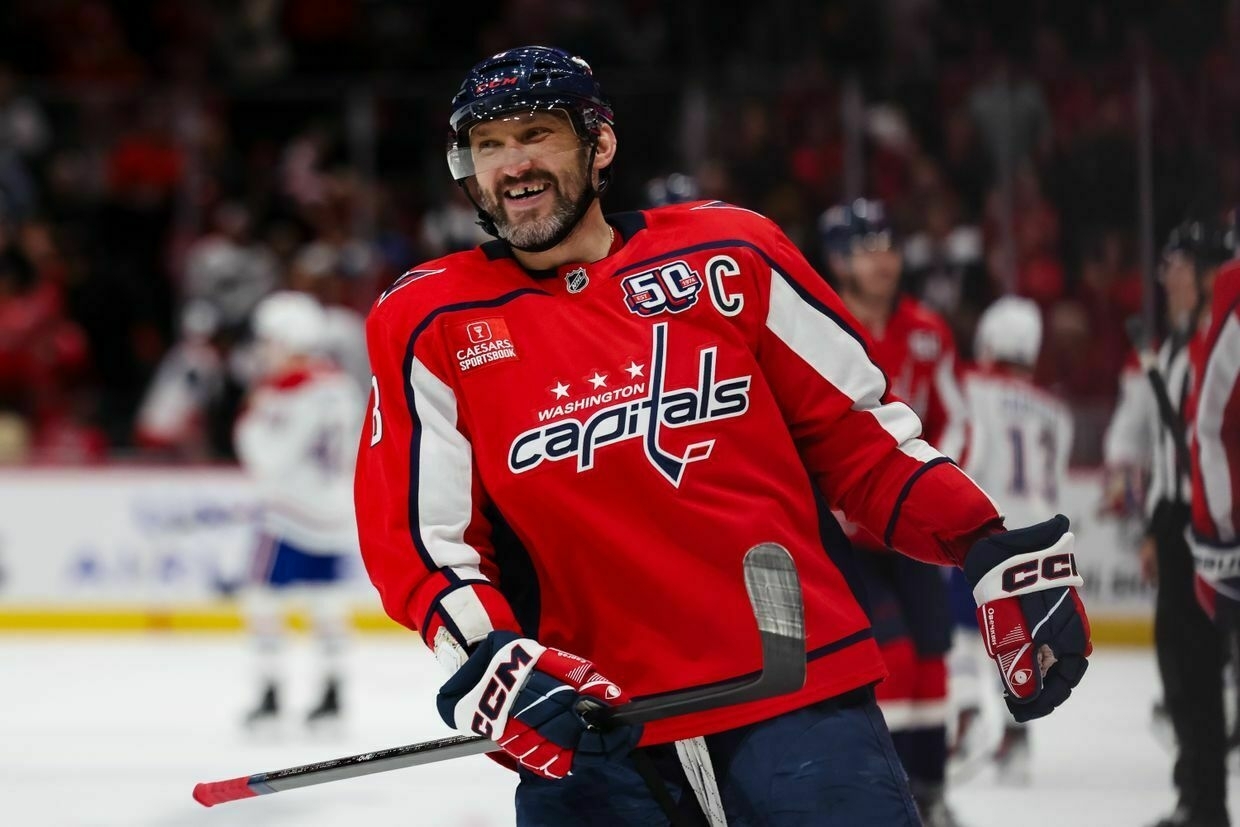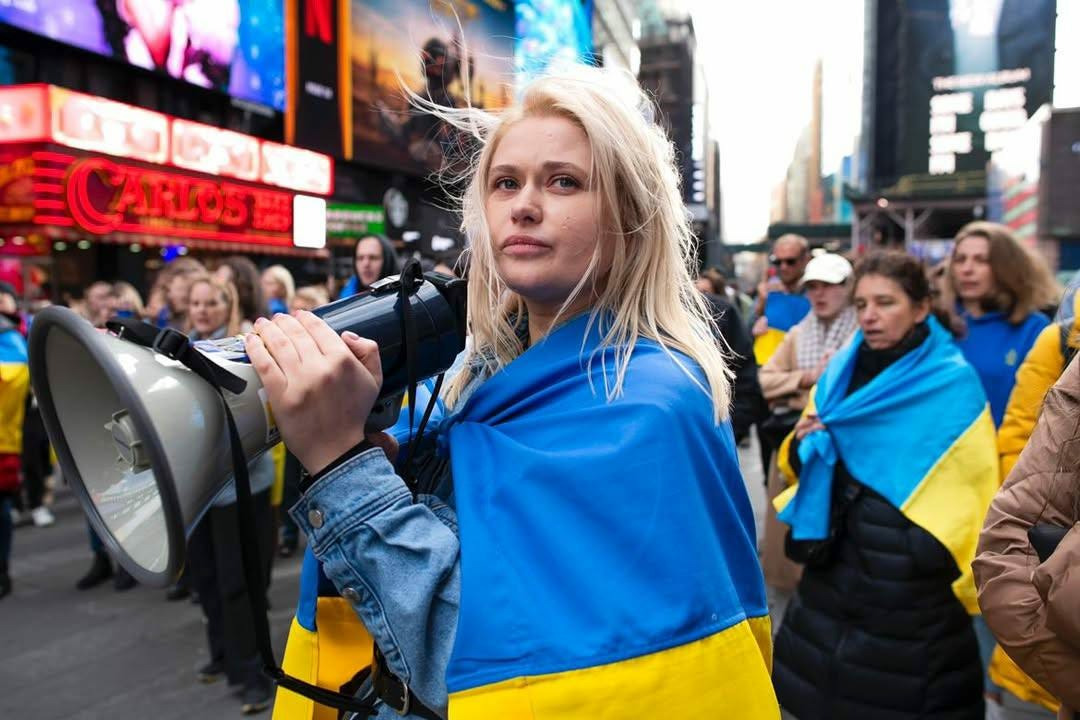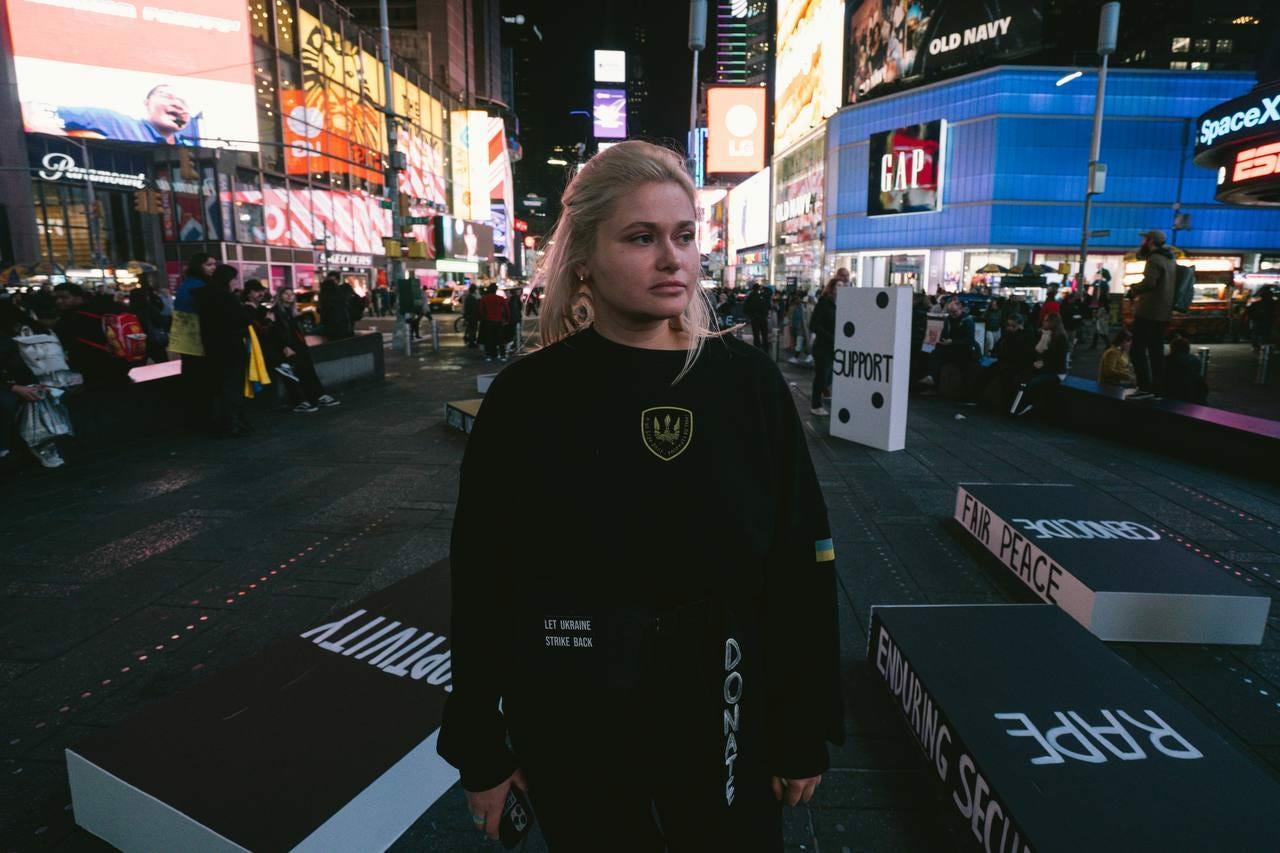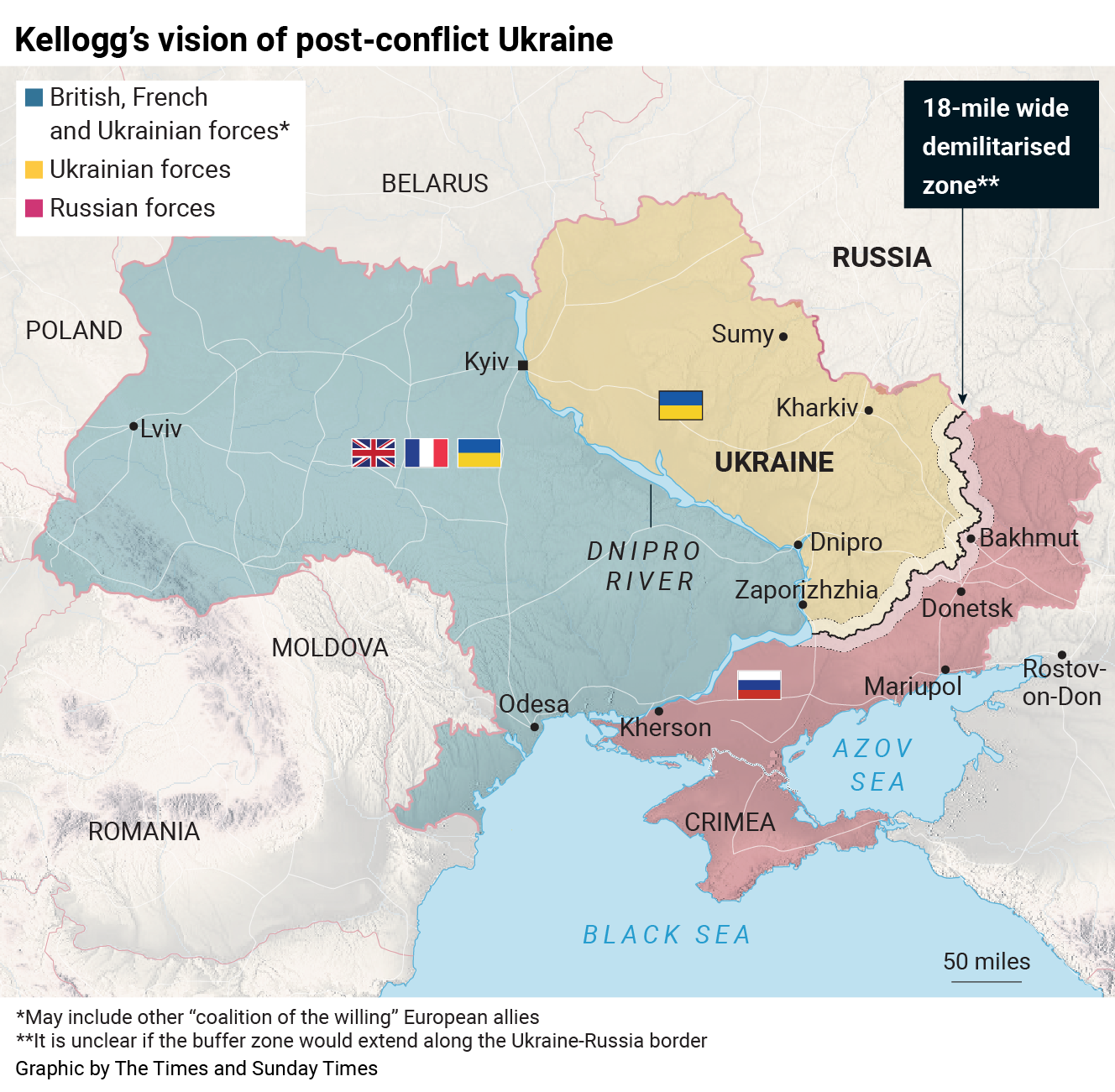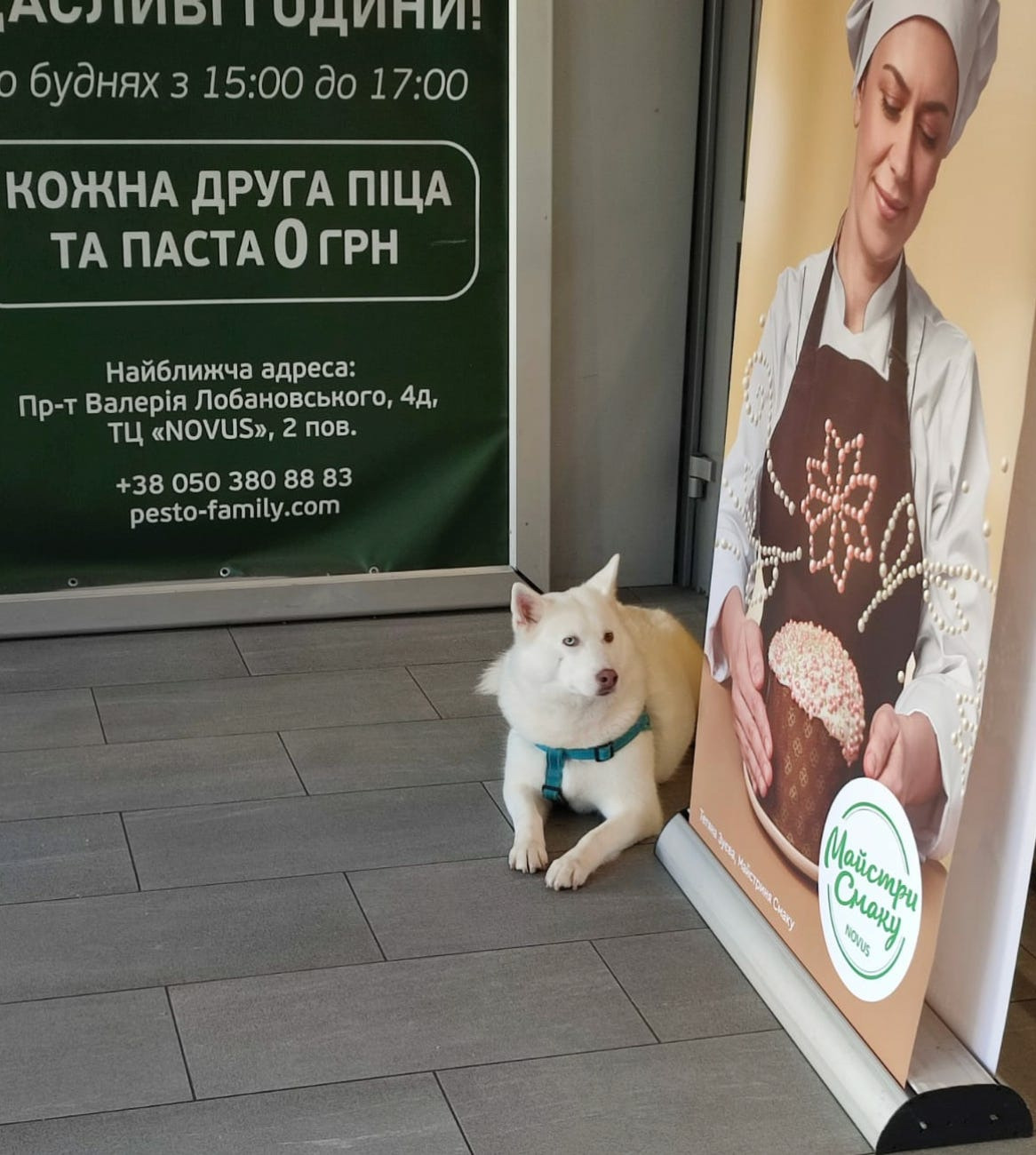-
US offers sympathy to Ukraine after deadly Sumy attack — but no mention of pressure on Russia
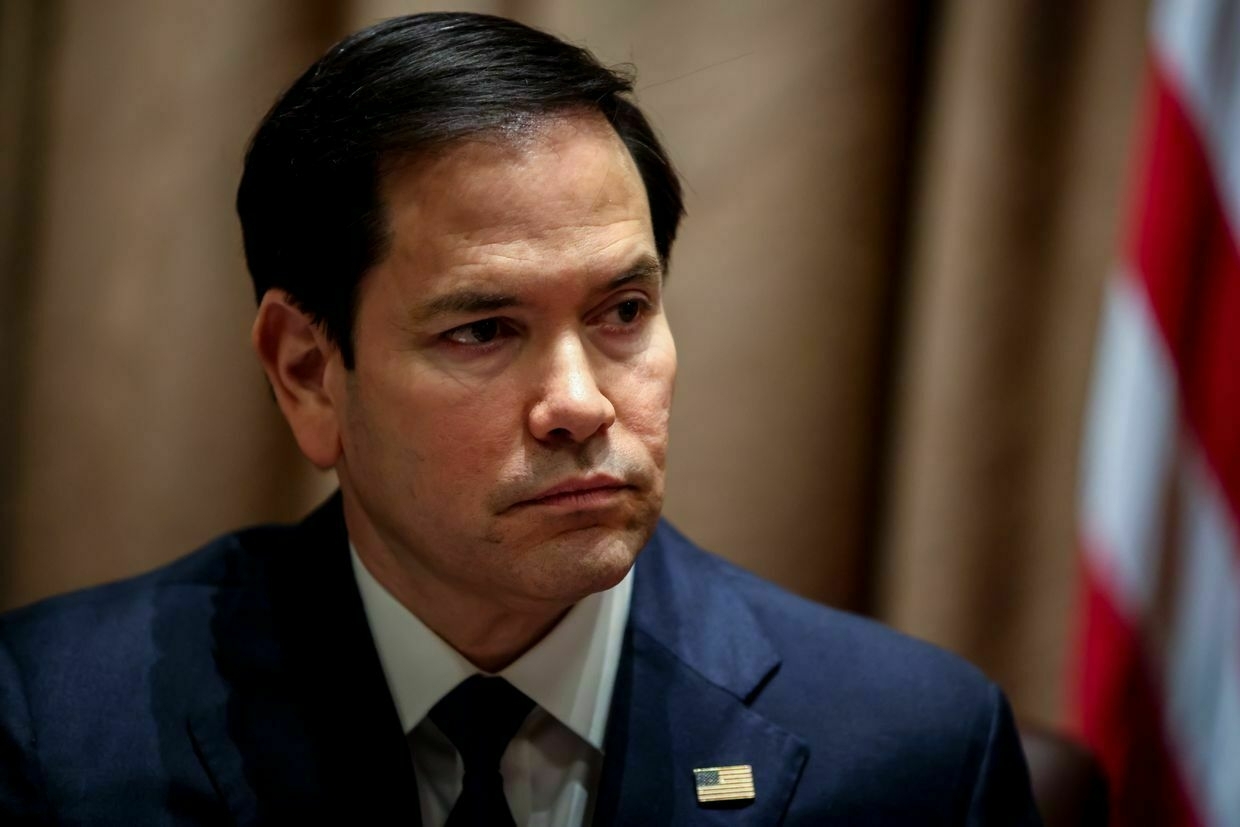
U.S. officials responded to Russia’s deadly Palm Sunday attack on Sumy with condolences for Ukraine, but no calls for increased pressure on Moscow.
Russia targeted Ukraine’s northeastern city of Sumy with ballistic missiles the morning of April 13, as many civilians gathered for religious observances on Palm Sunday. The attack killed at least 34 people and injured 117, including children.
“The United States extends our deepest condolences to the victims of today’s horrifying Russian missile attack on Sumy,” U.S. Secretary of State Marco Rubio wrote on X.
“This is a tragic reminder of why President Trump and his administration are putting so much time and effort into trying to end this war and achieve durable peace."
Rubio’s statement echoed earlier remarks by Special Envoy Keith Kellogg, who also said the attack demonstrated the importance of U.S. President Donald Trump’s peace efforts. Kellogg went a step further than Rubio by denouncing Russia’s attack on civilians, saying it “crosses any line of decency.”
“There are scores of civilian dead and wounded. As a former military leader, I understand targeting and this is wrong,” he said.
Like Rubio, Kellogg did not explicitly call for increased pressure or sanctions on Moscow.
The omission is notable compared to responses from European leaders, who condemned the attack as a war crime and demanded intensified pressure on Russia to accept an unconditional ceasefire.
“Russia shows that it has no respect for international law or humanitarian law,” Finnish President Alexander Stubb wrote on X.
“We must end this war. An unconditional ceasefire must begin at once. To make it commit seriously to negotiations, sanctions against Russia need to be further strengthened.”
U.K. Prime Minister Keir Starmer also said he was “appalled at Russia’s horrific attacks” and called for Russia to accept a full ceasefire.
“President Zelenskyy has shown his commitment to peace. Putin must now agree to a full and immediate ceasefire without conditions,” he said.
The European response widely acknowledged that Ukraine has already agreed to accept Washington’s proposal for a complete ceasefire of 30 days, while Russia continues to refuse the terms.
A day before the attack on Sumy, Trump said negotiations between Russia and Ukraine were “going fine.” His comments came a day after Special Envoy Steve Witkoff met with Russian President Vladimir Putin in St. Petersburg on April 11 to discuss “aspects of the Ukrainian settlement."
While Trump has expressed some public frustration with the Kremlin’s stalling, he has not followed through on threats to impose new punitive tariffs and sanctions on Russia.
‘Everything was black’ — Russia strikes downtown Sumy filled with people on Palm Sunday, killing dozensThe burnt shell of a red bus lied in the center of Sumy after Russia launched two ballistic missiles hurtled at city on April 13 — not one passenger survived, Anna Shpurik, a journalist at local media Cukr told the Kyiv Independent following the attack. They are just some of theThe Kyiv IndependentDominic Culverwell
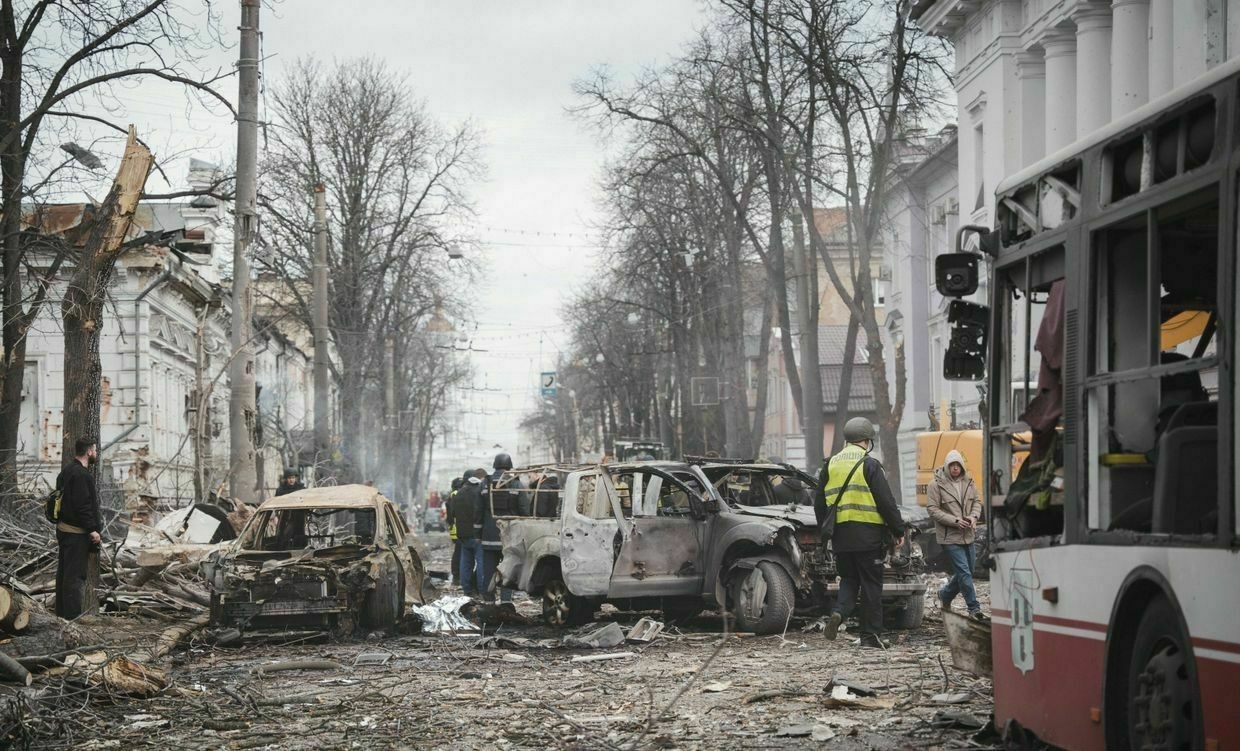
-
Ukraine war latest: Russian strike kills at least 34, injures 117 in Sumy on Palm Sunday
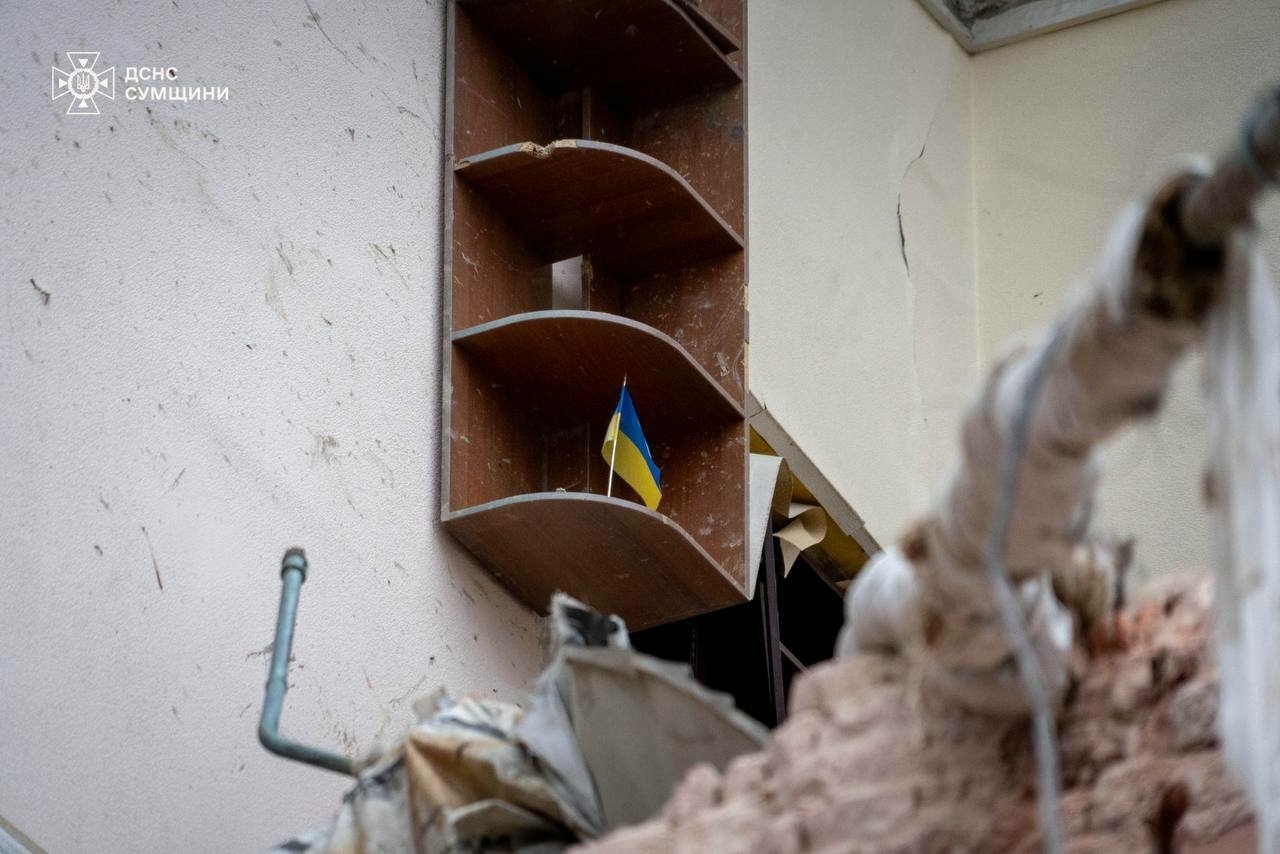
Key developments on April 12-13:
- Russian strike kills at least 34, injures 117 in Sumy on Palm Sunday
- ‘There’s a point at which you have to either put up or shut up’ — Trump says on Russia-Ukraine talks
- Chinese military officers have been present behind Russian lines with Beijing’s approval, Reuters reports
- Russians preparing for assault in Kharkiv Oblast, Ukrainian military warns
- Domestic missile production increases eightfold in 2024
A Russian ballistic missile strike killed dozens of people in the northeastern Ukrainian city of Sumy on the morning of Palm Sunday, Sumy Mayor Artem Kobzar reported on April 13.
At the time of publication, 34 people were killed in the attack, including two children, and at least 117 were injured, including 15 children, Ukraine’s State Emergency Service reported.
Ukraine’s Air Force warned of a ballistic missile threat in Sumy Oblast at 10:17 am. By 10:52 am, Kobzar announced that the city had been hit with “many dead” as a result of a missile strike.
“Enemy missiles hit an ordinary city street, ordinary life: houses, educational institutions, cars on the street… And this is on a day when people go to church: Palm Sunday,” President Volodymyr Zelensky wrote on his Telegram channel after the attack.
“Without pressure on the aggressor, peace is impossible. Talks have never stopped ballistic missiles and air bombs. We need the kind of attitude towards Russia that a terrorist deserves,” he added.
Videos circulating on social media after the attack show bodies strewn across the street, and several vehicles, including a bus, having suffered heavy damage from the attack, with one car engulfed in flames.
Palm Sunday is celebrated by Christians on the Sunday before Easter. Many people in Ukraine attend church on the holiday.
The attack comes as Washington attempts to orchestrate a ceasefire between Russia and Ukraine. Kyiv agreed to a full 30-day ceasefire a month ago, but Moscow has so far refused and has continued to launch attacks on Ukraine’s civilian centers.
‘Everything was black’ — Russia’s Palm Sunday attack on Sumy kills over 30, injures 117 amid ceasefire talksThe burnt shell of a red bus lied in the center of Sumy after Russia launched two ballistic missiles hurtled at city on April 13 — not one passenger survived, Anna Shpurik, a journalist at local media Cukr told the Kyiv Independent following the attack. They are just some of theThe Kyiv IndependentDominic Culverwell
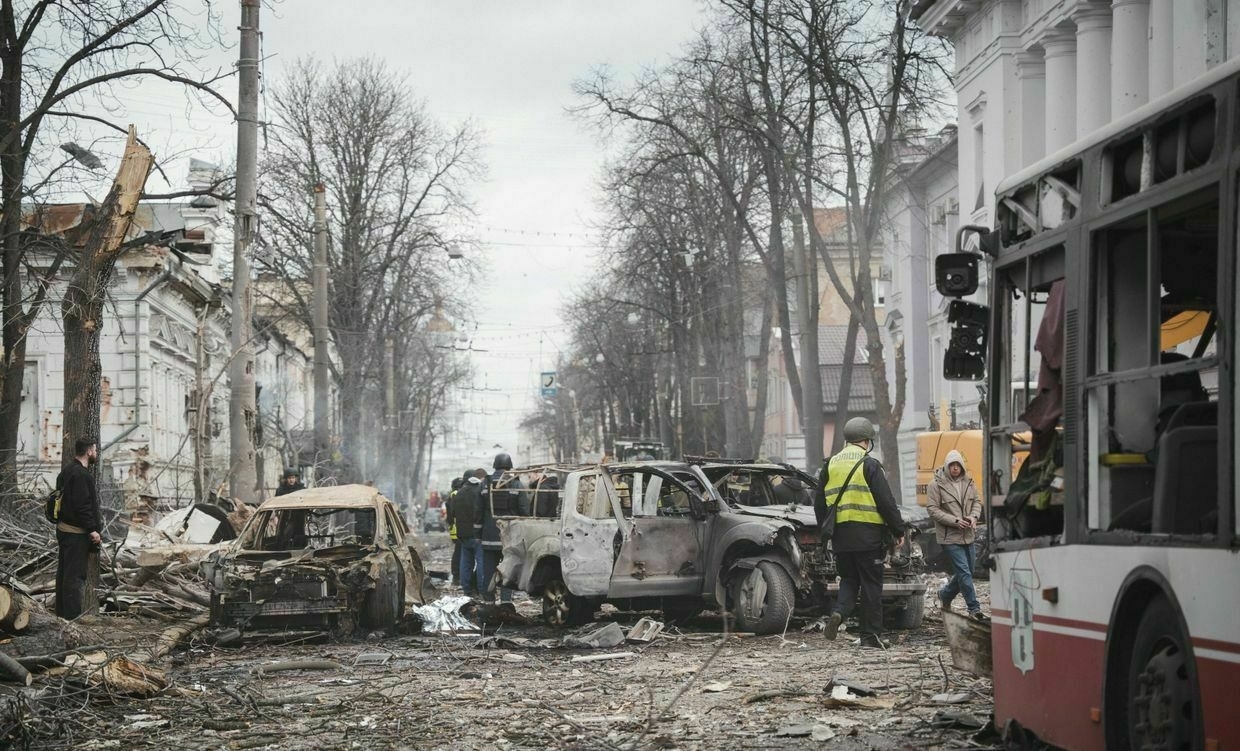
‘There’s a point at which you have to either put up or shut up’ — Trump says on Russia-Ukraine talksU.S. President Donald Trump said on April 12 that negotiations for a ceasefire between Russia and Ukraine were “going fine," but emphasized that a resolution must come soon.
Speaking to reporters aboard Air Force One, Trump added that “there’s a point at which you have to either put up or shut up. We’ll see what happens, but I think it’s going fine."
Trump’s comments followed a high-level meeting in Russia, where his envoy Steve Witkoff met with Russian President Vladimir Putin on April 11. The visit was part of ongoing efforts by the Trump administration to broker a ceasefire between the two countries.
“I think Ukraine-Russia (talks) might be going OK. And you’re going to be finding out pretty soon,” Trump said.
One month ago, Ukraine agreed to a full 30-day ceasefire in the U.S.-mediated talks in Jeddah. In the meantime, Russia has not only refused a full ceasefire, but has also continued to barrage Ukrainian cities with attacks and repeatedly violated the partial truce established in mid-March.
Some critics say Moscow is stalling and has no real interest in halting the fighting, especially as it continues advancing on the battlefield. The Kremlin has not publicly committed to the terms agreed to by Ukraine.
While Trump has at times criticized Zelensky and Ukrainian leadership, he has also recently expressed frustration with Russia.
In a social media post on April 11, Trump said Russia “has to get moving."
“Too many people are dying thousands a week, in a terrible and senseless war – A war that should have never happened, and wouldn’t have happened, if I were President!!!"
On April 10, Trump extended the national emergency and the associated sanctions against the Russian government for another year, according to a document from the U.S. Federal Register.
‘A war crime’ — European leaders react to Russia’s Palm Sunday attack on Sumy that killed dozensRussia launched two ballistic missiles at the city in northeastern Ukraine on the morning of Palm Sunday, when many citizens were celebrating the religious holiday.The Kyiv IndependentThe Kyiv Independent news desk
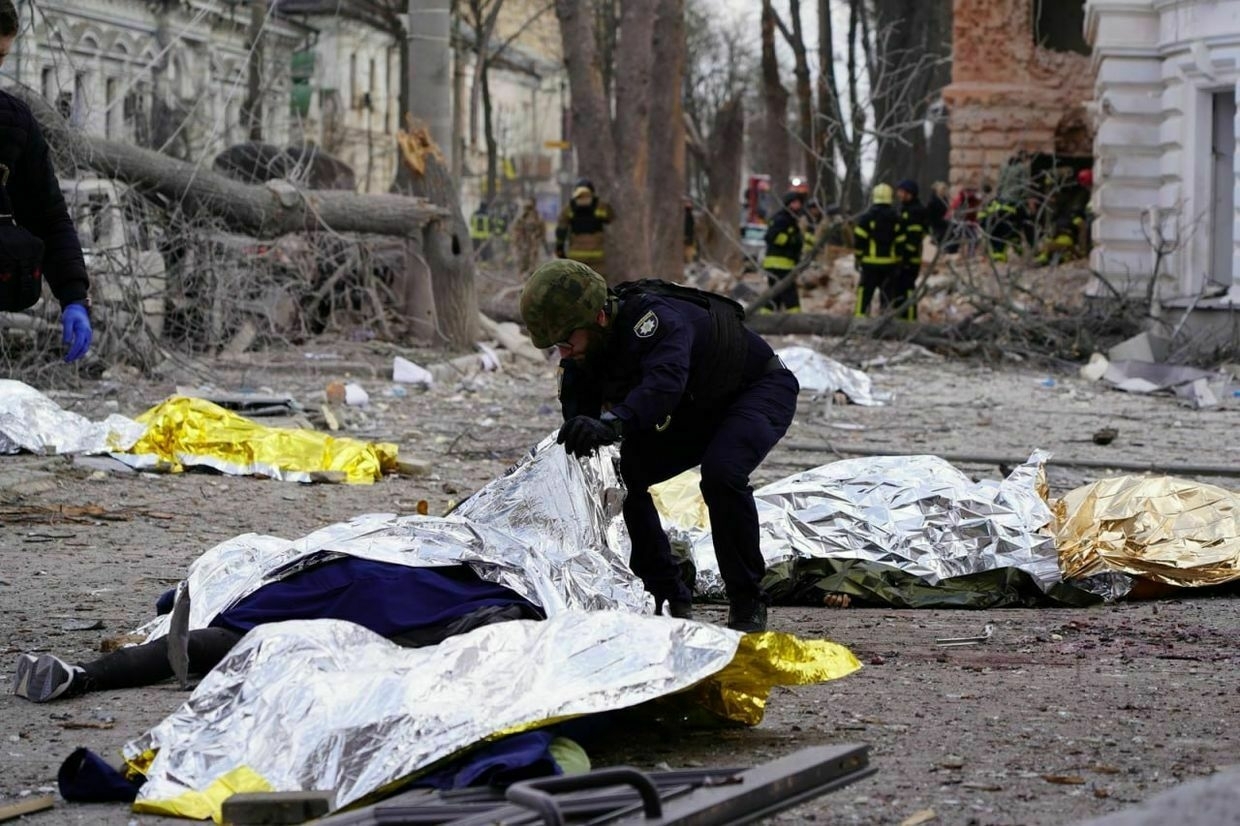
Reuters: Chinese military officers have been present behind Russian lines with Beijing’s approvalMore than 100 Chinese nationals fighting alongside Russian forces in Ukraine are acting as mercenaries and do not appear to have direct ties to Beijing, according to two U.S. officials familiar with intelligence reports and a former Western intelligence official, Reuters reported on April 11.
The U.S. officials, speaking anonymously, described the fighters as poorly trained and having little impact on the battlefield. They do not believe the Chinese government has officially deployed them.
However, the former intelligence official told Reuters that Chinese military officers have been present behind Russian lines with Beijing’s approval to observe and draw tactical lessons from the war.
On April 11, President Volodymyr Zelensky said that at least “several hundred” Chinese citizens are fighting on Russia’s side in Ukraine. Two Chinese fighters were captured by Ukrainian forces in Donetsk Oblast.
One captured soldier reportedly paid 300,000 rubles (roughly $3,500) to a middleman in China in exchange for the promise of Russian citizenship, according to Ukrainian military sources cited by Ukrainian Pravda.
Beijing has denied direct involvement in the war and says it has urged its citizens to avoid armed conflicts.
Although China claims neutrality, it remains Russia’s leading supplier of dual-use components vital for weapons production and a key economic ally. Russia has also recruited foreign fighters from countries including India, Nepal, and Syria. Additionally, some 12,000 North Korean troops have reportedly been deployed by Pyongyang to assist Russia in defending its territory in Kursk Oblast.
‘Don’t come, there’s nothing good here’ — Chinese soldiers warn against following Russian propaganda to fight in UkraineThe Ukrainian military recently captured two Chinese soldiers fighting for Russia. Kyiv subsequently released data on a total of 163 Chinese nationals identified by Ukrainian intelligence as fighting for Moscow. “We are collecting information, we believe that there are many more,” President Volodym…The Kyiv IndependentKollen Post
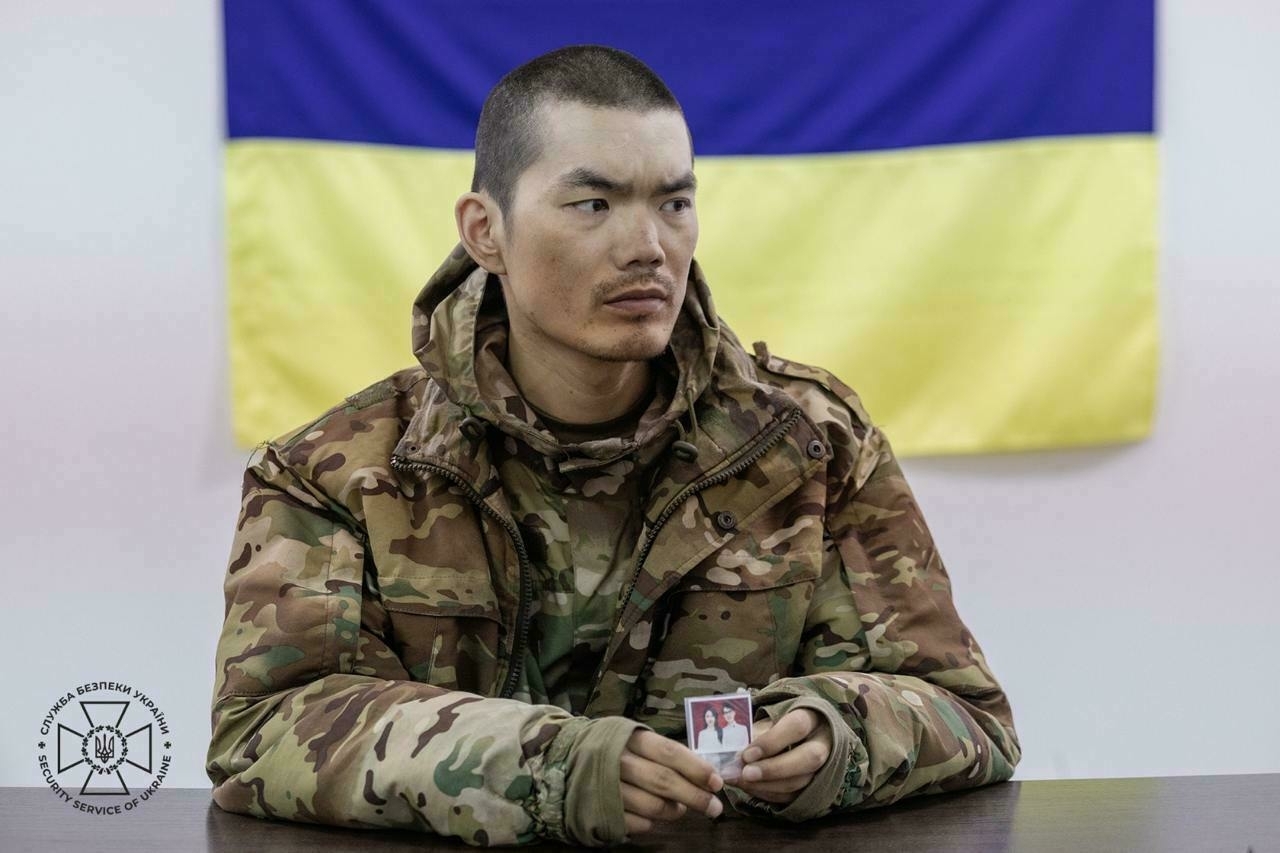
Russians preparing for assault in Kharkiv Oblast, Ukrainian military warnsRussian forces are regrouping and preparing for renewed assault in Kharkiv Oblast, according to Ukraine’s Operational-Strategic Group of Forces “Khortytsia."
In an official statement from April 12, “Khortytsia” reported that although no offensive actions were carried out by Russian troops in the Kharkiv direction over the last day, Russians are actively replenishing their units and getting ready to resume offensive operations in the region.
In the Kupiansk area, Ukrainian troops thwarted Russian assault attempts near Kindrashivka, Kamianka and Zahryzove. A mechanized assault involving five armored vehicles near Lozova and Nova Kruhliakivka was stopped.
Russian forces also launched attacks in the Lyman sector on the border of Luhansk and Donetsk oblasts, targeting areas around Novoyehorivka, Hrekivka, Olhivka, Ridkodub, Hlushchenkove, Novomykhailivka, Yampolivka, Torske and Nove. All Russian advances were repelled. Russian units also failed to gain ground in the Serebryansky forest.
In the Kramatorsk and Toretsk directions in Donetsk Oblast, assault actions of varying intensity took place near Predtechyne, Orikhovo-Vasylivka, Chasiv Yar, Druzhba, Dyliivka and Toretsk, with no loss of Ukrainian positions.
The Russian forces continued attempts to breach Ukrainian defenses in the Pokrovsk direction, attacking toward Yelyzavetivka, Zvirove, Preobrazhenka, Kotliarivka, Oleksiivka, Pishchane, Udachne, Lysivka, Novosergiivka and Andriivka.
According to Ukraine’s Commander-in-Chief of the Armed Forces Oleksandr Syrskyi, Russian personnel losses have exceeded 140,000 troops (140,650), since the beginning of the war.
The Kyiv Independent couldn’t independently verify Syrskyi’s statement.
These parents and children were killed by Russia after Kyiv agreed to 30-day ceasefireOne month ago, Ukraine agreed to a full 30-day ceasefire in the U.S.-mediated talks in Jeddah, and Russia did not. Russia has soon intensified its attacks against Ukrainian civilian infrastructure. Russian attacks on Ukraine have killed over 160 civilians in March alone. According to the United Na…The Kyiv IndependentDaria Shulzhenko
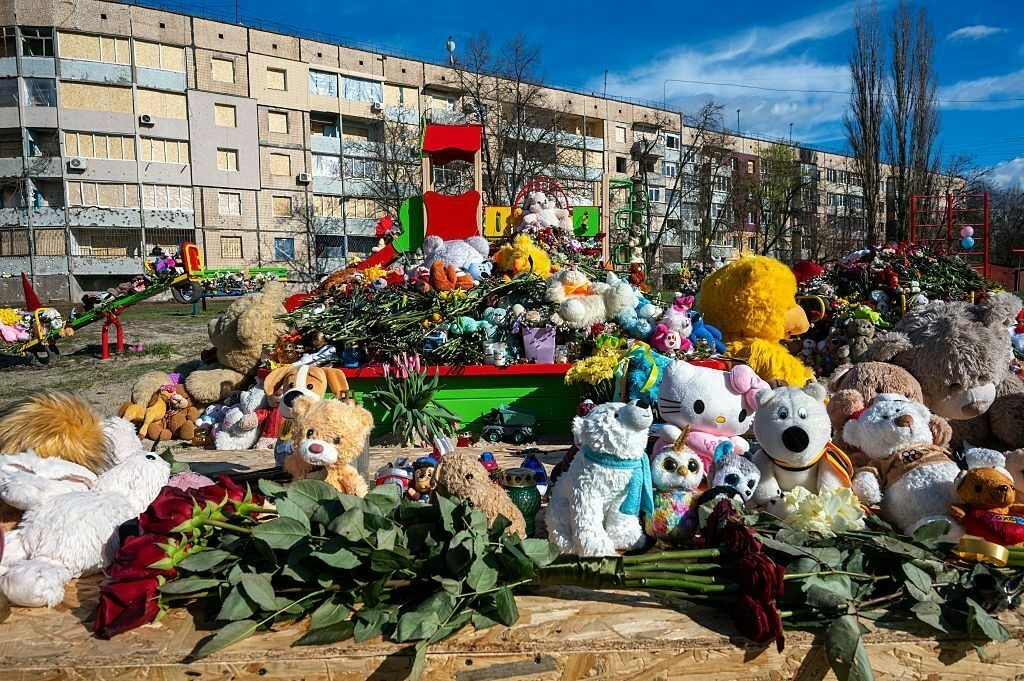
Domestic missile production increases eightfold in 2024, Ukrainian minister saysUkraine has significantly ramped up weapons manufacturing over the past year and is using domestically produced ballistic and cruise missiles every month, the country’s Minister for Strategic Industries said.
At a briefing marking Ukraine’s Gunsmith Day, Strategic Industries Minister Herman Smetanin said the country increased cruise missile production eightfold in 2024 compared to the previous year. He highlighted the progress since 2022, when Ukraine was only able to manufacture a single type of cruise missile, the Neptune.
“Last year, we introduced many new models, allowing us to grow production eightfold compared to 2023,” Smetanin said.
Ukraine has also more than doubled its production of long-range drones in 2024 compared to the previous year, which is a 22-fold increase compared to 2022. In total, 324 new types of weapons were developed in Ukraine by the end of 2024.
Smetanin said Ukraine produced $9 billion worth of arms in 2024, and the defense industry is on track to nearly quadruple that amount by the end of 2025.
“We already foresee growth this year,” he said. “By the end of 2025, we will have the capacity to produce $35 billion worth of military equipment domestically."
Presidential Advisor Oleksandr Kamyshin added that Ukraine can now supply its armed forces with nearly the full range of necessary military goods.
“Today, according to various estimates, 30% to 40% of what our troops use on the front lines is made in Ukraine,” Kamyshin said. “It’s not only about war — it’s about our economy. As of last year, defense manufacturing made up a significant share of our GDP. After our victory, I’m confident we’ll be exporting Ukrainian-made weapons to the world."
Forget Ovechkin and Washington. The Kyiv Capitals are playing for the survival of Ukrainian hockeyIt’s late in the second period of game four of the Ukrainian national hockey championship on April 2, and the upstart Kyiv Capitals, only in its second season, leads against established Hockey Club (HC) Kremenchuk and its star-studded roster. The Capitals captain, Serhii Chernenko, steals the puck…The Kyiv IndependentAndrea Januta
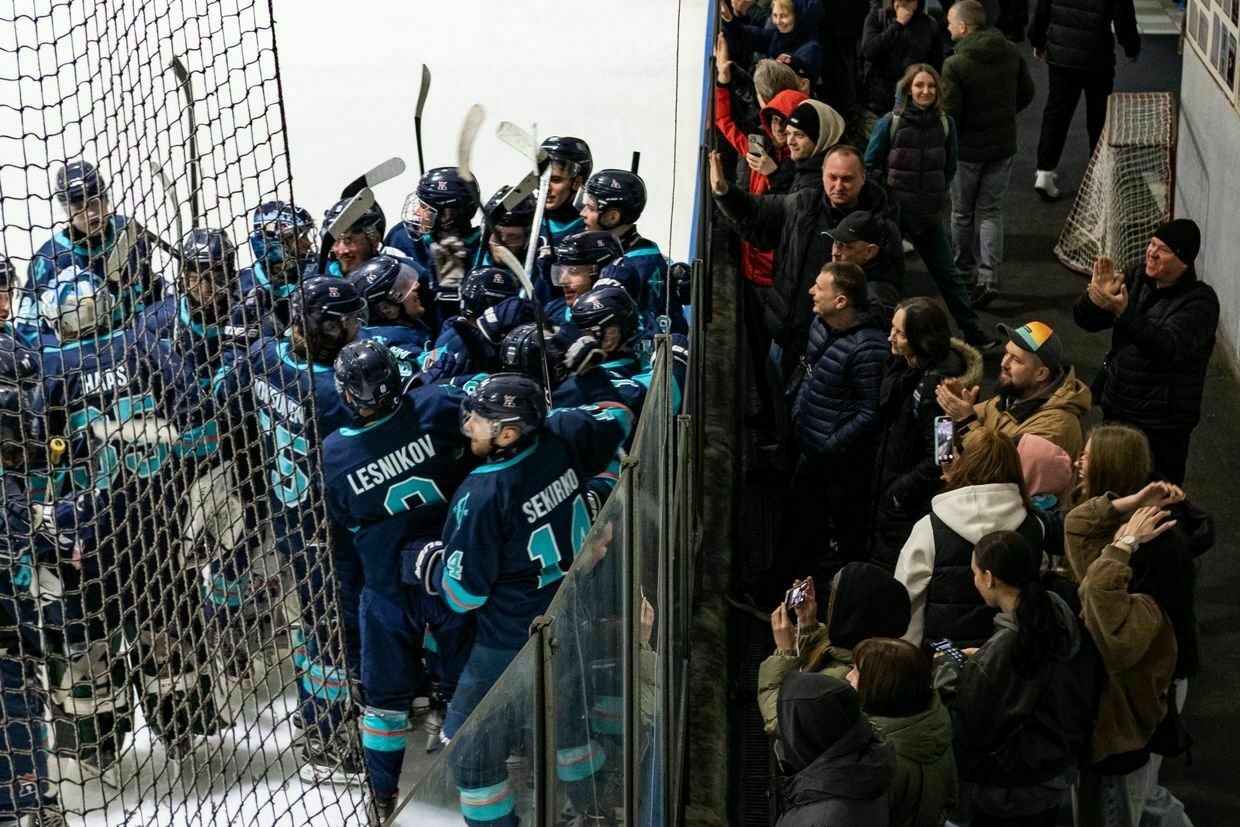
Note from the author:
Ukraine War Latest is put together by the Kyiv Independent news desk team, who keep you informed 24 hours a day, seven days a week. If you value our work and want to ensure we have the resources to continue, join the Kyiv Independent community.
-
Russia used cluster munitions in deadly attack on Sumy, US ambassador says
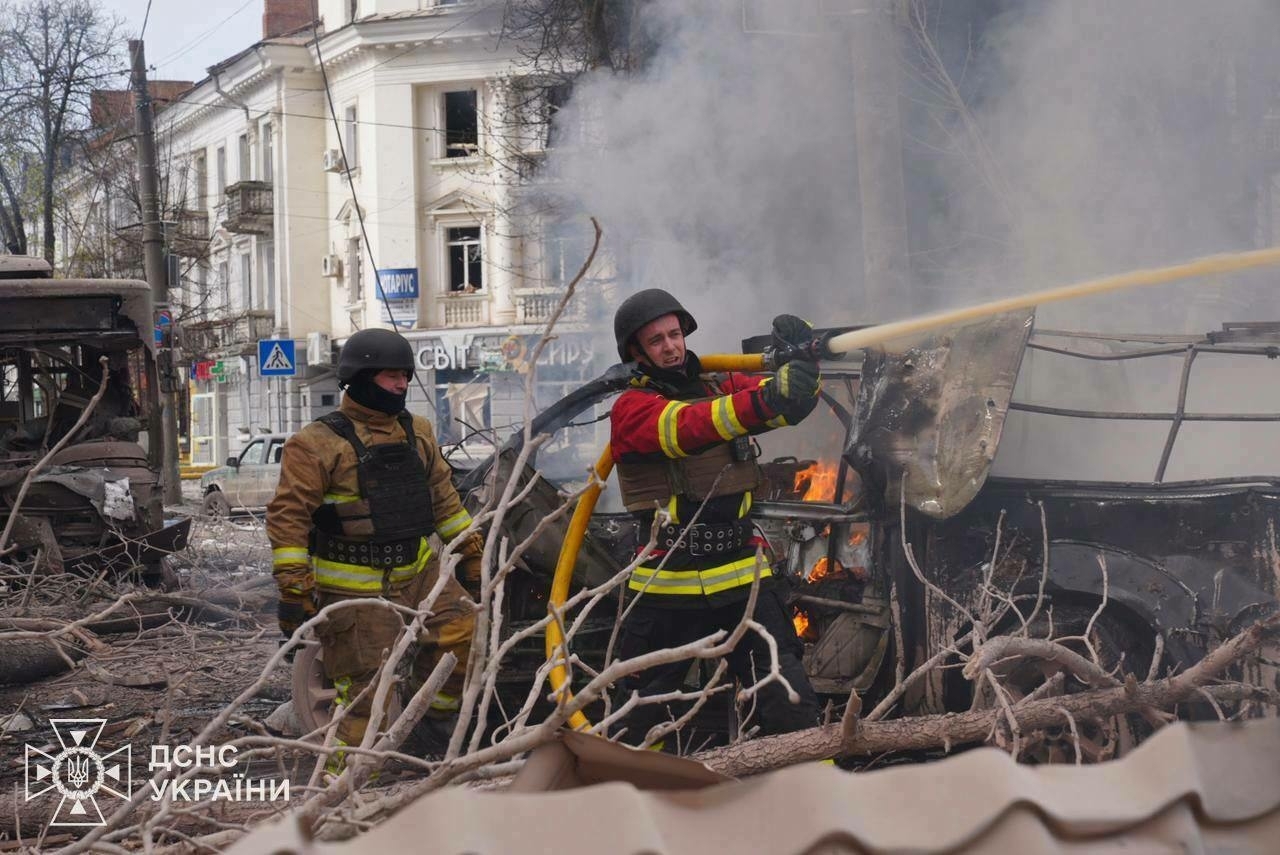
Russia deployed cluster munitions in its deadly Palm Sunday missile strike on the Ukrainian city of Sumy, outgoing U.S. Ambassador to Ukraine Bridget Brink said on April 13.
Russia attacked the northeastern city with ballistic missiles on the morning of Palm Sunday, killing at least 34 people, including two children. The strike injured at least another 117 people, including 15 children.
Brink joined the chorus of international officials speaking out in the aftermath of the attack. In a post on X, Brink said that reports indicate Russia used cluster munitions in the strike on Sumy.
“Reports indicate, as in Kryvyi Rih, cluster munitions were used, increasing the devastation and harm to civilians,” she wrote.
Russia targeted the city of Kryvyi Rih with a missile attack on April 4, killing 20 people and injuring 75. Children were among the casualties.
Cluster munitions disperse hundreds of smaller “bomblets” in a wide area upon impact. Russia has repeatedly used cluster munitions throughout its full-scale invasion, particularly in populated civilian areas.
Brink, who recently announced her resignation from her long-held post as ambassador, also expressed her sympathies.
“Our prayers are with the people of Sumy,” Brink wrote.
Brink’s departure is reportedly tied to disagreements with the Trump administration’s approach to policy on Ukraine and Russia.
U.S. Special Envoy to Ukraine Keith Kellogg also denounced Russia’s attack on Sumy, saying that targeting civilians “crosses any line of decency.” The attack has been widely condemned by European leaders, including French President Emmanuel Macron and U.K. Prime Minister Keir Starmer.
Trump urges Russia ‘to get moving’ to end war against Ukraine“Russia has to get moving. Too many people are dying, thousands a week, in a terrible and senseless war — a war that should have never happened, and wouldn’t have happened, if I were president,” U.S. President Donald Trump said.The Kyiv IndependentKateryna Denisova
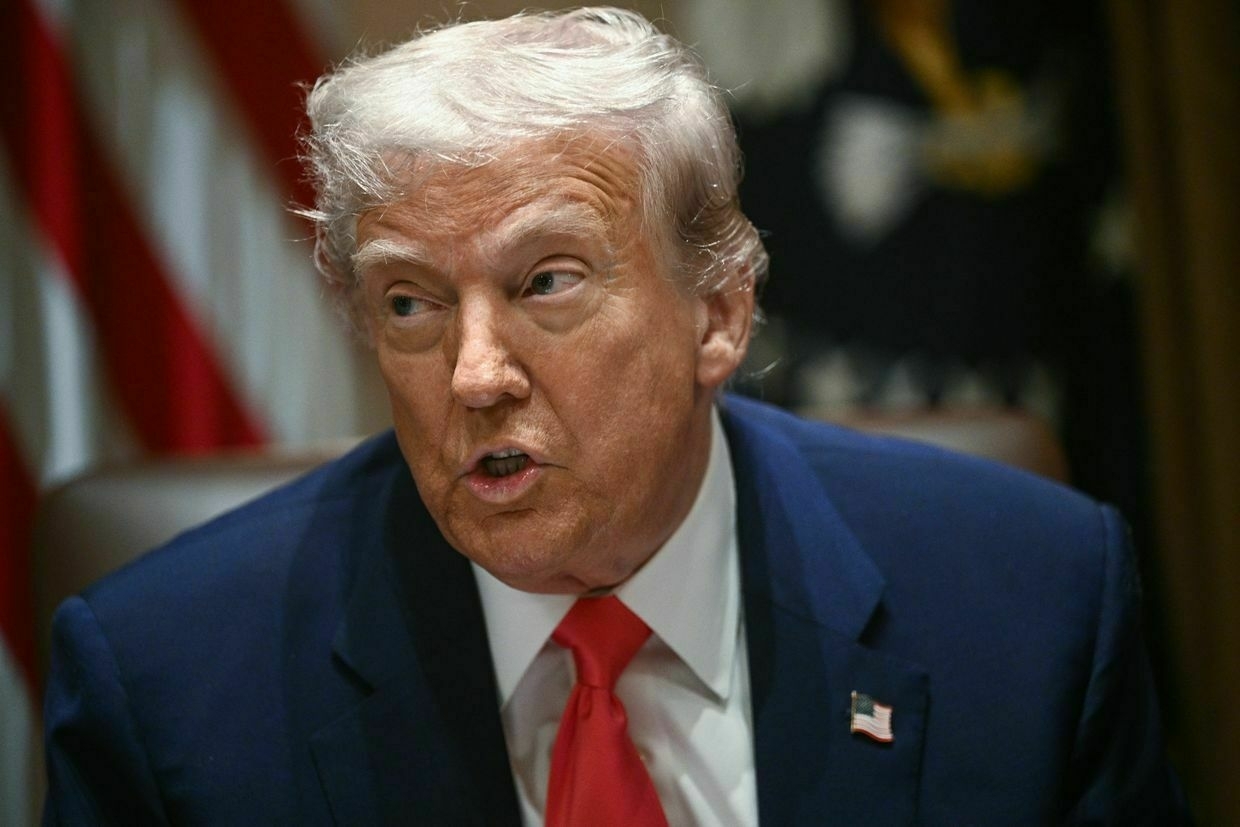
-
'Everything was black' — Russia's Palm Sunday attack on Sumy kills over 30, injures 117 amid ceasefire talks
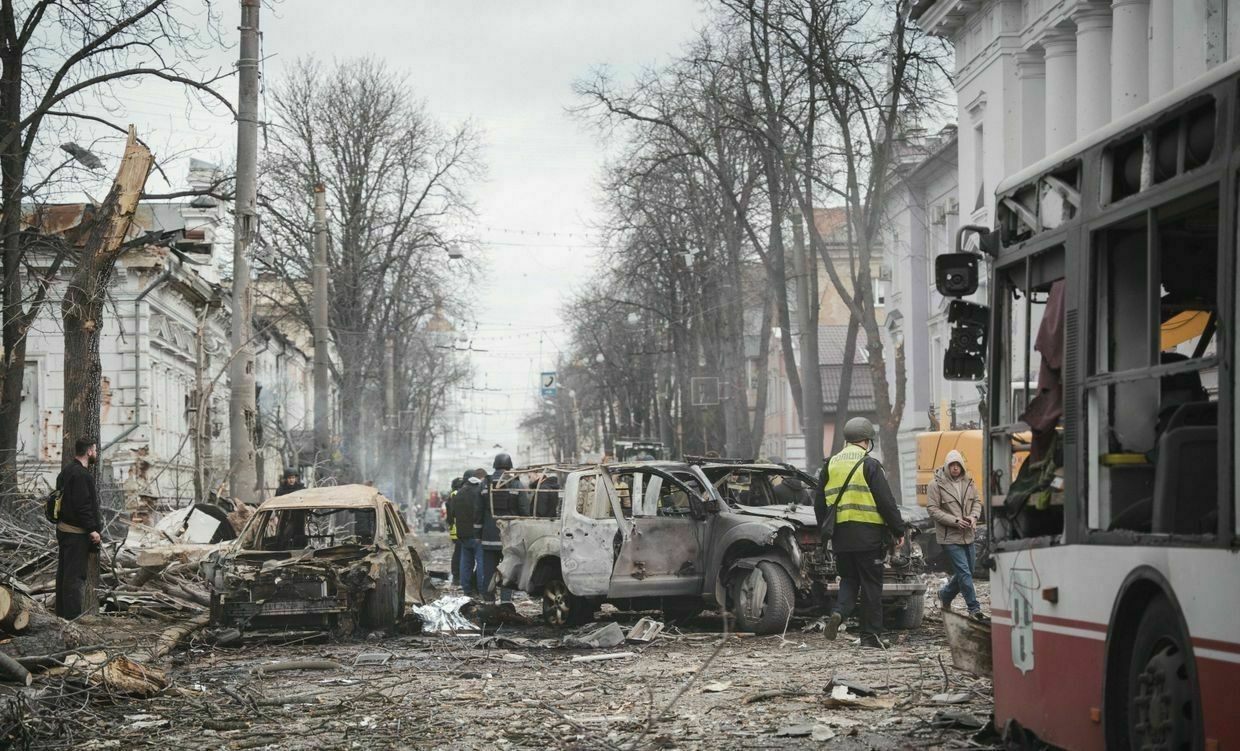
The burnt shell of a red bus lied in the center of Sumy after Russia launched two ballistic missiles hurtled at city on April 13 — not one passenger survived, Anna Shpurik, a journalist at local media Cukr told the Kyiv Independent following the attack.
They are just some of the 34 people killed in the strike, including two children. At least 117 people were injured, local authorities reported.
The city, which lies in northeastern Ukraine just over 30 kilometers from the Russian border, has suffered relentless attacks from Russia since the start of the full-scale invasion. This latest strike occurred on Palm Sunday, which many in Ukraine observe, and is one of the deadliest on Sumy. The attack has sparked outrage amid talks of a ceasefire and peace negotiations.
A day before the attack, President Donald Trump, who has attempted to spearhead peace talks, said negotiations between Russia and Ukraine were “going fine.” His Special Envoy, Steve Witkoff, met with Russian President Vladimir Putin in St. Petersburg on April 11 to discuss “aspects of the Ukrainian settlement.”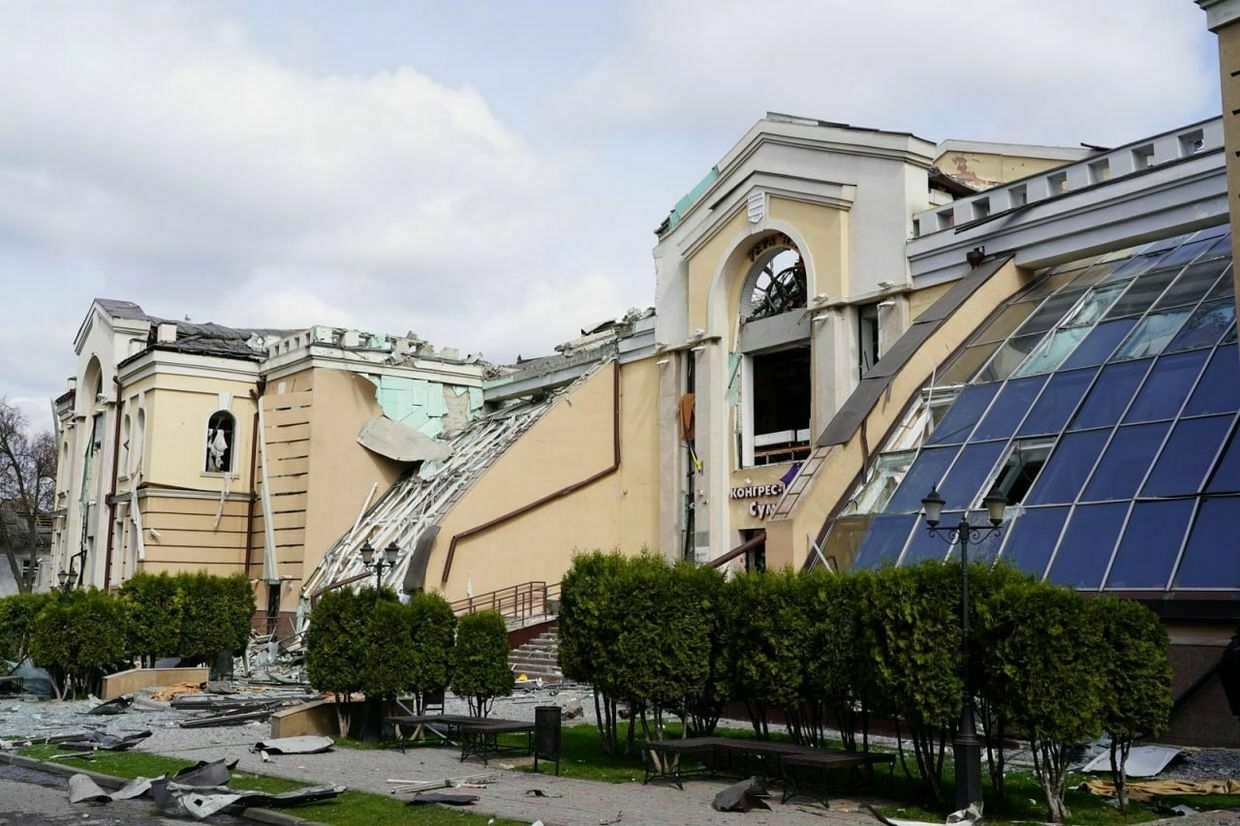
Damage to the Sumy State University Congress Center after a Russian missile strike on April 13, 2025. (State Emergency Service of Ukraine/Telegram) In response to the attack, European leaders, including German Chancellor Olaf Scholz, Italian Prime Minister Giorgia Maloni, and French President Emmanuel Macron, questioned Russia’s commitment to peace negotiations.
“Such Russian attacks demonstrate the state of Russia’s alleged willingness for peace. Instead, we see that Russia is relentlessly continuing its war of aggression against Ukraine,” Scholz wrote on X.
Ukrainian President Volodymyr Zelensky called for more pressure on Russia after the strike, saying that “talks have never stopped ballistic missiles and air bombs.”
The attack targeted civilian buildings in the city, with the worst damages inflicted on the Congress Center of Sumy State University as well as other university buildings, causing them to crumble, said Shpurik. The university’s Congress Center building houses a library and event spaces for students and the community.Residential buildings, a church, shops, and businesses also suffered, including Cukr’s office. The strike blew out eight windows and broke doors at their office. The head of the Sumy local administrations press service told the Kyiv Independent that a total of 48 buildings were damaged in the attack, including 28 residential buildings.
The city center was filled with people buying willow branches for Palm Sunday and lined with cars as locals enjoyed their Sunday morning. By the time Shpurik arrived in the center, “everything was black,” and it was littered with charred cars and buildings. People were too shocked to say anything, Shpurik recalled.
In a nearby residential building, one girl was crushed beneath a pile of cabinets before being freed. Employees at a nearby coffee shop jumped into action and applied first aid to the victims, said Shpurik.
“Everyone is afraid that the strikes might happen again. Everyone is afraid to find out the news about their relatives. Some people still don’t know what happened to their friends or acquaintances and are looking for them,” said Shpurik.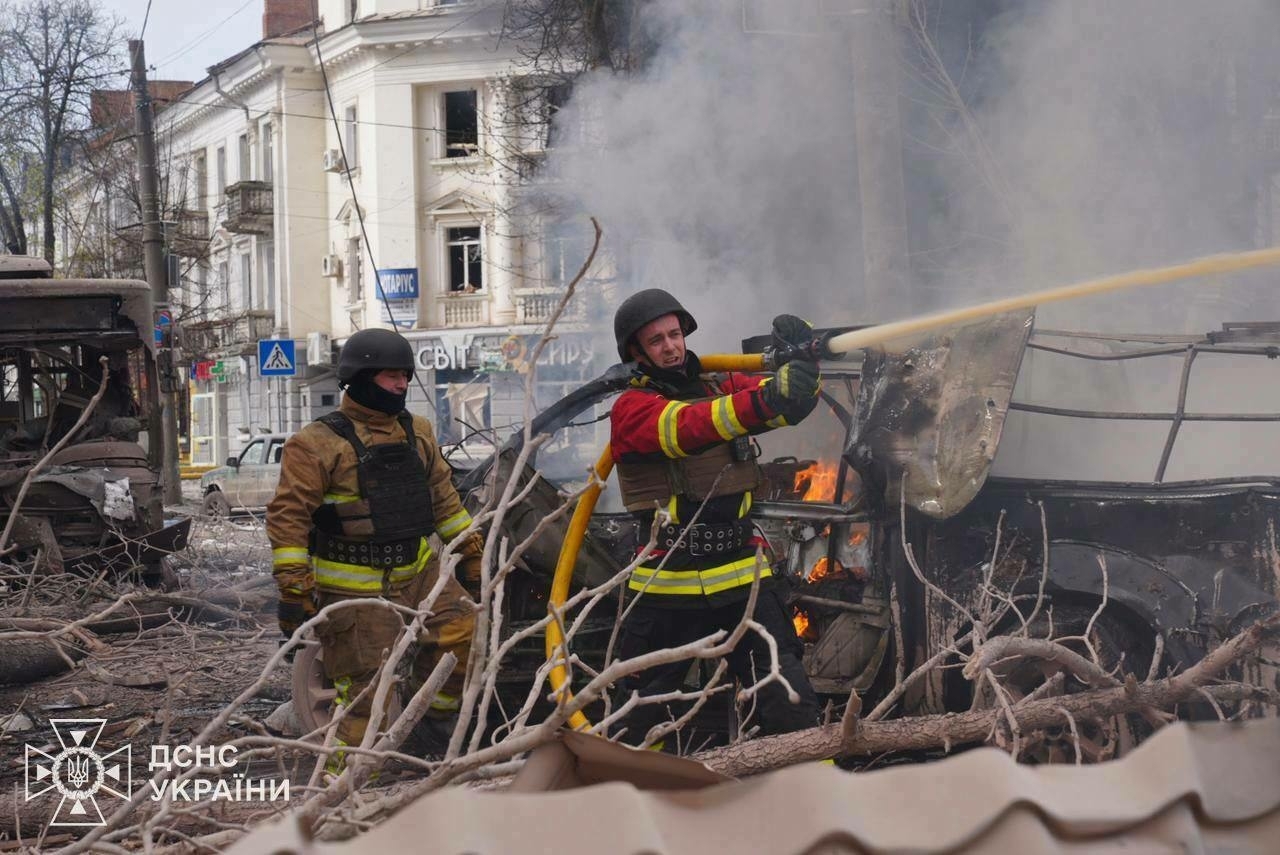
Firefighters battle a blaze in Sumy after the Palm Sunday attack on April 13, 2025. (State Emergency Service of Ukraine/Telegram) The second ballistic missile was the most deadly, Head of the Sumy City Military Administration Serhiy Kryvosheyenko wrote on his Telegram channel. It was loaded with fragments and exploded mid-air to “inflict maximum damage on people on the street,” he said.
Emergency services arrived within minutes to battle the fires and help the victims, while investigators and forensic teams collected evidence of the attack, Ukraine’s State Emergency Services reported. Psychologists were also on site to help those affected.
Ukraine’s military intelligence (HUR) tracked down the launch site to the town of Liski in Voronezh Oblast and Lezhenki in Kursk Oblast, roughly 330 kilometers and 180 kilometers from Sumy, respectively. The missiles were Iskander-M/KN-23s, fired by the 112th and 448th missile brigades, HUR reported.
Sumy Oblast, alongside neighboring Kharkiv Oblast, is the target of Russia’s new spring offensive, Zelensky said on April 9. Despite Ukraine agreeing to a full 30-day ceasefire following U.S.-mediated talks in Jeddah on March 11, Moscow has shown no sign of following suit.
Russia has instead ramped up its offensive operations and amassed forces for the spring offensive, shortly after recapturing much of Kursk Oblast. Ukraine attempted to hold the Russian region to disrupt plans for an offensive against bordering Sumy Oblast.
Ukrainian officials and experts believe the spring offensive is Moscow’s attempt to strengthen its hand in potential negotiations.
Putin also ordered Russia’s largest conscription effort in 14 years on March 31. The spring conscription, running from April to June, will see 160,000 18 to 30-year-old men drafted to the army, although conscripts are not typically deployed to combat.
Ukraine’s Commander-in-Chief Oleksandr Syrskyi said that Russia has increased its force in Ukraine by five times since the start of the full-scale invasion. He estimates that there are 623,000 Russian troops deployed in Ukraine and warned that Moscow has the capacity to mobilize 5 million trained troops.
“Every month, they increase it by 8,000-9,000; in a year, it’s 120,000-130,000,” he said.Note from the editor:
For this story, we spoke with Anna Shpurik, a journalist at Cukr, an independent Ukrainian media outlet based in Sumy. Their editorial office suffered minor damage from the April 13 attack. Cukr is also one of many Ukrainian media outlets hit by the U.S. aid cutoff and needs support. You can support it through a one-time donation or a Patreon subscription.
‘Putin is pure evil’ — Trump’s spiritual advisor on Russia’s war against UkraineWhen U.S. President Donald Trump paused military aid to Ukraine last month, the man described as his “spiritual advisor,” Pastor Mark Burns, backed the decision. This week, Burns is urging him to send Kyiv more tanks, fighter jets, and air defense. “I now believe that supporting Ukraine is AmericaThe Kyiv IndependentChris York
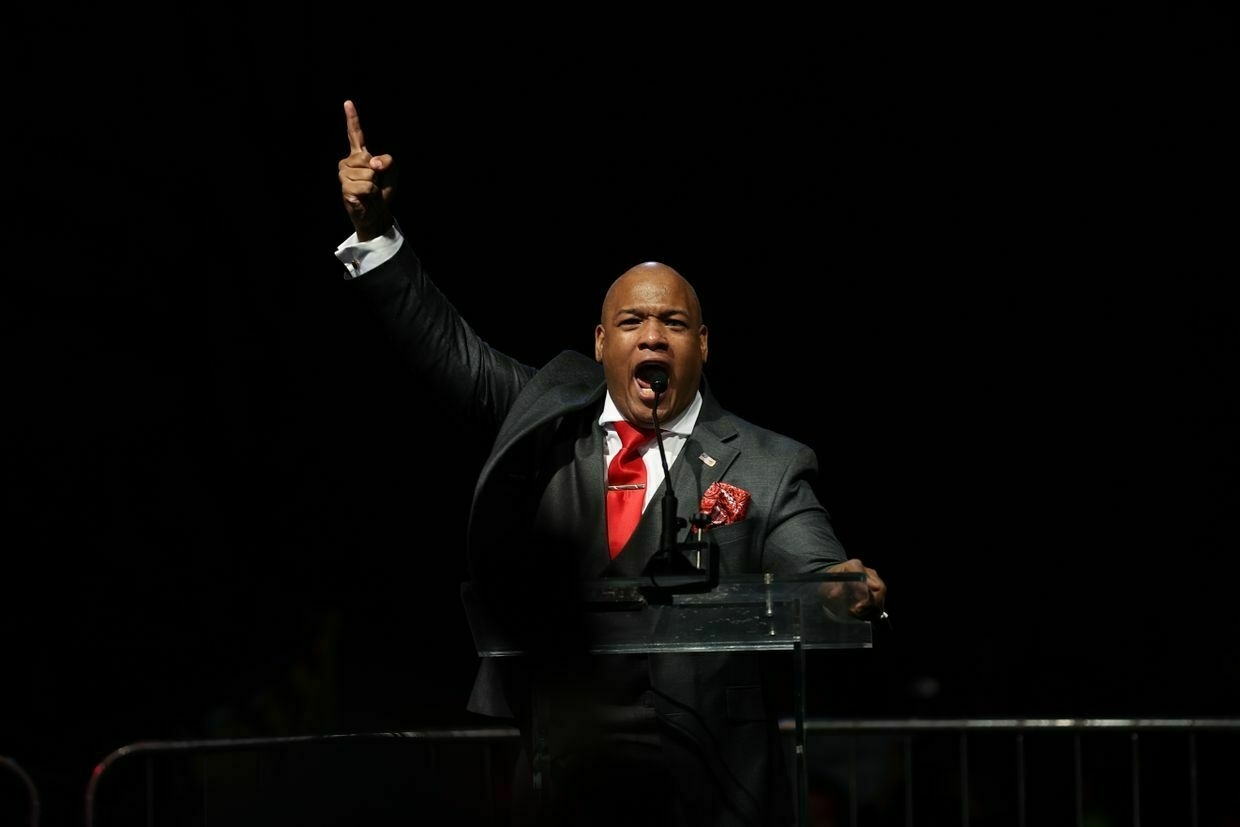
-
'Crosses any line of decency' — US Envoy Kellogg condemns Russian attack on Sumy
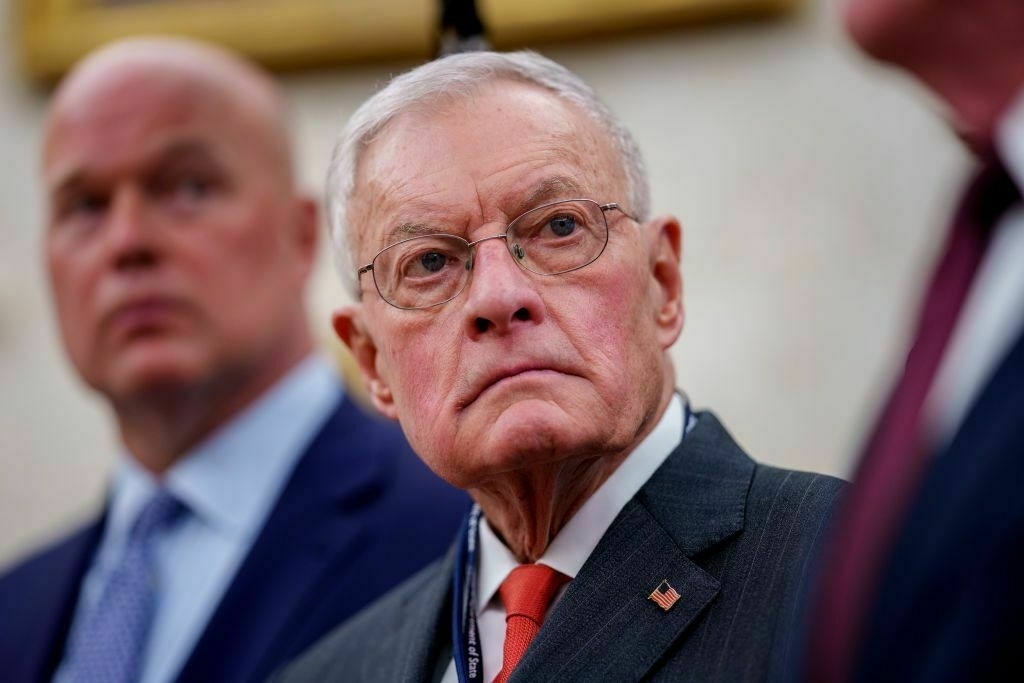
Russia’s deadly Palm Sunday missile strike on the city of Sumy “crosses any line of decency,” U.S. Special Envoy to Ukraine Keith Kellogg said on April 13 in a post condemning the attack.
Russia launched two ballistic missiles at Ukraine’s northeastern city of Sumy on the morning of April 13, killing at least 34 people and injuring at least 117. The attack came on Palm Sunday, as many citizens were celebrating the religious holiday in the leadup to Easter.
“Today’s Palm Sunday attack by Russian forces on civilian targets in Sumy crosses any line of decency,” Kellogg wrote on X.
“There are scores of civilian dead and wounded. As a former military leader, I understand targeting and this is wrong. It is why President Trump is working hard to end this war."
The attack comes amid Washington’s attempts to orchestrate a ceasefire between Russia and Ukraine. While U.S. President Donald Trump originally tapped Kellogg to lead negotiations between Kyiv and Moscow, the retired general has been relegated to a supporting role as Trump’s Special Middle East Envoy, Steve Witkoff, has emerged as a key figure in the talks.
Witkoff met personally with Russian President Vladimir Putin in St. Petersburg on April 11, just two days before the attack. On the same day, Reuters reported that Witkoff and Kellogg were at odds in their approach to the peace process in Ukraine.
Kyiv agreed to a full 30-day ceasefire a month ago, but Moscow has so far refused and has continued to launch attacks on Ukraine’s civilian centers.
The day before the attack, President Donald Trump said that negotiations between Russia and Ukraine were “going fine,” but emphasized that a resolution must come soon.
Kellogg’s condemnation echoes the statements of many European leaders, who said the deliberate attack on civilians indicated that Russia was not ready for peace.
While several leaders called for increased sanctions and pressure against Moscow, Kellogg’s statement fell short of demanding any consequences for Russia’s attack.
‘A war crime’ — European leaders react to Russia’s Palm Sunday attack on Sumy that killed dozensRussia launched two ballistic missiles at the city in northeastern Ukraine on the morning of Palm Sunday, when many citizens were celebrating the religious holiday.The Kyiv IndependentThe Kyiv Independent news desk
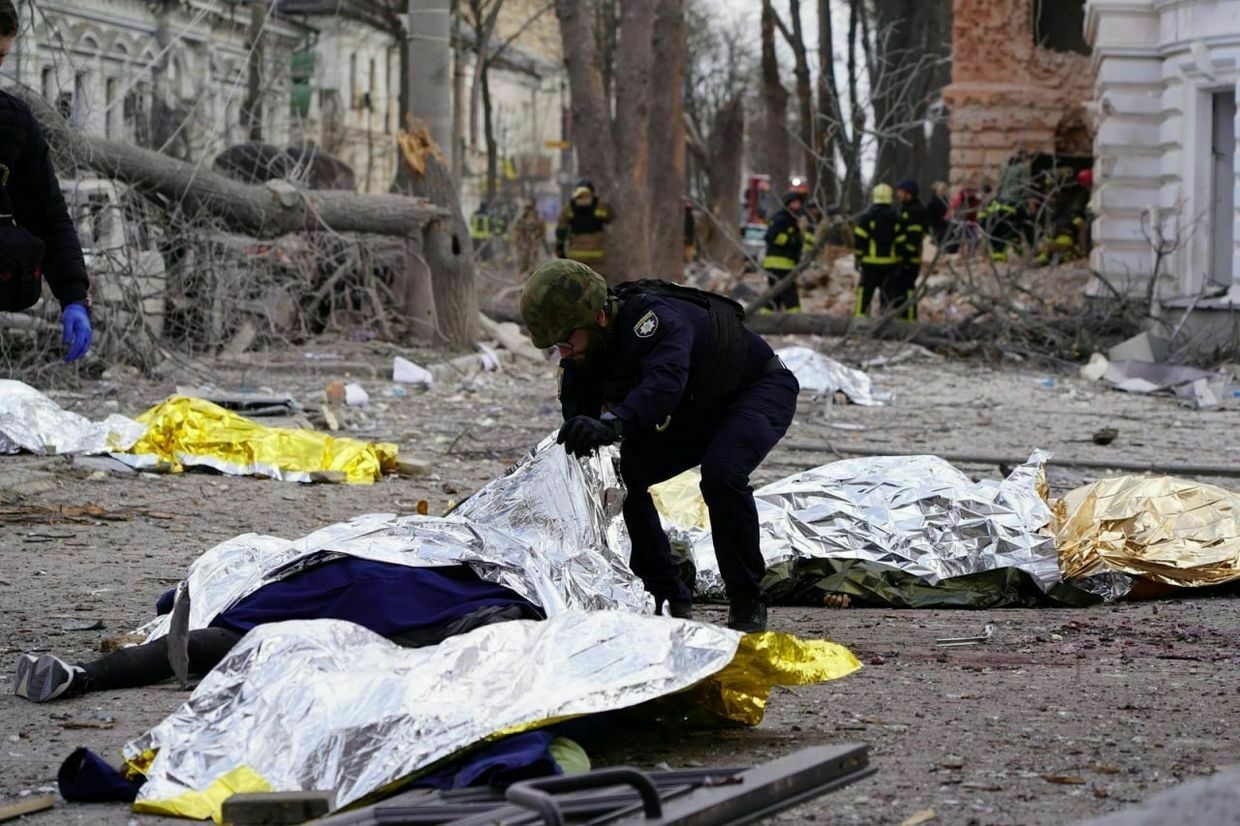
-
'A war crime' — European leaders react to Russia's Palm Sunday attack on Sumy that killed dozens
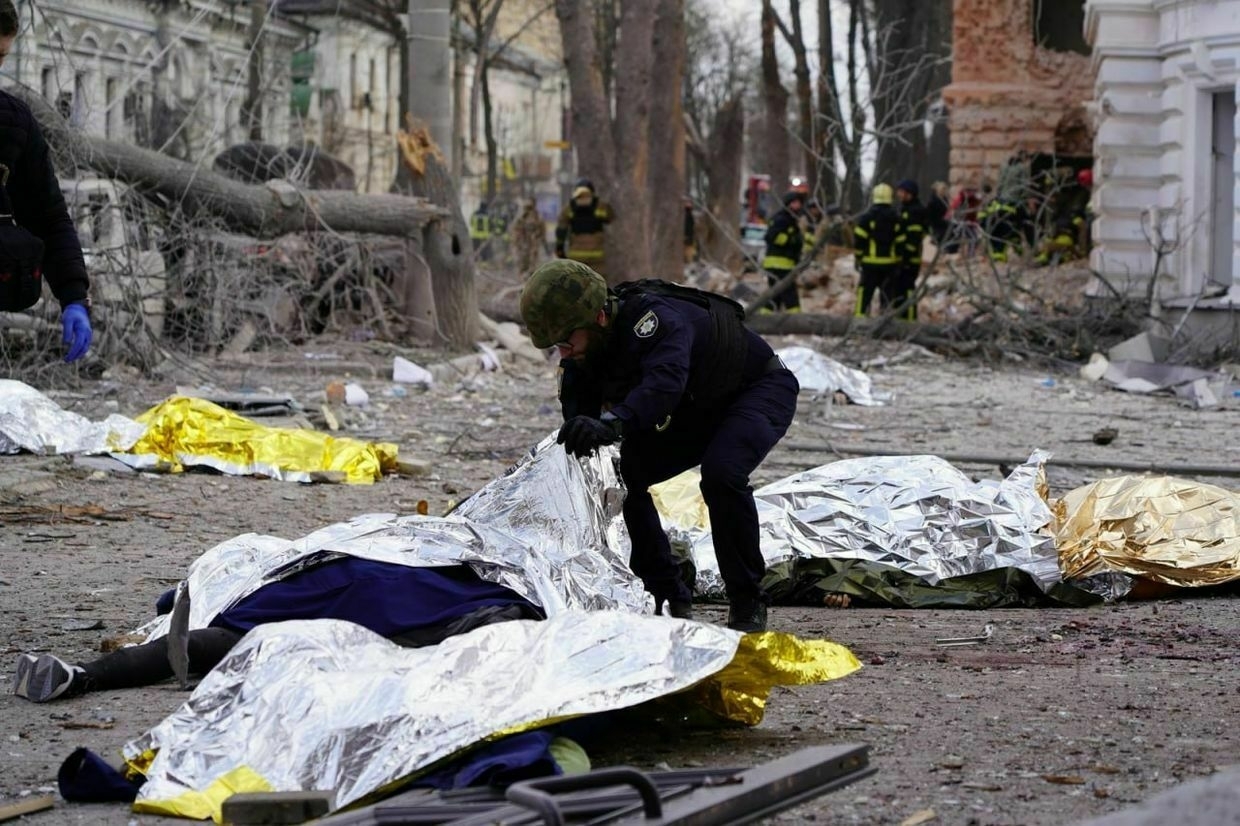
European leaders have condemned Russia’s missile attack on Ukraine’s northeastern city of Sumy that killed at least 32 people, including two children, and injured 84.
Russia on April 13 launched two ballistic missiles at the city in northeastern Ukraine on the morning of Palm Sunday, when many citizens were celebrating the religious holiday in the leadup to Easter.
The attack took place just two days after U.S. Special Envoy Steve Witkoff met Russian President Vladimir Putin in St. Petersburg to discuss peace negotiations.
“Everyone knows: This war was initiated by Russia alone. And today, it is clear that Russia alone chooses to continue it — with blatant disregard for human lives, international law, and the diplomatic efforts of President Trump,” French President Emmanuel Macron wrote on X.
He called for strong measures to “impose a ceasefire on Russia” and noted that France is working towards that goal with allies.
EU High Representative for Foreign Affairs and Security Policy Kaja Kallas wrote on X that the attack was “heartbreaking” as citizens gathered for Palm Sunday “only to be met by Russian missiles.”
“Horrific example of Russia intensifying attacks while Ukraine has accepted an unconditional ceasefire,” she added, referencing Kyiv’s agreement to a full 30-day ceasefire after U.S.-mediated talks in Jeddah on March 11.
The EU’s ambassador to Ukraine, Katarina Mathernova, called the attack on churchgoers during Palm Sunday a “war crime” and said that Europe is “increasing pressure on Russia and supporting Ukraine in every possible way.”
“Nothing seems to be sacred to the Russians — neither churches, nor Ukrainian children,” she added.
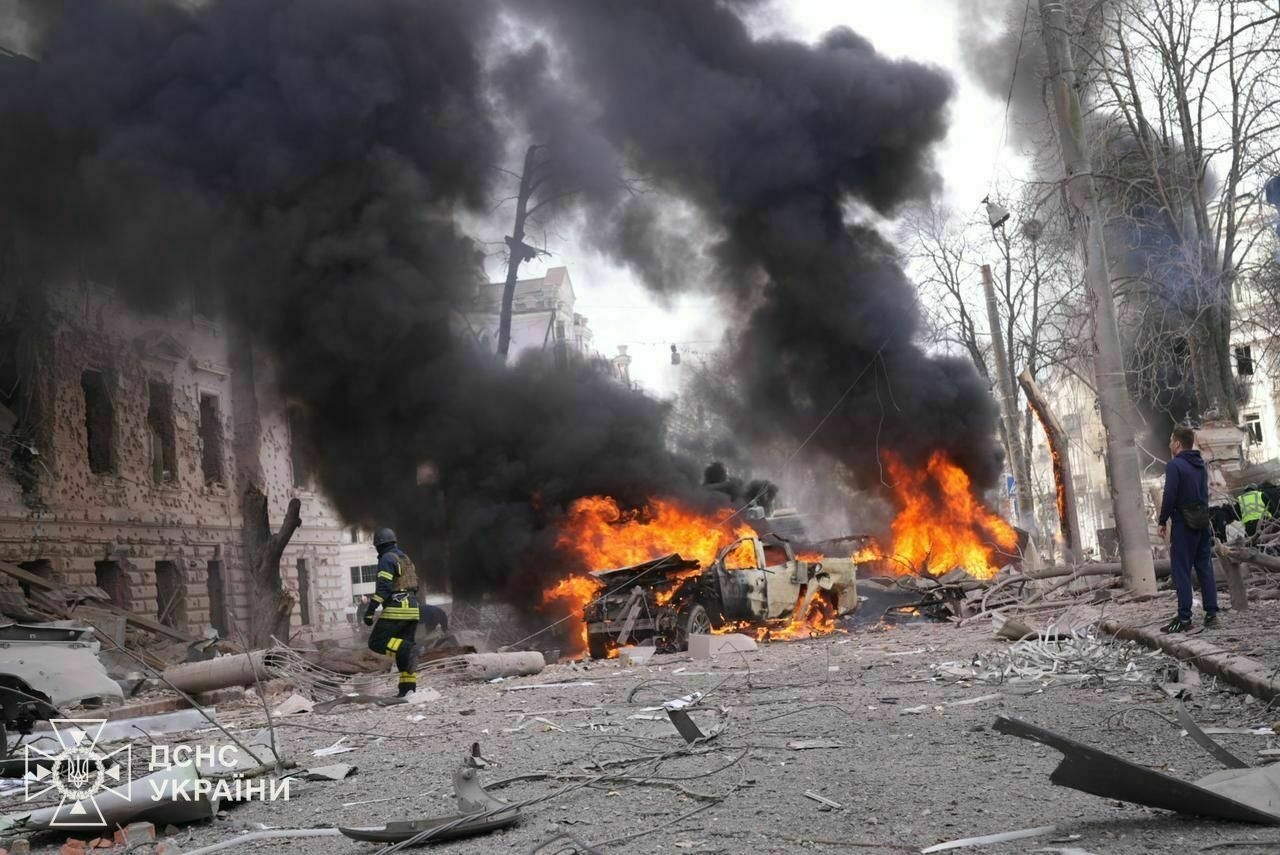
Emergency workers respond to a fire after a Russian missile attack on Sumy on April 13, 2025. (State Emergency Service of Ukraine/Telegram) Moldova’s President Maia Sandu called for more air defense for Ukraine and added that Moldova “mourns with Ukraine.” She said that “Palm Sunday is a day of peace,” emphasizing that Russia “must be held accountable” and that “there is no justification for such evil.”
The leader of the exiled Belarusian opposition Sviatlana Tsikhanouskaya wrote on X that “Putin’s regime shows once again that it does not want peace.”
Estonia’s Prime Minister Kristen Michal said the attack proves that “Russia’s goal is erasing Ukraine.” He stressed that aid to Ukraine cannot be delayed, adding that “no pressure on Russia means no peace.”
‘Putin is pure evil’ — Trump’s spiritual advisor on Russia’s war against UkraineWhen U.S. President Donald Trump paused military aid to Ukraine last month, the man described as his “spiritual advisor,” Pastor Mark Burns, backed the decision. This week, Burns is urging him to send Kyiv more tanks, fighter jets, and air defense. “I now believe that supporting Ukraine is AmericaThe Kyiv IndependentChris York
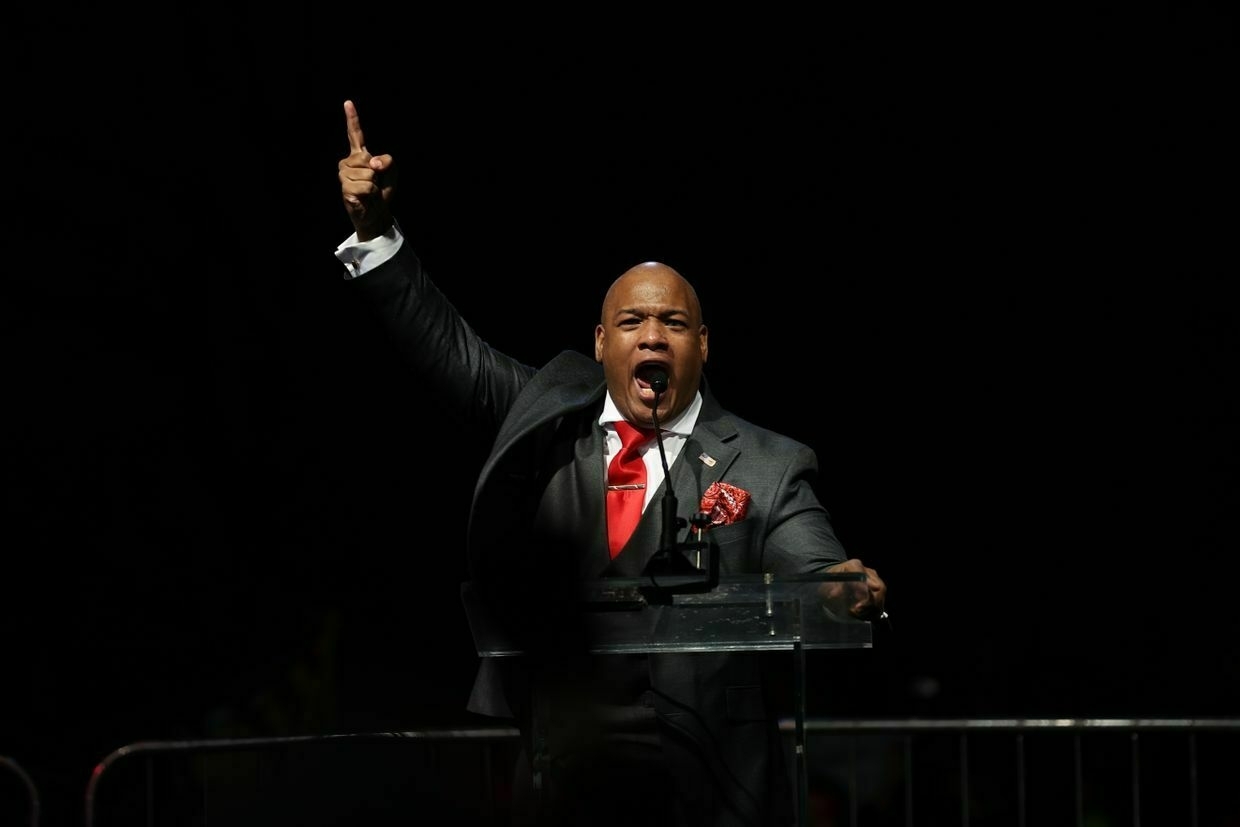
-
Russian strike kills at least 21 in Sumy on Palm Sunday
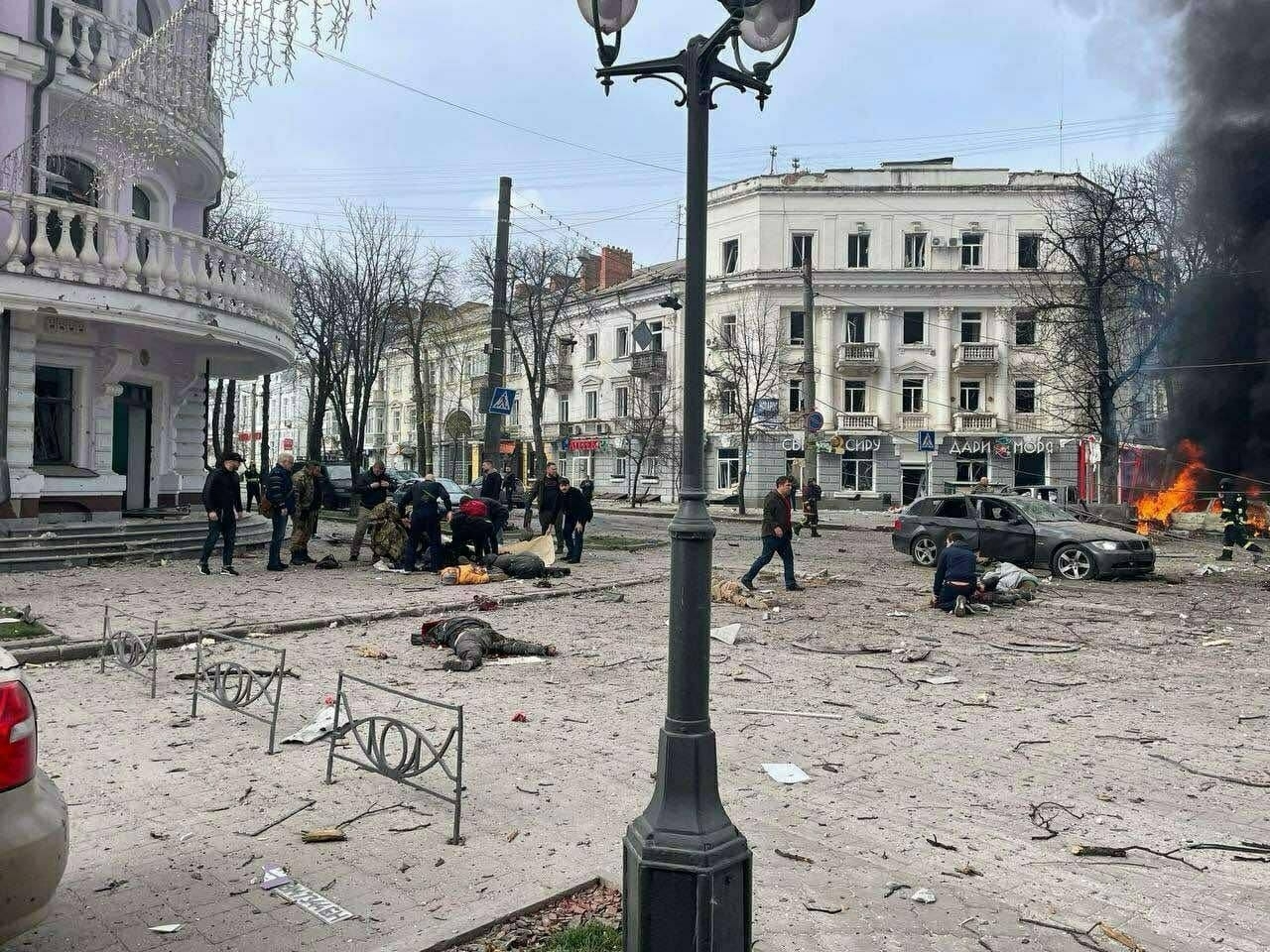
Editor’s Note: This is a developing story.
A Russian ballistic missile strike killed multiple people in the city of Sumy on the morning of Palm Sunday, Sumy Mayor Artem Kobzar reported on April 13.
There are 21 confirmed dead and at least 20 injured at the time of publication, Ukraine’s Emergency Services reported.
Ukraine’s Air Force warned of a ballistic missile threat in Sumy Oblast at 10:17 am. By 10:52 am, Kobzar announced that the city had been hit with “many dead” as a result of a missile strike.“Enemy missiles hit an ordinary city street, ordinary life: houses, educational institutions, cars on the street… And this is on a day when people go to church: Palm Sunday,” President Volodymyr Zelensky wrote on his Telegram channel.
“Without pressure on the aggressor, peace is impossible. Talks have never stopped ballistic missiles and air bombs. We need the kind of attitude towards Russia that a terrorist deserves,” he added.Videos are circulating on social media showing the aftermath of the attack on the city center. Bodies are seen strewn across the street, and several vehicles, including a bus, suffered heavy damage from the attack, with one car engulfed in flames.
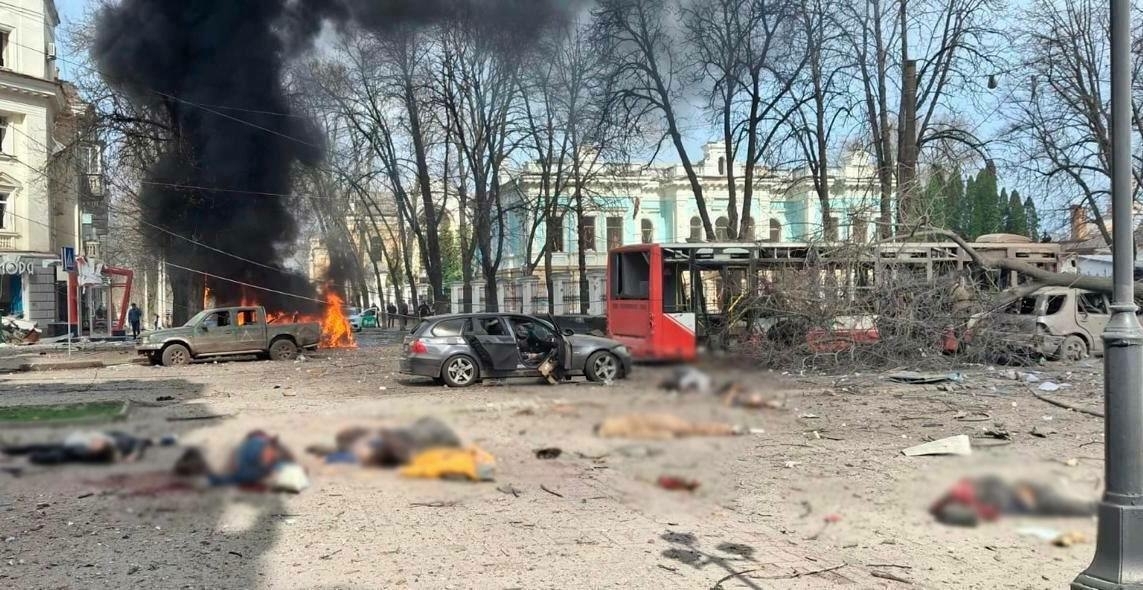
Aftermath of the strike on Sumy that killed dozens of civilians. April 13, 2025. (The State Emergency Service of Ukraine/Telegram) Palm Sunday is celebrated by Christians on the Sunday before Easter. Many people in Ukraine attend church on the holiday.
The attack comes as Washington attempts to orchestrate a ceasefire between Russia and Ukraine. Kyiv agreed to a full 30-day ceasefire a month ago, but Moscow has so far refused, and has continued to launch attacks at Ukraine’s civilian centers.
The day before the attack, President Donald Trump said that negotiations between Russia and Ukraine were “going fine,” but emphasized that a resolution must come soon.
“There’s a point at which you have to either put up or shut up. We’ll see what happens, but I think it’s going fine,” he told reporters.
These parents and children were killed by Russia after Kyiv agreed to 30-day ceasefireOne month ago, Ukraine agreed to a full 30-day ceasefire in the U.S.-mediated talks in Jeddah, and Russia did not. Russia has soon intensified its attacks against Ukrainian civilian infrastructure. Russian attacks on Ukraine have killed over 160 civilians in March alone. According to the United Na…The Kyiv IndependentDaria Shulzhenko
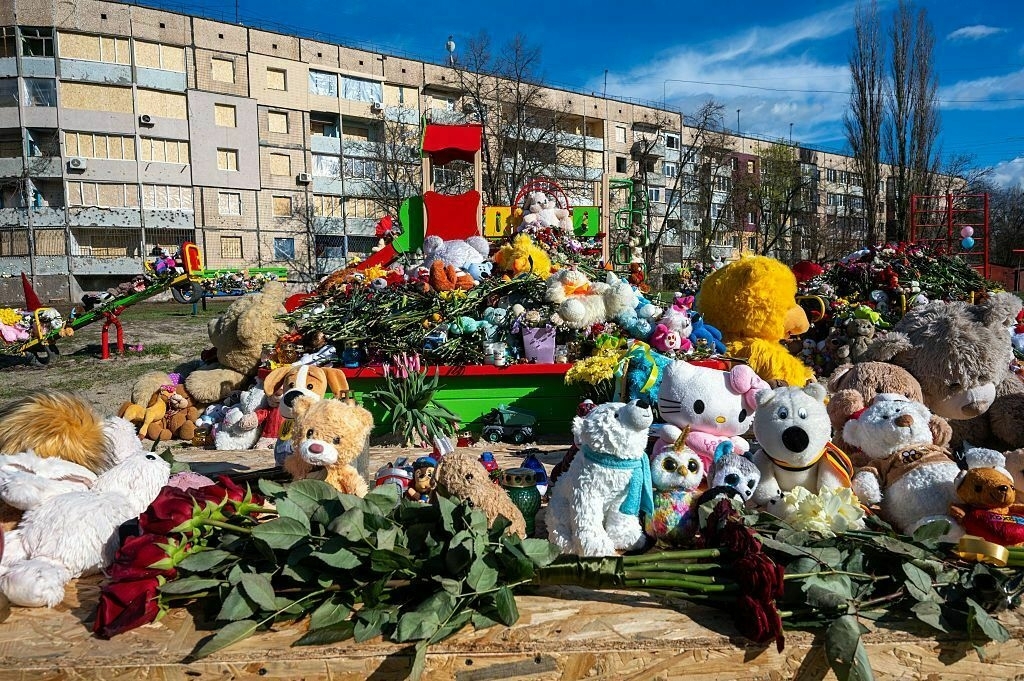
-
Explosion rocks thermal plant in Russia
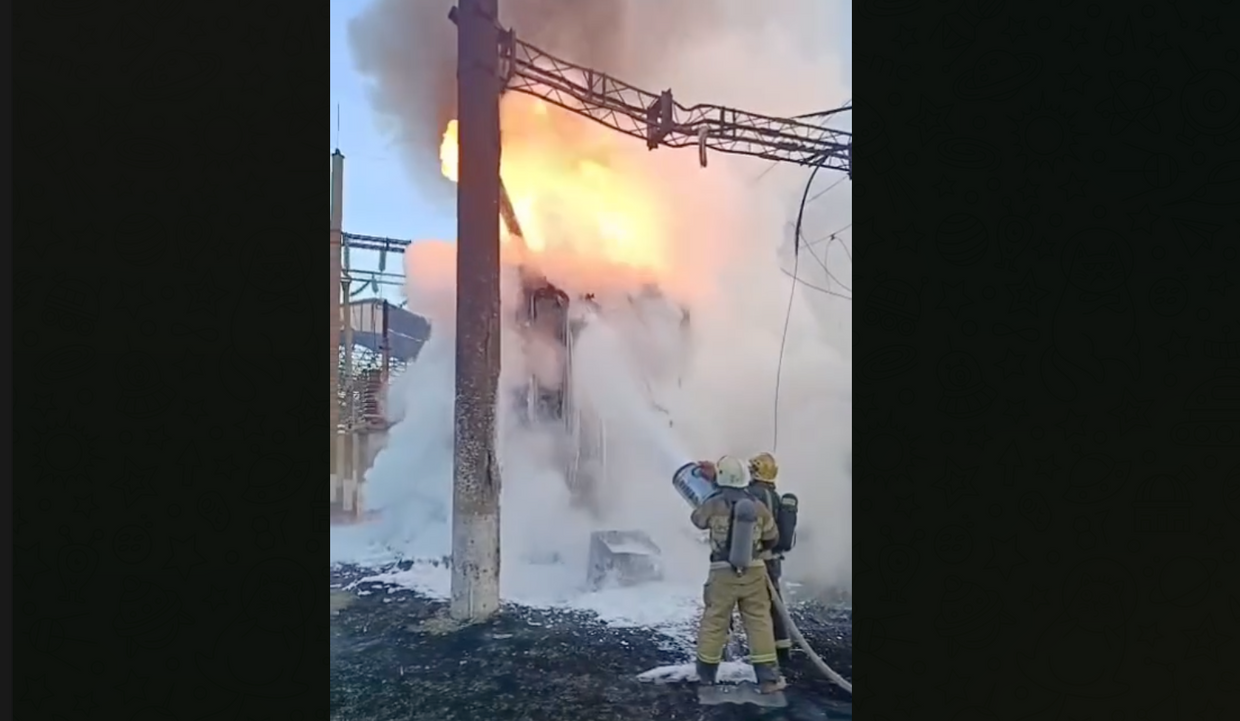
An explosion rocked a thermal power plant in the Russian city Orenburg, the local Emergency Services Ministry reported on April 13.
As a result, a fire broke out at a substation in the morning, leaving many local residents without power. There were no casualties, and the fire has now been extinguished.
It took a force of 20 people to put out the fire, which covered 10 square meters. Russia’s Unified Operational Dispatch Service blamed the fire on “a short circuit” at the transformer substation, Russian media reported.
Orenburg lies close to the border with Kazakhstan, around 1,700 kilometers from Kyiv and 1,200 kilometers from Moscow. The Russian Defense Ministry said it destroyed Ukrainian drones in the Rostov and Belgorod oblasts overnight but did not report on any drones in Orenburg Oblast.
A gas station owned by Russian energy giant Lukoil is located near the plant, as reported by Russian independent media ASTRA. Ukrainian drones have regularly targeted Russia’s oil and gas assets in a bid to undermine Moscow’s war machine, which relies on profits from the energy sector.
A Ukrainian attack on March 19 caused a huge fire at an oil refinery in Krasnodar Krai that raged for nearly a week.
Kyiv has not commented on the explosion in Orenburg.
Ukrainian drones have flown deep into Russian territory, with strikes reported 1,500 kilometers into Russia, including in Orenburg Oblast. In May 2024, a Ukrainian drone attacked an early-warning Voronezh M radar in the city of Orsky in Orenburg Oblast.
Ukraine’s military intelligence (HUR) last October claimed responsibility for a fire that damaged a Russian Tu-134 military transport aircraft at a military airfield in Orenburg Oblast.
Last month, President Volodymyr Zelensky announced a long-range drone capable of flying 3,000 kilometers.
Ukraine war latest: US envoy Witkoff proposes giving Russia ‘ownership’ of Ukrainian regions, Reuters reportsKey developments on April 11: * US envoy Witkoff proposes giving Russia ‘ownership’ of Ukrainian regions, Reuters reports * Trump urges Russia “to get moving” to end war against Ukraine * Putin meets U.S. envoy Witkoff to discuss Ukraine, Kremlin says * “Several hundred” Chinese nationals fight…The Kyiv IndependentThe Kyiv Independent news desk
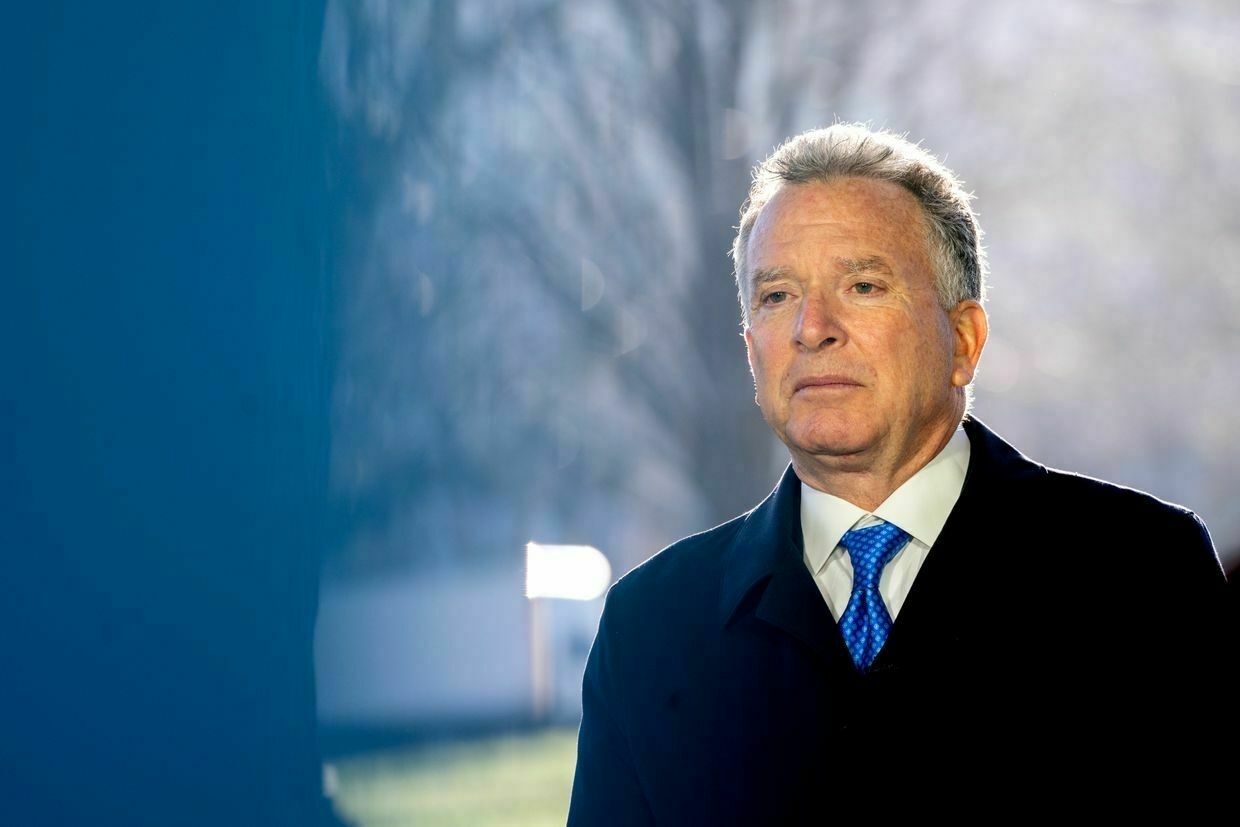
-
General Staff: Russia has lost 932,670 troops in Ukraine since Feb. 24, 2022
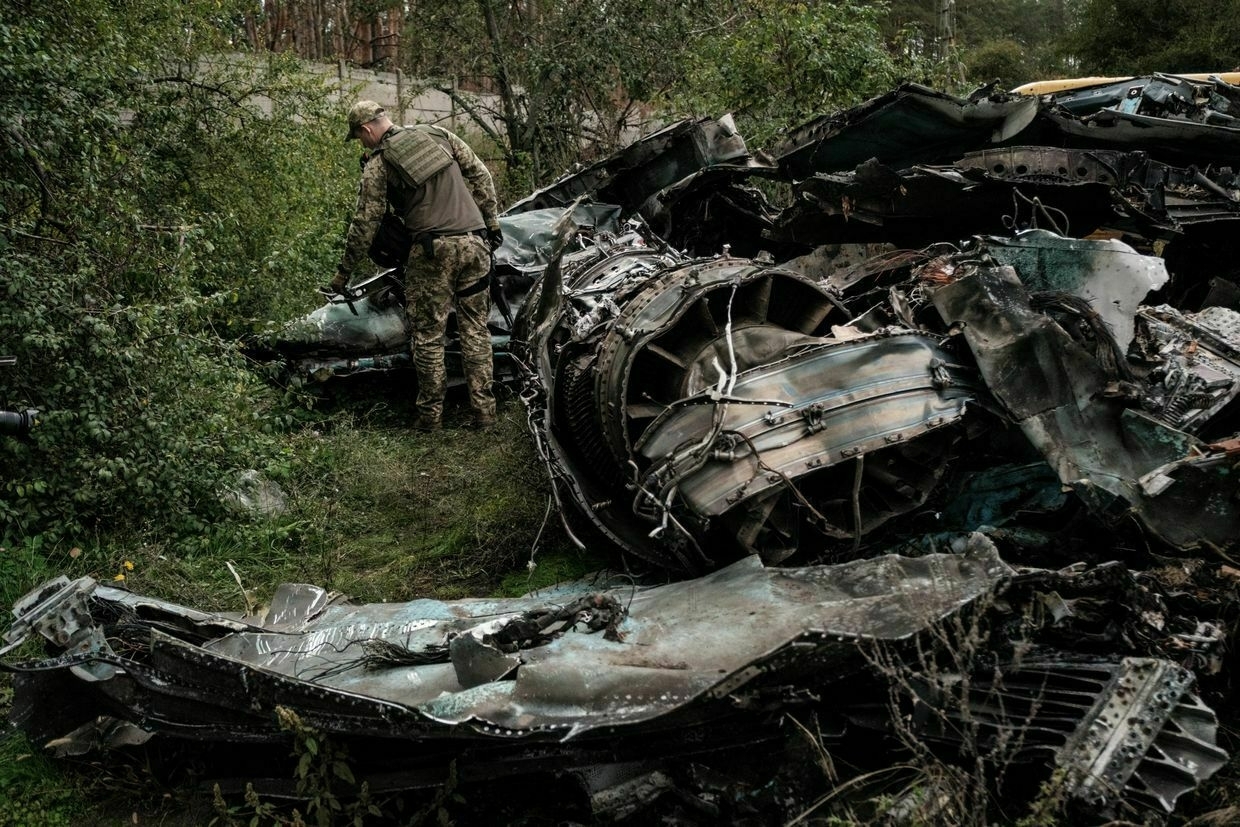
Russia has lost 932,670 troops in Ukraine since the beginning of its full-scale invasion on Feb. 24, 2022, the General Staff of Ukraine’s Armed Forces reported on April 13.
The number includes 1,220 casualties Russian forces suffered just over the past day.
According to the report, Russia has also lost 10,603 tanks, 22,088 armored fighting vehicles, 43,950 vehicles and fuel tanks, 26,163 artillery systems, 1,362 multiple launch rocket systems, 1,128 air defense systems, 370 airplanes, 335 helicopters, 32,425 drones, 28 ships and boats, and one submarine.
‘There’s a point at which you have to either put up or shut up’ — Trump says on Russia-Ukraine talksTrump’s comments followed a high-level meeting in Russia, where his envoy, Steve Witkoff, met with Russian President Vladimir Putin on April 11.The Kyiv IndependentOlena Goncharova
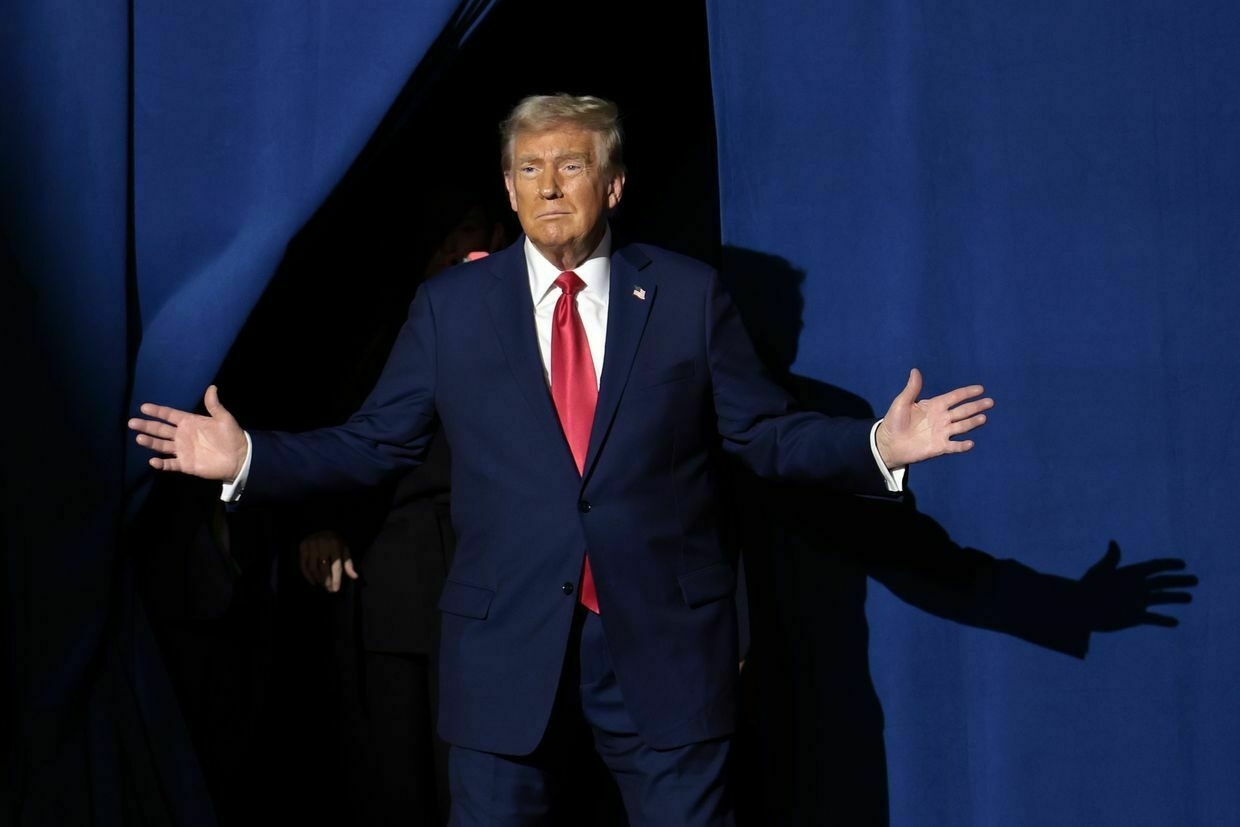
-
'There’s a point at which you have to either put up or shut up' — Trump says on Russia-Ukraine talks
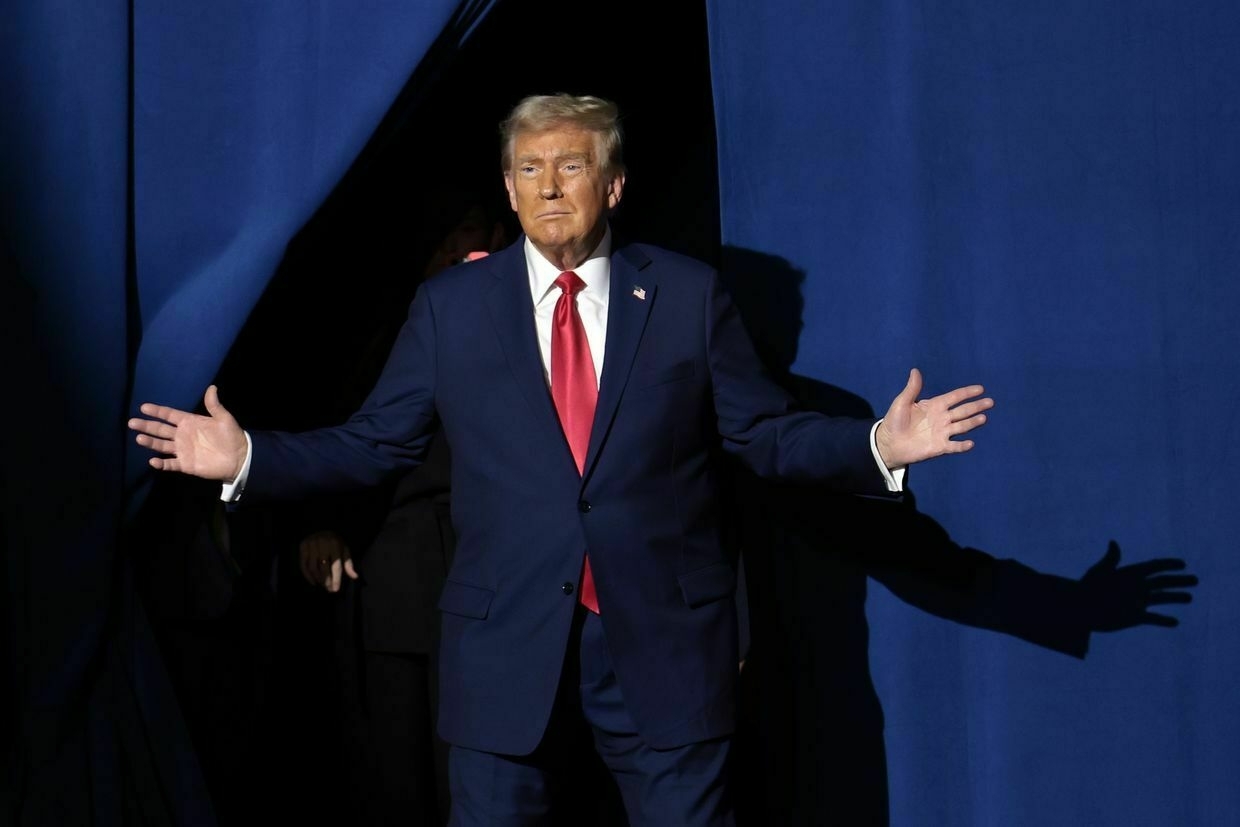
President Donald Trump said on April 12 that negotiations for a ceasefire between Russia and Ukraine were “going fine,” but emphasized that a resolution must come soon.
Speaking to reporters aboard Air Force One, Trump added that “there’s a point at which you have to either put up or shut up. We’ll see what happens, but I think it’s going fine."
Trump’s comments followed a high-level meeting in Russia, where his envoy Steve Witkoff met with Russian President Vladimir Putin on April 11. The visit was part of ongoing efforts by the Trump administration to broker a ceasefire between the two countries.
“I think Ukraine-Russia (talks) might be going OK. And you’re going to be finding out pretty soon,” Trump said.
One month ago, Ukraine agreed to a full 30-day ceasefire in the U.S.-mediated talks in Jeddah. In the meantime, Russia has not only refused a full ceasefire, but has also continued to barrage Ukrainian cities with attacks and repeatedly violated the partial truce established in mid-March.
Some critics say Moscow is stalling and has no real interest in halting the fighting, especially as it continues advancing on the battlefield. The Kremlin has not publicly committed to the terms agreed to by Ukraine.
While Trump has at times criticized Zelensky and Ukrainian leadership, he has also recently expressed frustration with Russia.
In a social media post on April 11, Trump said Russia “has to get moving.”
“Too many people are dying thousands a week, in a terrible and senseless war – A war that should have never happened, and wouldn’t have happened, if I were President!!!"
On April 10, Trump extended the national emergency and the associated sanctions against the Russian government for a further year, according to a document from the U.S. Federal Register.
These parents and children were killed by Russia after Kyiv agreed to 30-day ceasefireOne month ago, Ukraine agreed to a full 30-day ceasefire in the U.S.-mediated talks in Jeddah, and Russia did not. Russia has soon intensified its attacks against Ukrainian civilian infrastructure. Russian attacks on Ukraine have killed over 160 civilians in March alone. According to the United Na…The Kyiv IndependentDaria Shulzhenko
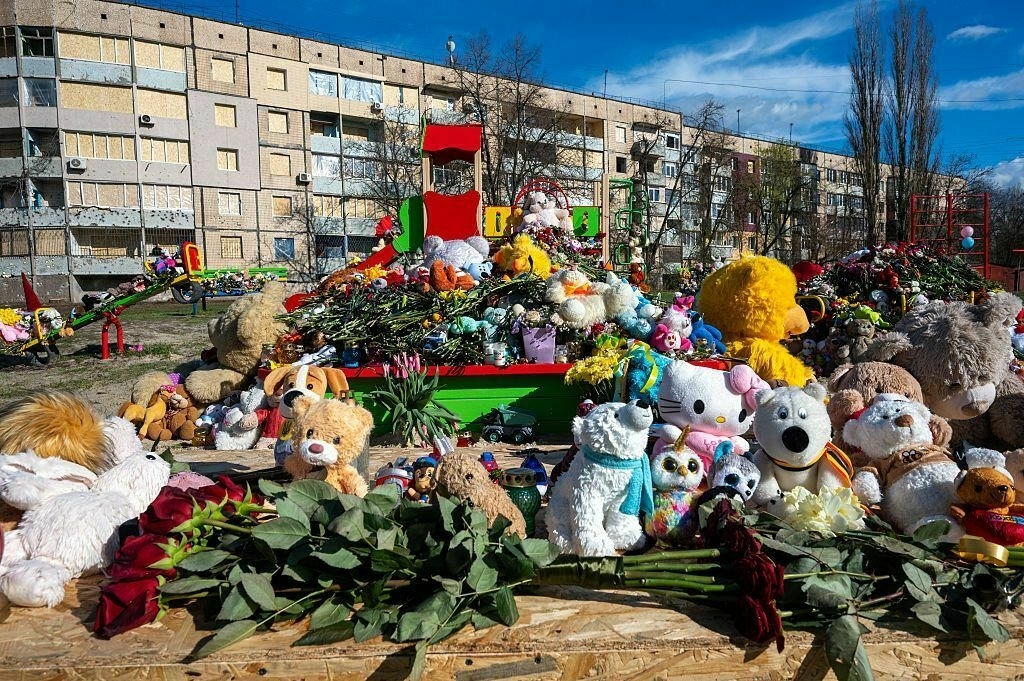
-
Trump extends Biden's sanctions executive order against Russia
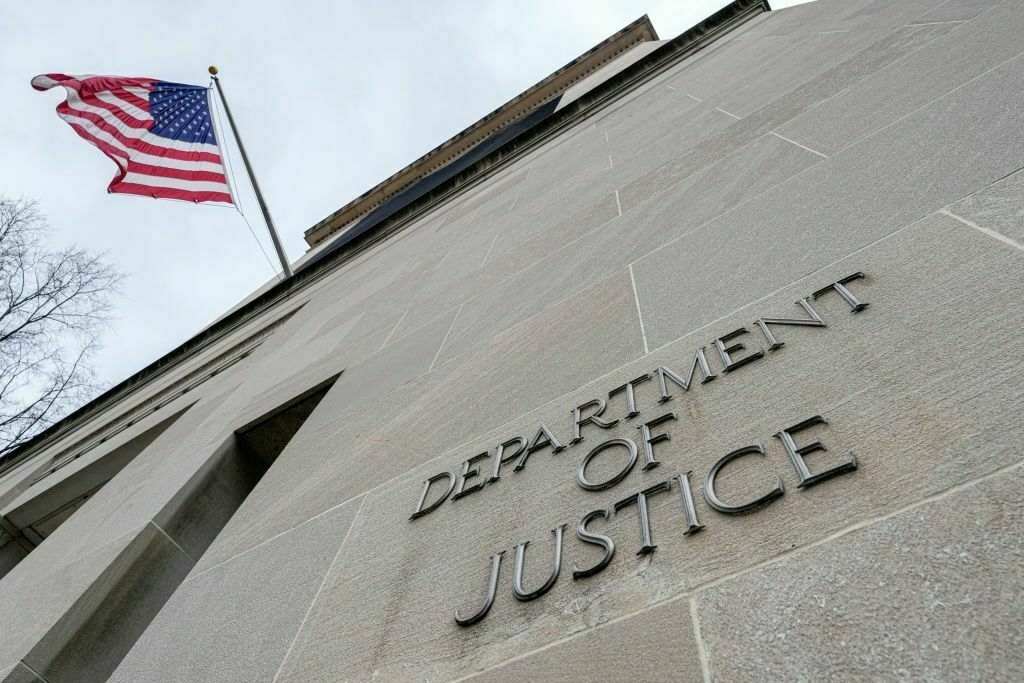
U.S. President Donald Trump signed an executive order extending for one year the sanctions against Russia originally imposed by former President Joe Biden in April 2021 over Russia’s harmful foreign activities, according to an April 11 document from the U.S. Federal Register.
“Specified harmful foreign activities of the Government of the Russian Federation continue to pose an unusual and extraordinary threat to the national security, foreign policy, and economy of the United States. For this reason, the national emergency must continue in effect beyond 15 April 2025,” the document says.
The extension cites continued Russian actions such as interference in democratic institutions, cyberattacks, repression of dissidents and journalists, and violations of international law, including threats to territorial integrity.
In recent days, the U.S. president has renewed his push for a ceasefire. Axios reported on April 11, citing an undisclosed source, that Trump could impose additional sanctions on Russia if a ceasefire with Ukraine is not reached by the end of April.
Despite this, the Trump administration has not yet imposed any major sanctions on Russia. At the same time, the White House previously paused military assistance to Ukraine in March, pressuring Kyiv to agree to a mineral resource deal.
U.S. representatives have also recently met on numerous occasions with their Russian counterparts to discuss renewed economic and diplomatic cooperation between the countries after ties were severed in recent years.
Trump ‘frustrated with both sides’ amid ongoing peace talks, White House says“I think the president has been quite clear that he’s been continually frustrated with both sides of this conflict,” White House Press Secretary Karoline Leavitt said. ”(Trump) wants to see this fighting end, he wants the war to end, and we believe we have leverage in negotiating a deal.”The Kyiv IndependentDmytro Basmat
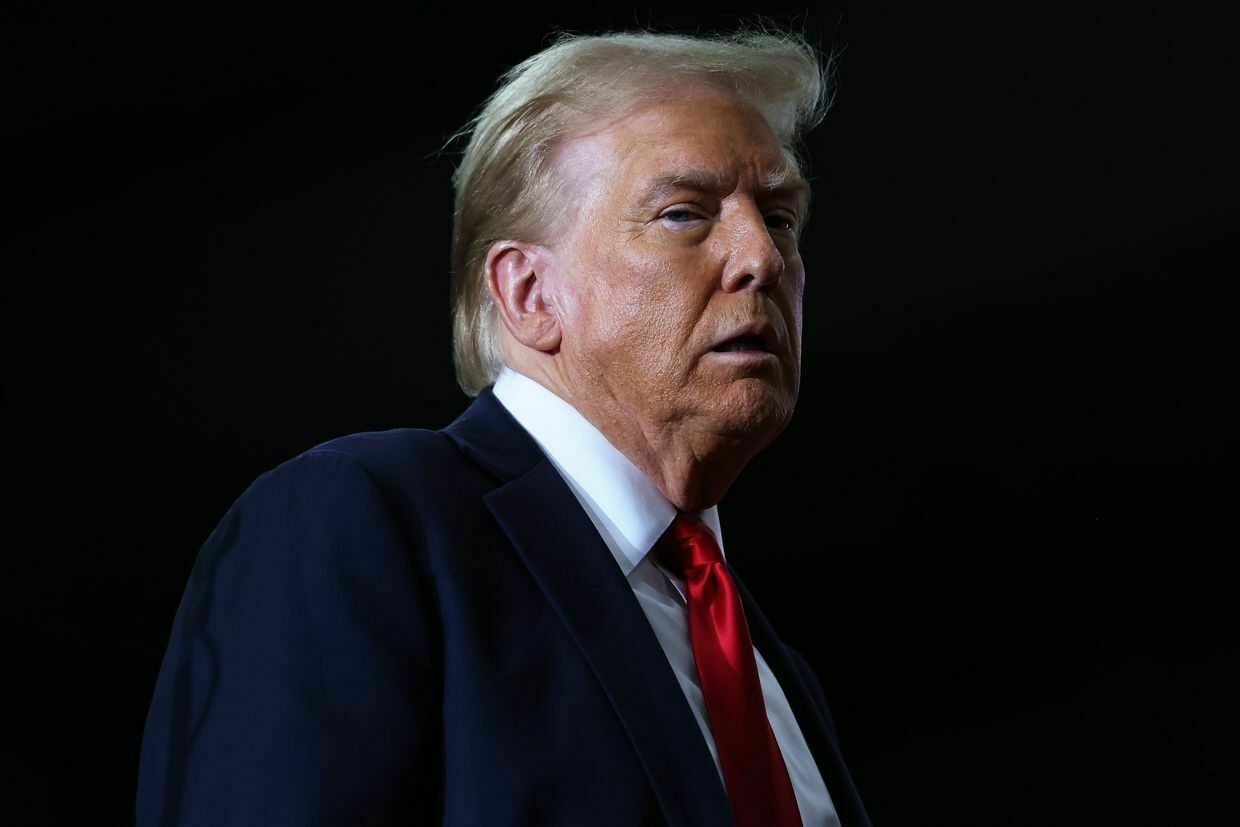
-
US and Iran conclude first round of indirect talks in Oman over nuclear program negotiations
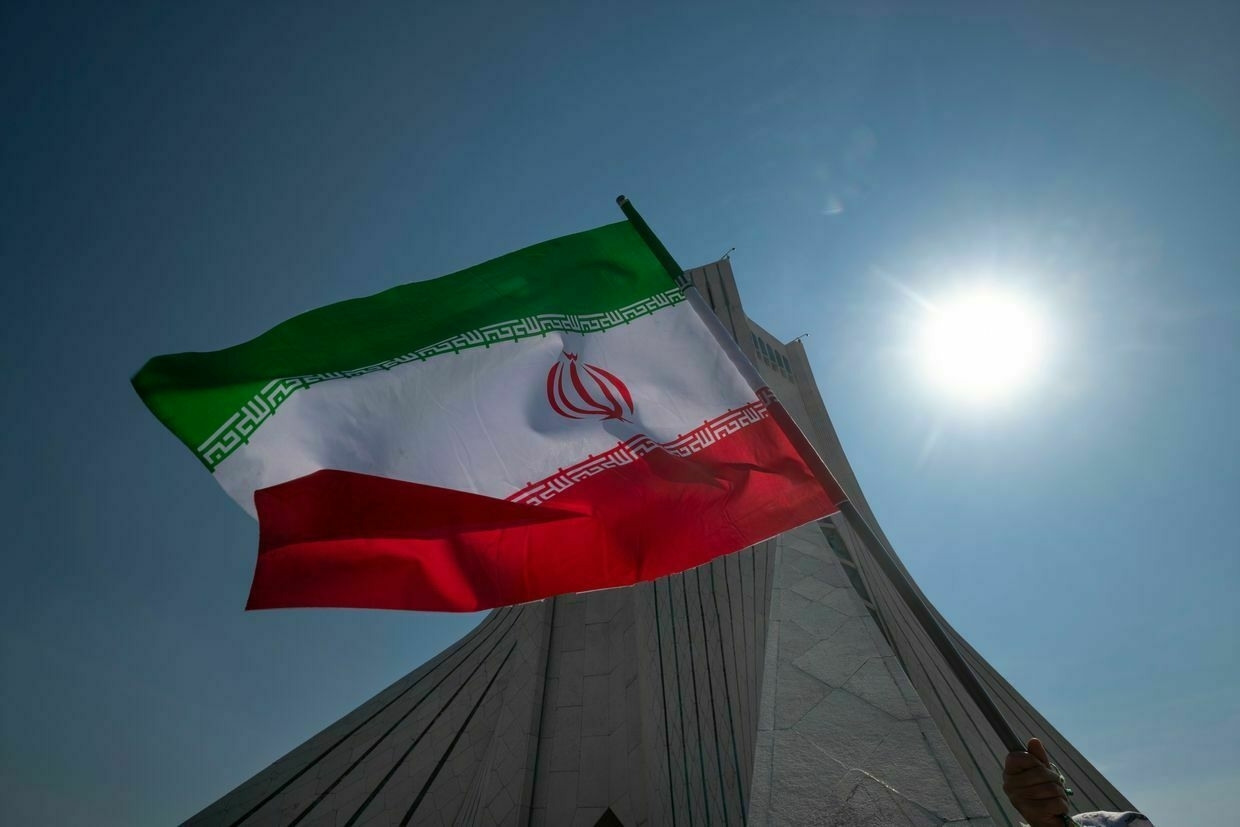
Iran and the U.S. held indirect talks in Oman on April 12, according to Iranian media sources.
This marks the first round of negotiations between Tehran and the current U.S. Donald Trump administration, following years of heightened tensions.
The negotiations aimed to address Iran’s advancing nuclear program, amid U.S. threats of potential military action if no agreement is reached.
Iranian officials described the talks as productive, though there has been no official comment from the U.S. side.
“The American side tried to show its willingness for a fair agreement,” Iranian Foreign Minister Abbas Araghchi said.
According to the government-affiliated Iranian Tasnim news agency, Araghchi said that both sides are close to establishing a framework for formal negotiations and agreed to reconvene next week, likely next Saturday.
“The atmosphere of today’s session indicated continuity,” Araghchi commented.
The talks were mediated by Oman, with delegations in separate rooms exchanging messages through Oman’s foreign minister—an arrangement preferred by Iran, in contrast to U.S. calls for direct talks.
Araghchi confirmed that the U.S. and Iranian delegations briefly interacted after the meeting, which lasted over two and a half hours.
Previously, Russia has expressed interest in mediating the relationship between the U.S. and Iran.
Russia and Iran have deepened ties since the start of the full-scale invasion. Notably, Iran has provided Russia with thousands of Shahed drones used in attacks against Ukrainian cities, as well as short-range ballistic missiles.
Russia agrees to help US in negotiations with Iran over nuclear program, Bloomberg reportsDonald Trump voiced his interest in negotiations with Iran to Vladimir Putin during their phone call in February.The Kyiv IndependentKateryna Hodunova
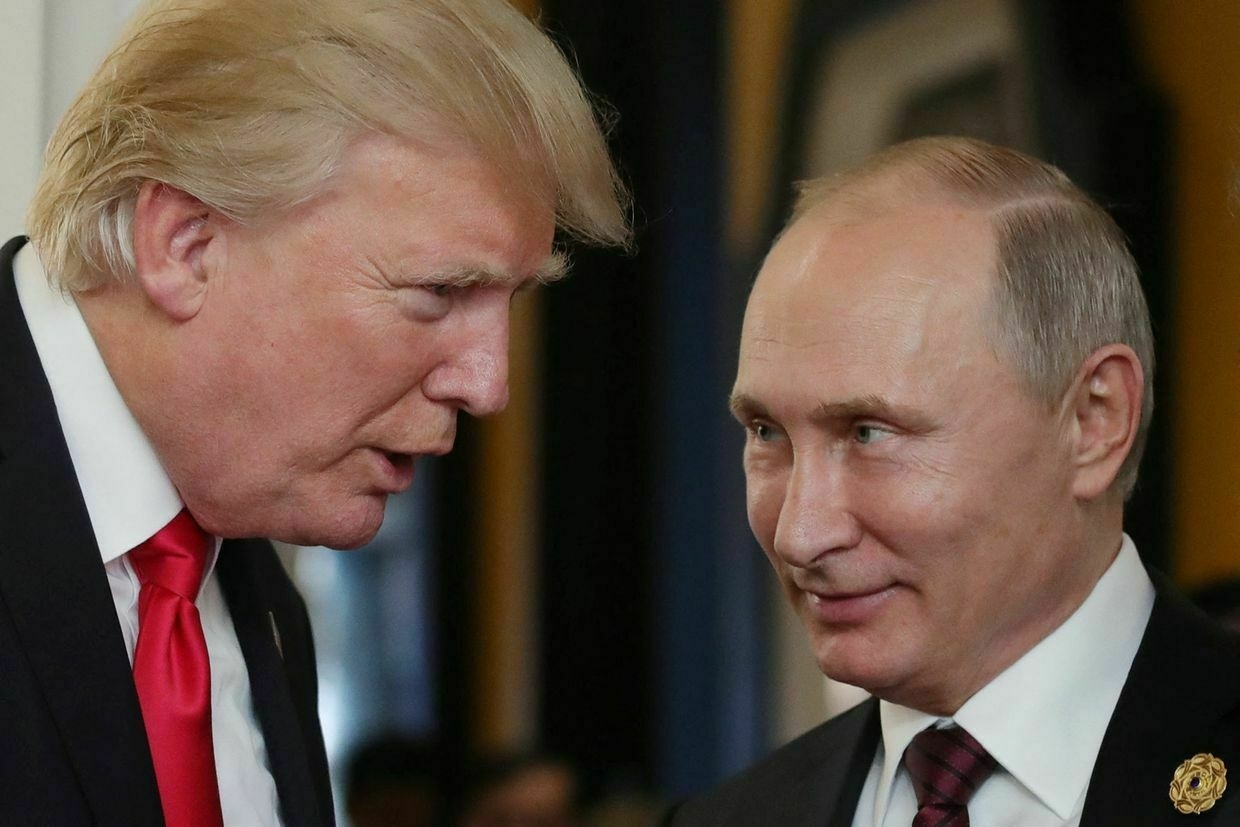
-
Russian drone attack kills 1, injures 2 in Kherson Oblast
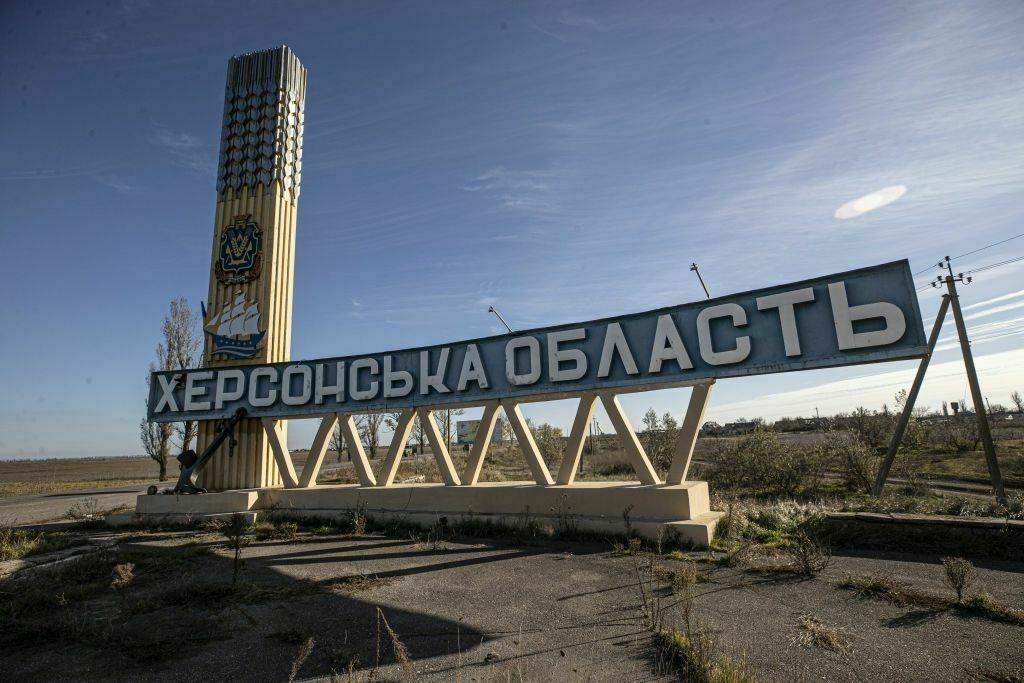
A Russian drone strike killed one man and injured two others in Ukraine’s southern Kherson Oblast, according to Kherson Governor Oleksandr Prokudin.
On April 12, Russian forces attacked a civilian vehicle in the Dniprovskiy district, Prokudin said. The drone dropped explosives on the car, fatally wounding a 27-year-old man.
Two other men, aged 30 and 49, sustained blast injuries, concussions, and shrapnel wounds. They were taken to the hospital and are in moderate condition, according to Prokudin.
Attack comes as Moscow continues to reject a U.S.-proposed 30-day ceasefire aimed at halting hostilities. Kyiv has said it is ready to accept a full ceasefire if Russia also agrees to the terms. It has now been more than a month since the Kremlin first dismissed the ceasefire proposal.
Ukraine war latest: US envoy Witkoff proposes giving Russia ‘ownership’ of Ukrainian regions, Reuters reportsKey developments on April 11: * US envoy Witkoff proposes giving Russia ‘ownership’ of Ukrainian regions, Reuters reports * Trump urges Russia “to get moving” to end war against Ukraine * Putin meets U.S. envoy Witkoff to discuss Ukraine, Kremlin says * “Several hundred” Chinese nationals fight…The Kyiv IndependentThe Kyiv Independent news desk
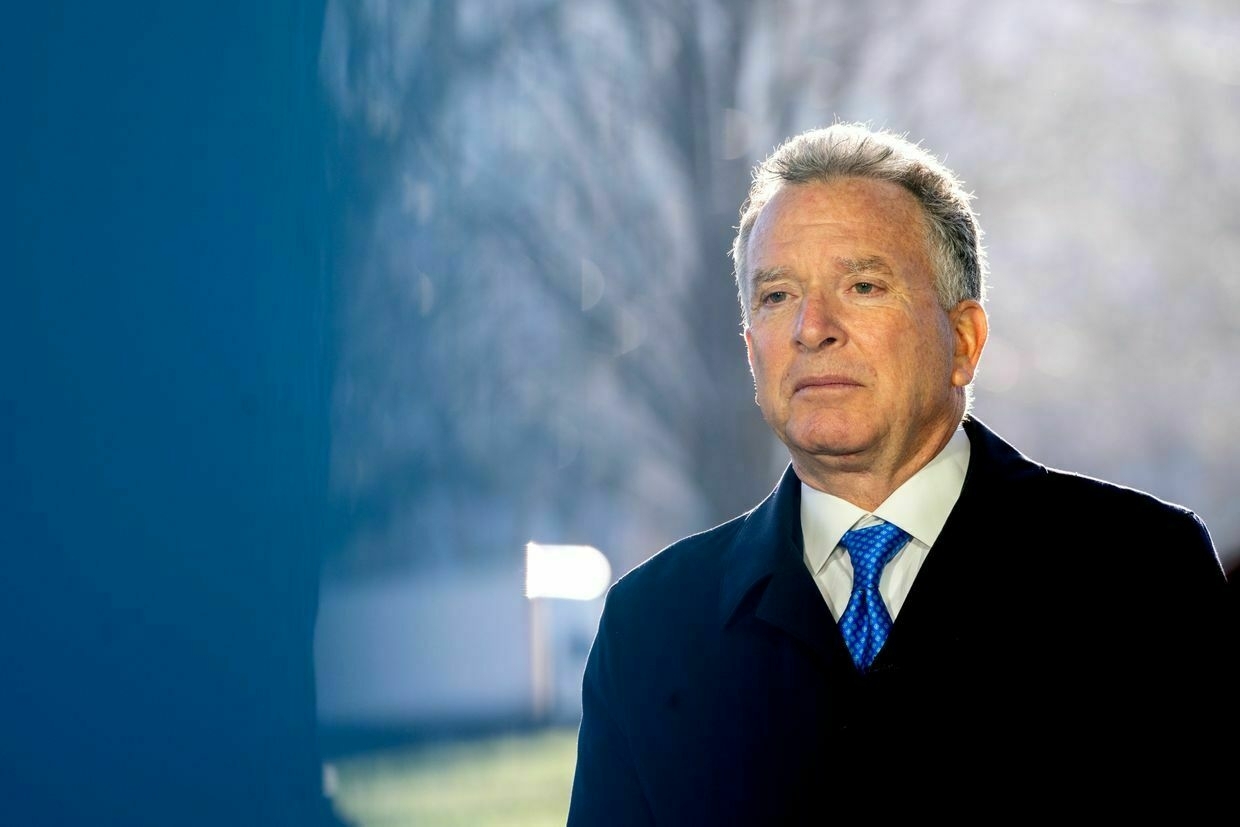
-
Forget Ovechkin and Washington. The Kyiv Capitals are playing for the survival of Ukrainian hockey
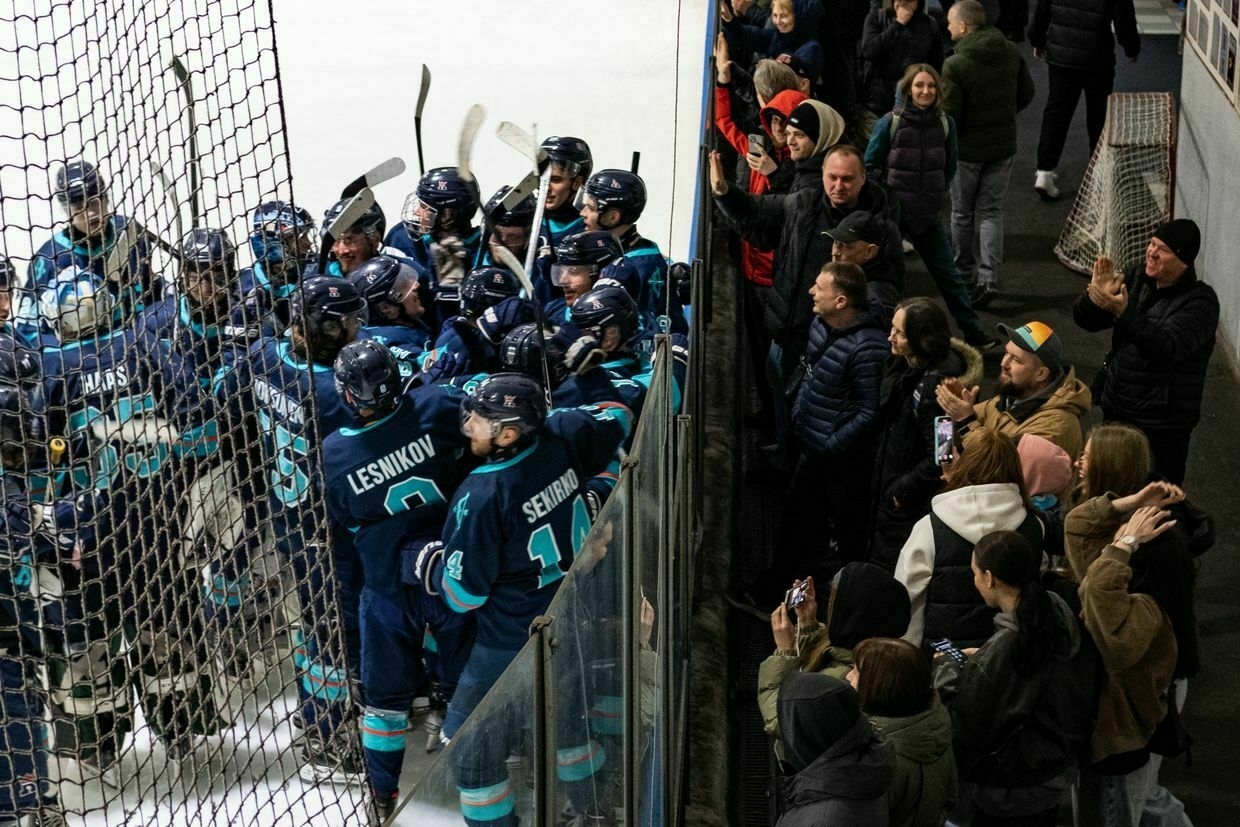
It’s late in the second period of game four of the Ukrainian national hockey championship on April 2, and the upstart Kyiv Capitals, only in its second season, leads against established Hockey Club (HC) Kremenchuk and its star-studded roster.
The Capitals captain, Serhii Chernenko, steals the puck and sends it behind the net to his teammate, a second before Kremenchuk forward Vladyslav Braha slams him against the boards.
The ref blows his whistle, but it’s not for a penalty. An air raid alert signaling a potential Russian attack brings the high-stakes game to a halt, a stark reminder of Russia’s war happening outside the rink. Fans file outside the Kremenchuk Iceberg Arena in Poltava Oblast, a five hour drive south of Kyiv, stretching their legs and waiting for the threat of ballistic missiles to abide.
Playing ice hockey in Ukraine today is unlike competing in any other hockey league worldwide. Besides the game interruptions, the sport heavily relies on civilian infrastructure: No ice rink, no hockey.
Ice rinks haven’t escaped Russia’s campaign to bombard Ukrainian civilian sites. From 2022 to 2024, 725 sports facilities have been damaged or destroyed in Ukraine. Some of Ukraine’s most celebrated ice rinks lie in ruins.
Rinks also require electricity for refrigeration and are more challenging to build – and rebuild – than facilities for most other sports. Russia has damaged more than 63,000 energy infrastructure facilities in the past three years, according to the Energy Ministry, leading to long-term blackouts particularly during winter months.
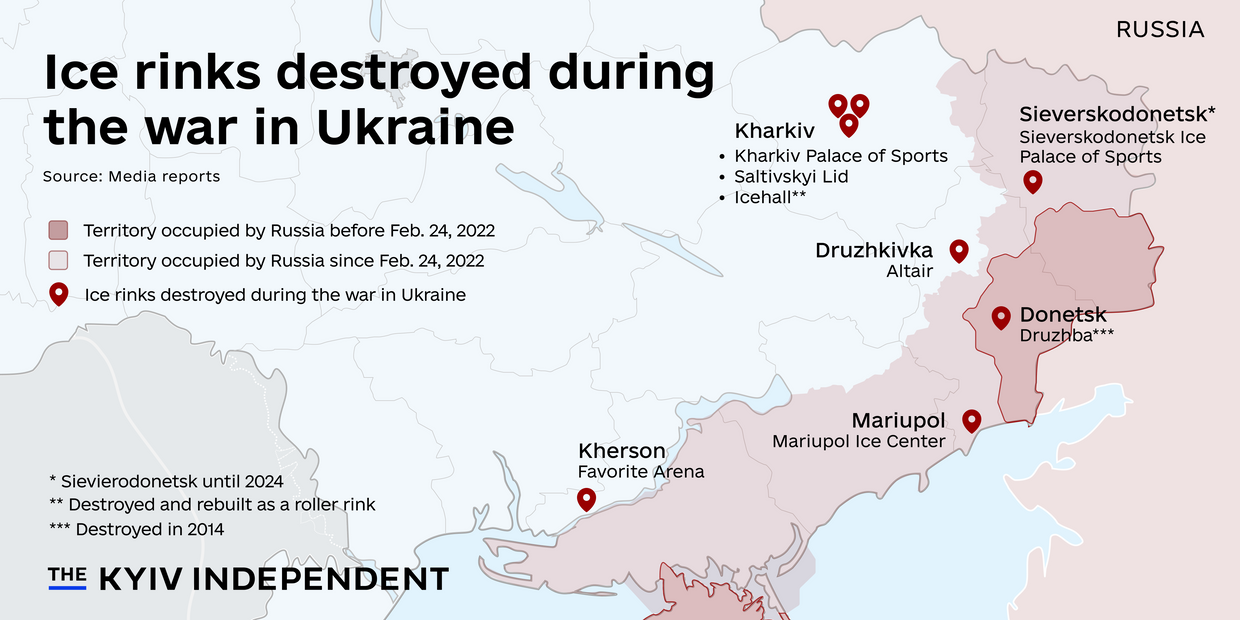
Ice rinks destroyed during the war in Ukraine. (Lisa Kukharska / The Kyiv Independent) The impact of war on Ukrainian hockey is embodied by the banners hanging from the rafters over Kremenchuk’s Iceberg Arena, where the logos of only five professional teams are represented in this year’s professional league.
Missing is the powerhouse team HC Donbas, winner of five of the previous six Ukrainian hockey championships before the unfinished 2022 season was interrupted by Russia’s full-scale invasion. HC Mariupol is also missing, whose brand-new home ice rink was unveiled by President Volodymyr Zelensky in 2020 and had “amazing” ice, players who skated there recall. HC Kramatorsk, who played one complete season in their yellow, black, and white uniforms before Russian troops abruptly ended their second, is also absent.

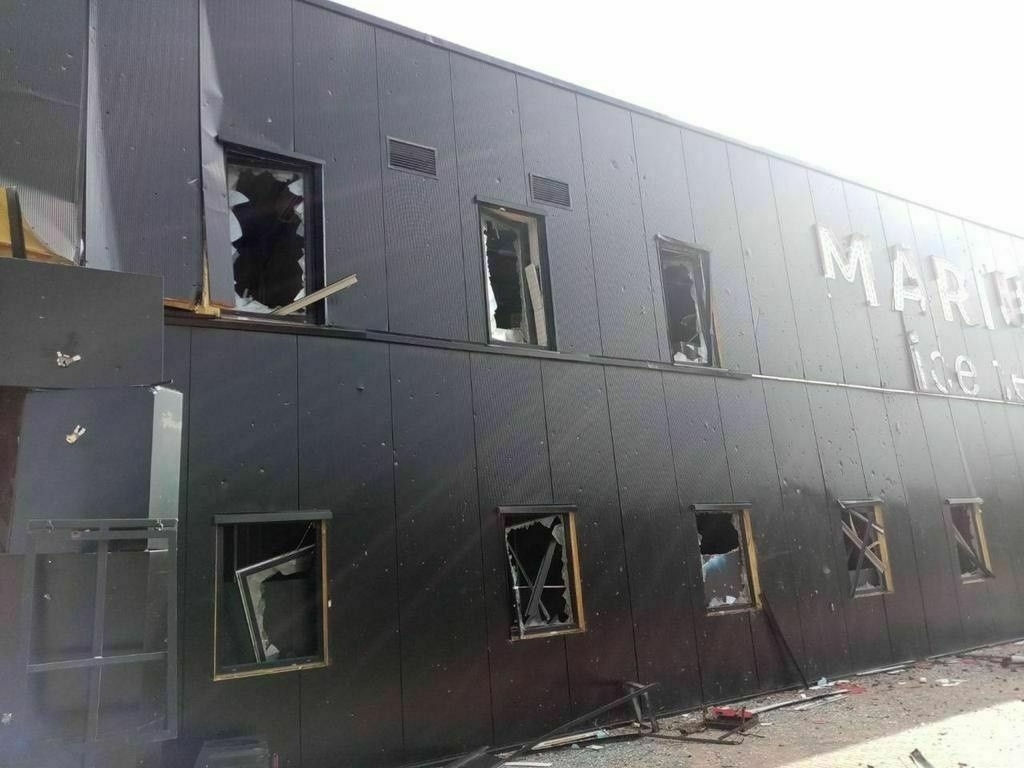
The Mariupol Ice Center before (L) and (R) after an attack in Mariupol, Donetsk Oblast during Russia’s three-month-long siege of the city between Feb. 24, 2022 and May 20, 2022. (HC Donbas/ Telegram) All three teams were based in Donetsk Oblast, where Moscow now controls more than 70% of the territory. Heavy Russian attacks blanket the remaining 30%.
It was against this backdrop that Kyiv Capitals CEO Anastasia Zimina and her father, former hockey player Eugene Zimin, decided to create and fund a new team in early 2023. It took about six months, she estimates, to go from idea to reality.
“We had no plans before the war whatsoever” to form a new team, Zimina tells the Kyiv Independent. When it was clear that Russia was trying to erase Ukrainian people and culture, establishing a new team felt like one way to “defy” a historical pattern of cultural losses during war and have something to grow instead, she said. “The main idea was to give back and restore Ukraine through sports.”
The story of the Kyiv Capitals is more than just one of a team born during war, with players who have survived Russian occupation and practices held on melting ice, in the dark, after Russian missiles knocked out the city’s power.
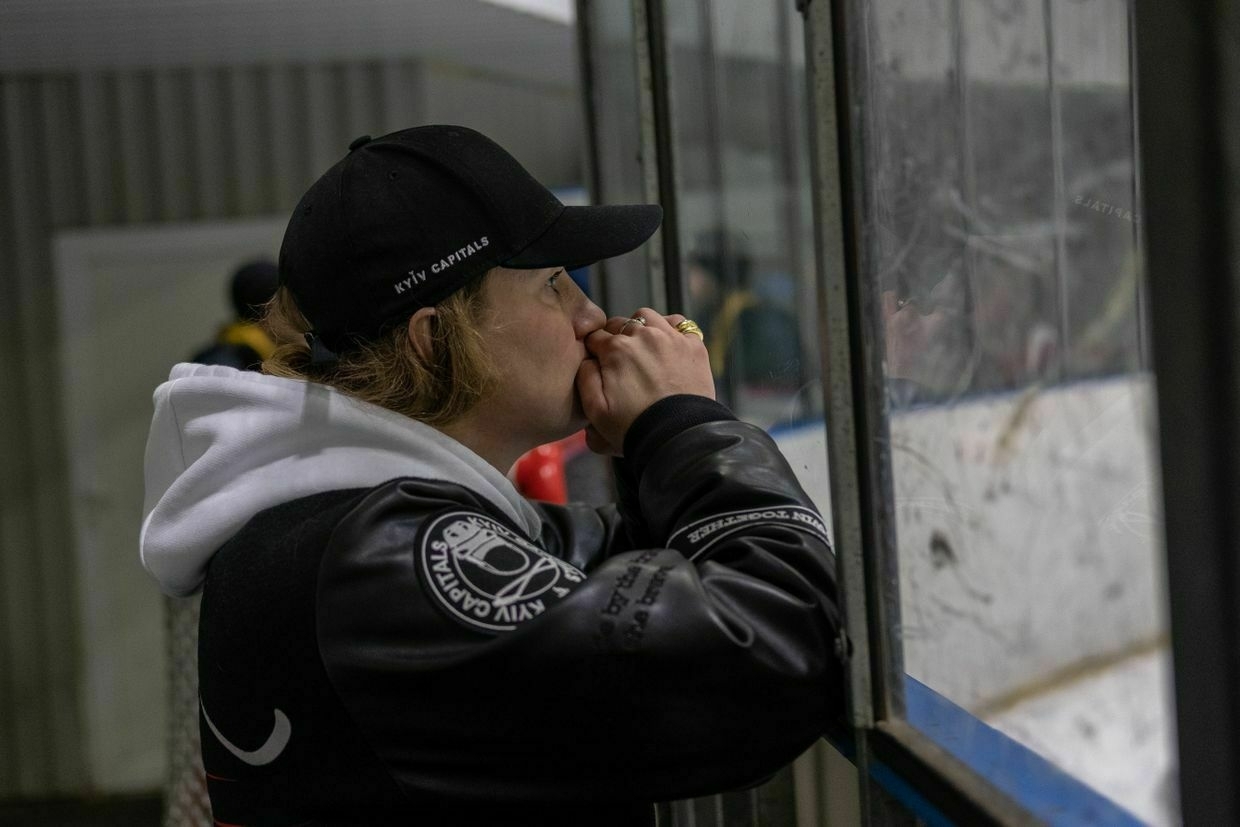
Anastasia Zimina, CEO of the Kyiv Capitals, watches the Capitals in the first game of the Ukrainian national championship series. (Chris Jones / The Kyiv Independent) It’s the story of a team playing with such energy that once the puck drops, it’s not about the war — it’s about the team, it’s about the ice, it’s about Capitals’ forward Sevastian Karpenko slapping the puck past the goalie’s right hip six minutes into overtime at their home rink, and the standing-room-only crowd cheering so loudly that you can feel the building vibrate through the cement sidewalk outside.
From ponds to the global stage: A century of Ukrainian hockeyThe first Ukrainian ice hockey match took place more than a hundred years ago, on a pond rink in Lviv in 1905. Spectators unfamiliar with the sport drank hot tea and mead and “liked what they saw,” according to a news report from the time.
In 1910, Ukrainian professor Ivan Bobersky published the first Ukrainian-language rules of ice hockey. The first local championship, held in 1926, involved eight Lviv-based teams, including two Jewish clubs. The victor was Pohon, winning 3:1 against Charny.
Like much of Ukrainian culture, ice hockey suffered when the Soviet Army took over parts of Europe during World War II. In one dramatic incident in 1940, Soviet troops occupied an area in present-day Chernivtsi Oblast, which was, at the time, an ice hockey hub and part of Romania. The local players were labeled “nationalist bourgeoisie” after defeating the Red Army’s team several times, forcing most of the athletes to emigrate to evade arrest. Other teams also dissolved or were renamed.
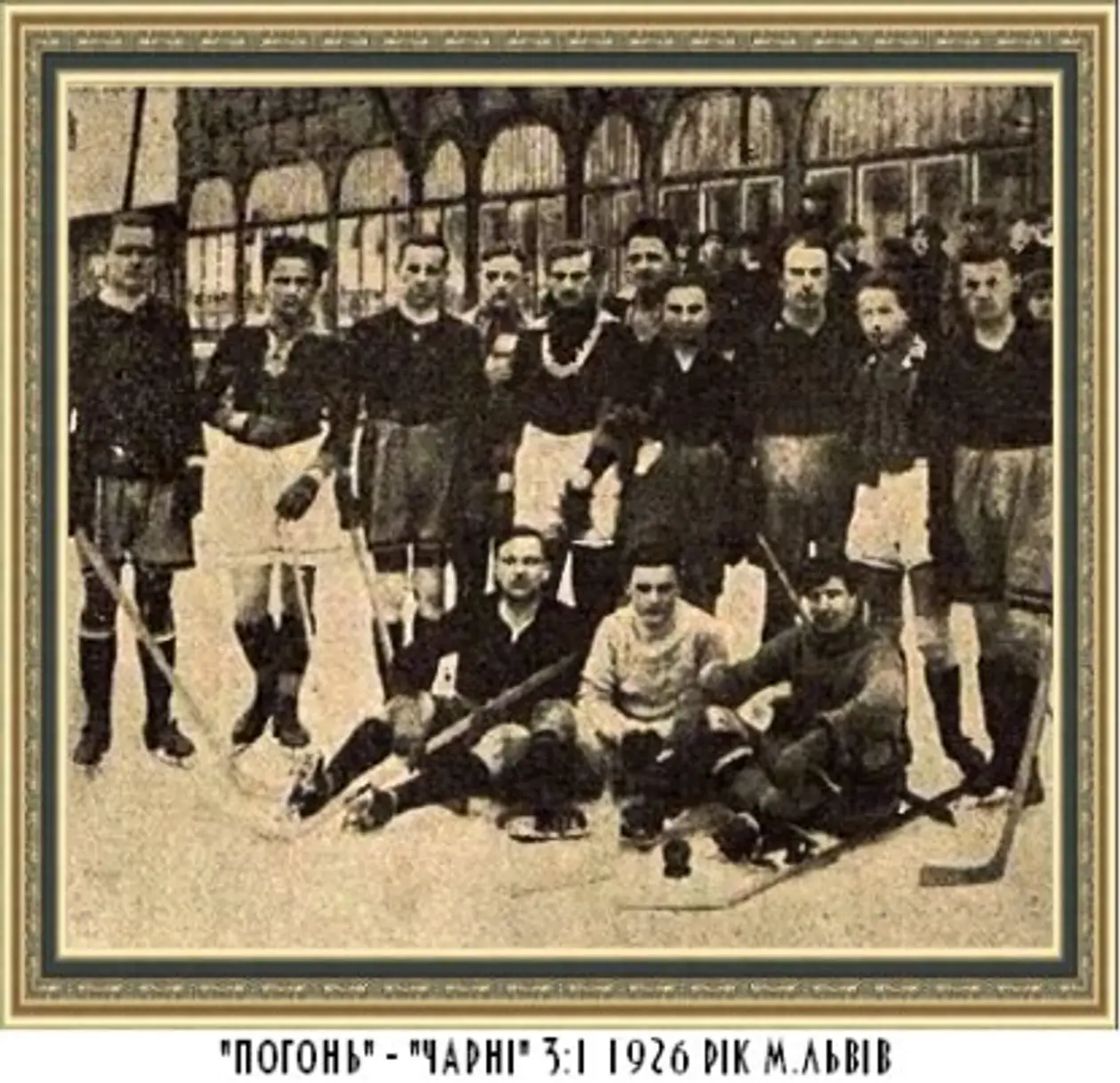
The first local championship in Lviv, Ukraine, in 1926. Pohon beat Charny 3:1 in the final. (Tribuna) Nonetheless, Ukrainians continued to play ice hockey and produce world-class athletes. By the 1950s, the Ukrainian SSR hockey league was among the most competitive in the Soviet Union.
After the Soviet Union fell in 1991, Ukrainians also made a name for themselves globally by playing in the National Hockey League and European leagues. Ruslan Fedotenko and Dmitri Khristich are among Ukrainian NHL players who have won the Stanley Cup. One of the all-time greatest hockey players, Wayne Gretzky, has Ukrainian ancestors.
A sport and country under attackWhen the Kyiv Capitals offered team captain Chernenko a spot, he didn’t know what to expect from a team with no track record. “I and the coaching staff probably had some doubts, but everything worked out fine,” he said.
Chernenko, the most experienced player on the team at 41, first laced up his skates at six years old, when his father walked him and his older brother to an ice rink a few minutes from his childhood home in Kyiv.
He represented Ukraine on the global stage several times as part of the youth national team before playing on the country’s 2011 national team, which won bronze at the D1 World Championship. He later played on Romanian teams before returning to play in Ukraine.
On the ice, Chernenko is a playmaker, focused on finding open players and disrupting defenders, racking up 23 assists and seven goals in the regular season. His discipline and experience lead some to view him practically as an extra coach, and he can often be seen mentoring teammates on and off the ice.
"Arenas are destroyed. There are fewer teams, and so, fewer players. Children are unable to participate."
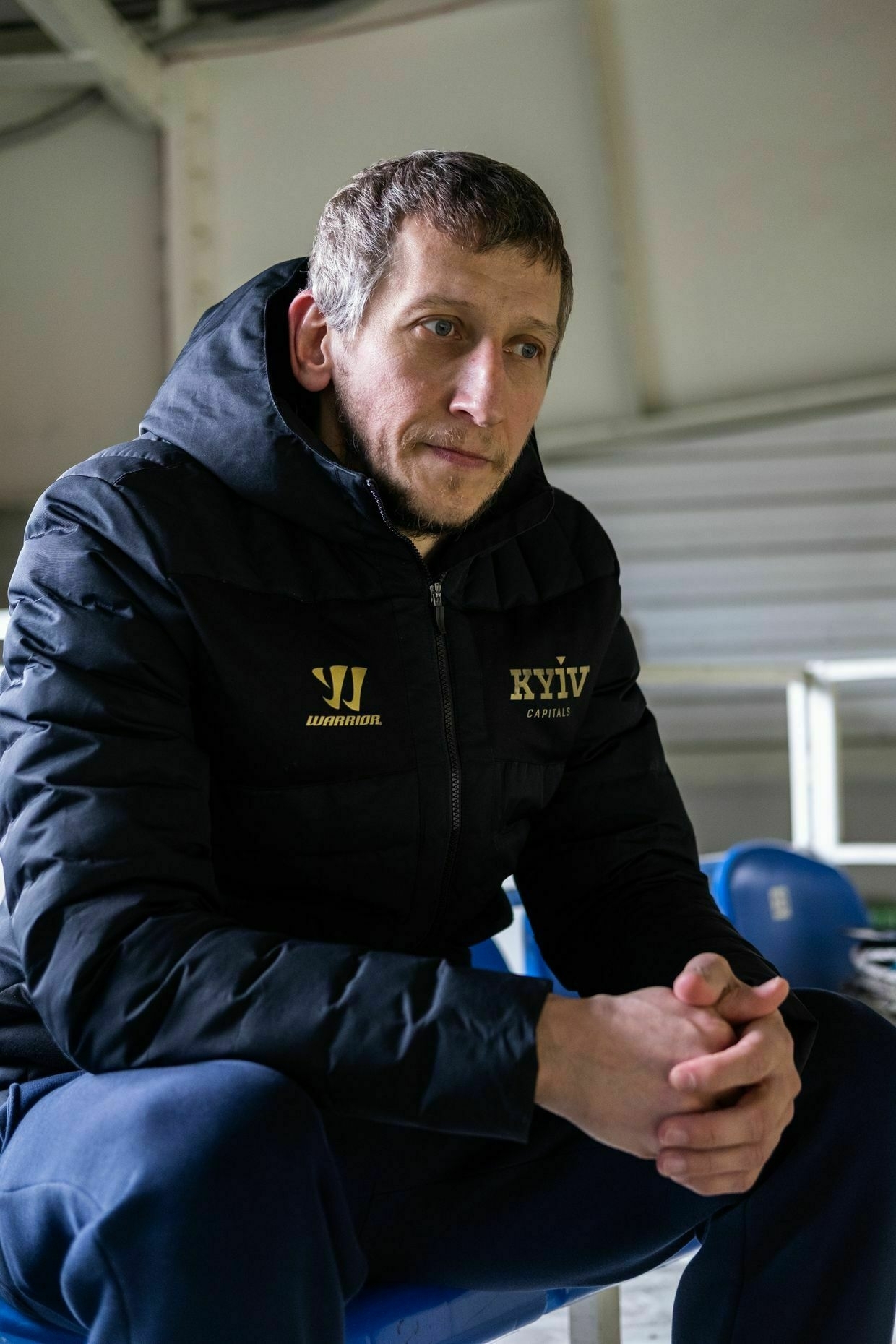
Serhii Chernenko, the captain of the Kyiv Capitals, sits for a portrait at the Shalett ice rink in Kyiv, Ukraine on April 10, 2025. (Chris Jones / The Kyiv Independent)
With decades of hockey experience, Chernenko has watched how the country’s competitiveness has suffered under attack.
“Ukraine was once in the top division, there was a lot of competition, and there were strong players. They played abroad and within the country,” recalls Chernenko. “Then, war. Arenas are destroyed. There are fewer teams, and so, fewer players. Children are unable to participate.”
Any professional Ukrainian hockey player can rattle off the names of the destroyed arenas.
The first to go was Druzhba in Donetsk, ransacked and torched by armed militants during the Donbas War in March 2014. HC Donbas was forced to relocate from the rink to the Altair Ice Arena in Druzhkivka, also located in Donetsk Oblast.
Then the full-scale invasion began, and that rink, too, was destroyed by a Russian X-55 cruise missile.
Over the course of the war, rinks in Mariupol, Sieverskodonetsk, Kherson, and three rinks in Kharkiv — including an Olympic training base that hosted two hockey teams — have also been ruined by shelling or occupation.
Since the full-scale invasion, the number of professional hockey teams in Ukraine has halved.
“For the level (of competition) to grow, we need the arenas that have been destroyed. We hope that they will be rebuilt,” Chernenko said.
‘The problem is people and children are leaving’An even more threatening issue, say players, is the talent that has left. Ukraine’s population has fallen by an estimated 10 million since 2022 as Ukrainians flee the war abroad or are killed.
Not only is Ukraine lacking the key hockey-playing demographic of fighting-age young men — it’s also short on the next generation of up-and-coming players.
“A lot of kids have left. A lot,” says Kyiv Capitals Sports Director Oleg Grushetsky. The Kryzhynka hockey school, he notes, a youth program that partners with and shares a rink with the Capitals in Kyiv, enrolled around 350 kids before the full-scale invasion. Today, it’s dropped down to 122.
Approximately 60% of Ukraine’s hockey-playing youth have been forced to abandon their homes, estimates Ukrainian Hockey Dream, a charity that supports youth hockey.
Ukraine once boasted one of the top youth hockey boarding schools in Europe, located in Donbas. The competitive program attracted players from outside Ukraine who lived together and went to school together, training in hockey before and after classes.

Mykyta Oliynyk, a forward for the Kyiv Capitals, rests after practice the day before the final game of the Ukrainian national championship series. (Chris Jones / The Kyiv Independent) “We had everything. I hadn’t seen anything like it anywhere else in Ukraine,” says Mykyta Oliynyk, a rising left-handed forward on the Capitals team who trained there from ages 13 to 16. “It was at a very high level. There were many foreigners, guys from Russia and Moldova.”
When he was 16, the war in Donbas began, and Oliynyk left the school to complete his training in Kharkiv, where he grew up. “I’m lucky that I had somewhere to go,” he says.
Oliynyk, 26, led the Ukrainian league last year for the most assists in the Capitals’ inaugural season. His skating skills and speed point to top-tier training, which sports director Grushetsky attributes in large part to his experience at the now-closed Donbas Academy.
“The problem today is people are leaving, children are leaving,” says Grushetsky. “I see the main mission of this whole project — all of this, our Ukrainian hockey — is to create conditions to keep people here and persuade them to return.”
Attracting talent from abroadRecruiting foreign players is tough but not impossible.
One of the fastest players on the ice is Sam Hu, a Canadian-Chinese forward who previously played in the Kontinental Hockey League and East Coast Hockey League. He joined the team with just two months left in the season but has already become one of the standout players, outskating defenders on three-to-one breakaways.
Hu was looking for a new opportunity when a former coach connected him with the Capitals, making him the team’s fourth international player.
He had never stepped foot in Ukraine before the team brought him on board but finds himself “proud and impressed” by the resilience of the people he’s met.
When asked whether he hesitated to come to Ukraine during the war as other foreign players have, he replies, “To be honest, I wasn’t thinking too much about anything else. I just considered the hockey.”
The style in Ukraine is more free-flowing than in other leagues he’s competed in, he says, with less emphasis on set plays and star performers. “It’s not as system-oriented as some other places I’ve played. When it’s a little more unpredictable, it can be a little more exciting.”
“I have not had this much fun coming to the rink in probably five or six years,” Hu adds. “A lot of it is how the players treat each other. There’s a good culture on this team.”
‘Russians, we did it’When the Kyiv Capitals make it to the playoffs against Odesa Storm on March 15, just over a dozen loyal fans make the trip to the game in Odesa, around 274 miles (441 kilometers) from Kyiv. On the official game livestream, you can hear them chant a three-beat rhythm of “Ca-pi-tals.”
Among them are Albina Shatokhina and Maria Filinchuk, two teenage figure skaters who never miss a home game and train at the same rink as the Capitals.
“Everyone should understand that it is very difficult to train now because of the air raids and blackouts,” Shatokhina tells the Kyiv Independent later in Kyiv. “Despite the war, they are still training and trying to improve Ukrainian hockey.”
“And it’s working,” Filinchuk adds. “A lot of people have gotten to know this team last season.”
With the game tied and three minutes left, Capitals forward Andrii Kryvonozhkin wrestles the puck free behind Odesa’s net. He passes it to Oliynyk, who quickly passes through the Odesa defenders to Karpenko for a one-tap goal. The Kyiv fans erupt into cheers over what will be the game-winning goal, clinching the team a spot in the finals. When the buzzer sounds, the rest of the team pours onto the ice in celebration.
“The only thing worth remembering is Russians did all this.”
Three days later, Russia announces that Russian President Vladimir Putin and U.S. President Donald Trump have discussed organizing ice hockey games between the two countries — widely seen as a political concession to Russia. Russia and Belarus have been banned since 2022 from competing in international hockey competitions over the invasion of Ukraine.
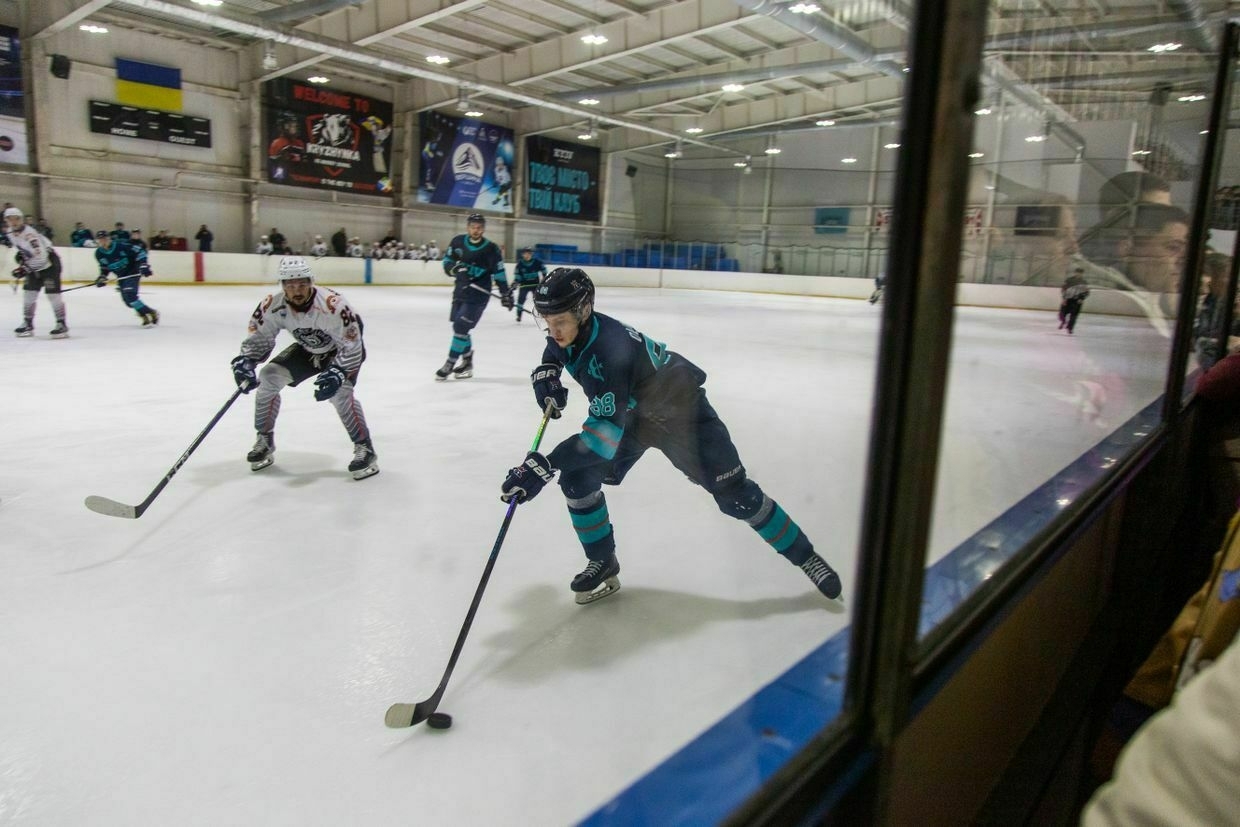
Mykyta Oliynyk, a forward for the Kyiv Capitals, moves the puck down the ice in Game 5 of the Ukrainian national championship series at the Shalett ice rink on April 5, 2025. (Chris Jones / The Kyiv Independent) 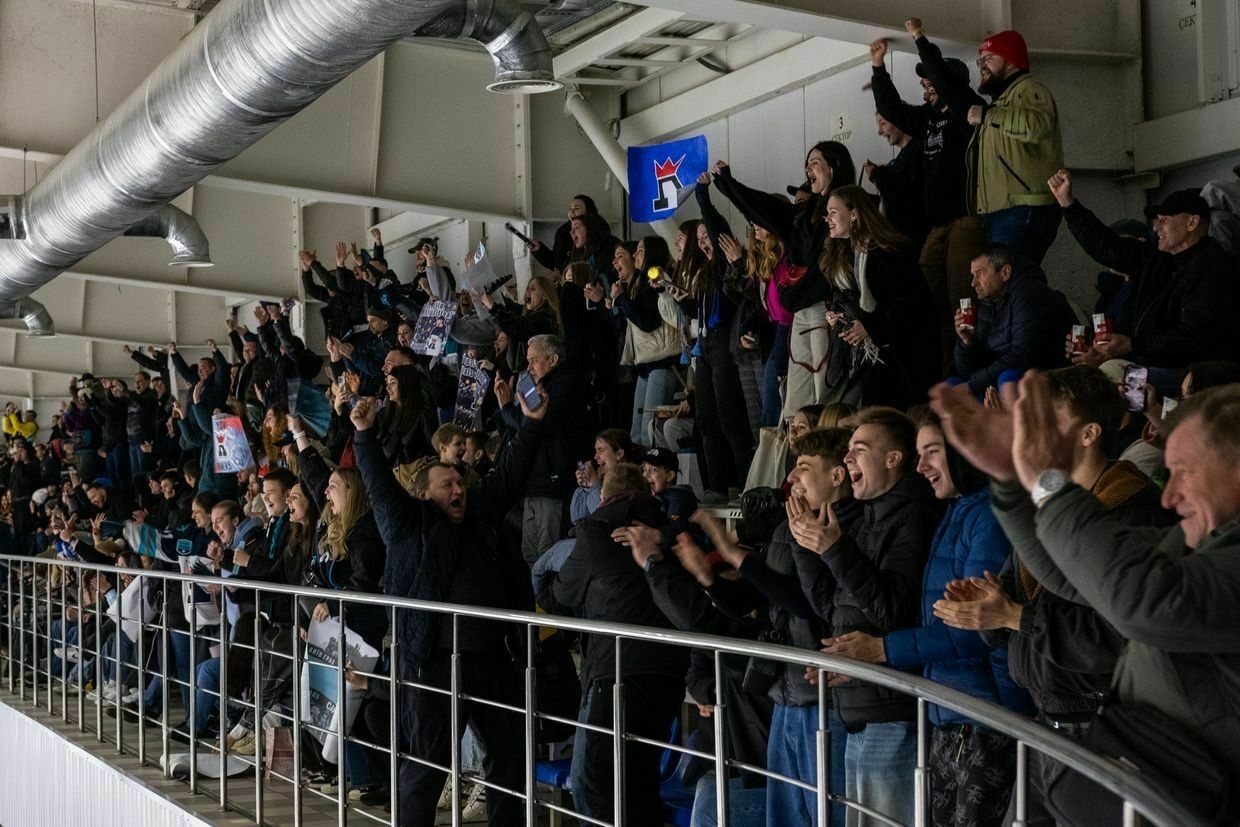
Fans cheer the Kyiv Capitals' 3-2 win over HC Kremenchuk in Game 1 of the national finals in Kyiv on March 26, 2025. (Chris Jones / The Kyiv Independent) The spotlight on the intersection of politics and ice hockey has only intensified in recent weeks because of the other Capitals — the Washington D.C. team playing on the other side of the globe.
After Washington Capitals player Alexander Ovechkin surpassed Wayne Gretzky’s record of 894 goals scored in the NHL on April 6, Ovechkin’s public friendship with Putin sparked headlines and criticism from Ukrainians and pro-Ukrainian NHL fans. The Russian player celebrated his victory, cheering, “Russians, we did it.” Russia’s propaganda machine quickly seized on the statement, echoing it across state television and pro-war social media channels.
The Kyiv Capitals Telegram channel responded by posting a video pairing his celebration with photos of Ukrainian sports stadiums reduced to rubble, adding, “The only thing worth remembering is Russians did all this.”
‘Everyone has his own story’“Sports have always been politics,” says sports director Grushetsky. “Because a sports team is people and fans, you have influence over them through sports.”
But the Capitals players don’t need anyone to explain this to them — they’ve lived it.
“We have Valentyn Sirchenko — his home is in the occupied part of Kherson Oblast, which means he has nowhere to return to,” says Grushetsky.
Sirchenko, playing in his second season for the Capitals, is one of the team’s more aggressive defenders, having racked up quite a few penalty minutes this season.
Grushetsky names other players and how the war has touched them.
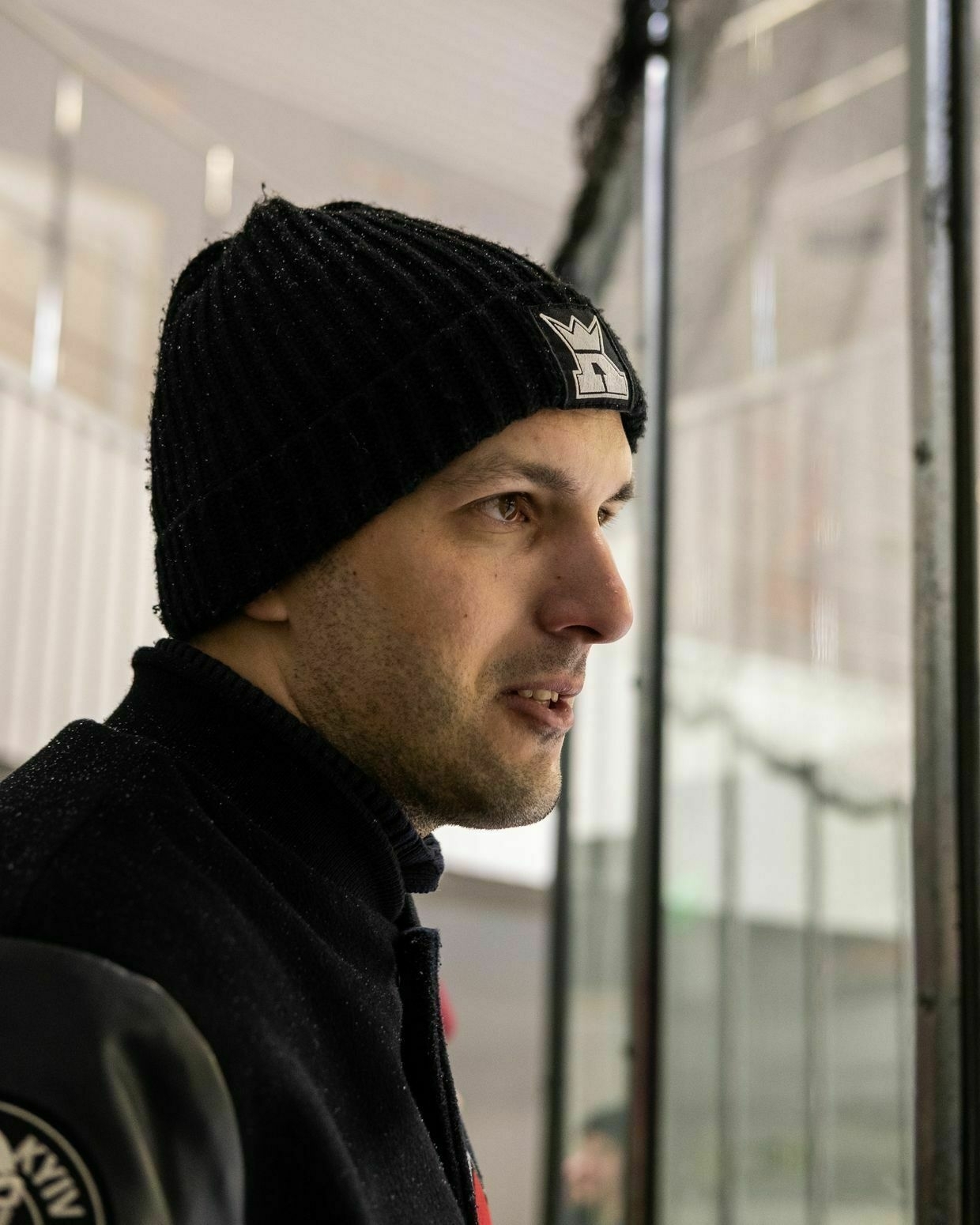
Oleg Grushetsky, Kyiv Capitals sports director, watches his team practice the day before the final game of the Ukranian national championship series. (Chris Jones / The Kyiv Independent) There’s Deniss Berdniks, a Latvian who is tied with Oliynyk for most assists this regular season. When the full-scale invasion began on Feb. 24, 2022, he was playing for HC Kramatorsk and experienced attacks on the city. He returned to Latvia, but came back to Ukraine to play in the Capitals’ first two seasons.
There’s forward Mykola Dvornyk, who came up through the Kryzhynka hockey school and racked up many points for the Capitals last season before being sidelined by a shoulder injury this season. He survived occupation in Kherson, where Russian troops held the city for 256 days, harassing, torturing, and killing residents.
There’s Danylo Tyshchenko, a tall, athletic forward who also trained within the Donbas system in Donetsk and debuted with a strong performance for the Capitals last season. He, too, lived under occupation in Kherson.
There’s Denys Plesovskykh, one of the youngest on the team at 18, still building weight and strength to compete with the older players but already scoring three goals in the regular season.
Oleksandr Valkun, born a month earlier than Plesovskykh, is also building his strength but boasting goals as well and showing a clear hockey instinct.
Both teens have fathers who served in the war.
“Everyone has his own story,” Grushetsky says. “And then there’s the guys in all the other clubs, too.”
‘Hockey is medicine’While searching for a team identity, the goal was to be “down to earth and approachable,” CEO Zimina says.
In lieu of tickets to their home games, the Kyiv Capitals request a Hr 100 donation to the military, the equivalent of $2.46.
Maksim Makarov, a 15-year-old who plays for the Kyiv Capitals’ junior youth team, waits outside the rink after games in the low light, snagging photos with some of the players as they carry their equipment out of the rink.
“I’ve been a fan since the Kyiv Capitals were founded. I don’t miss a game here,” he says. “I can’t even think of my life without hockey.”
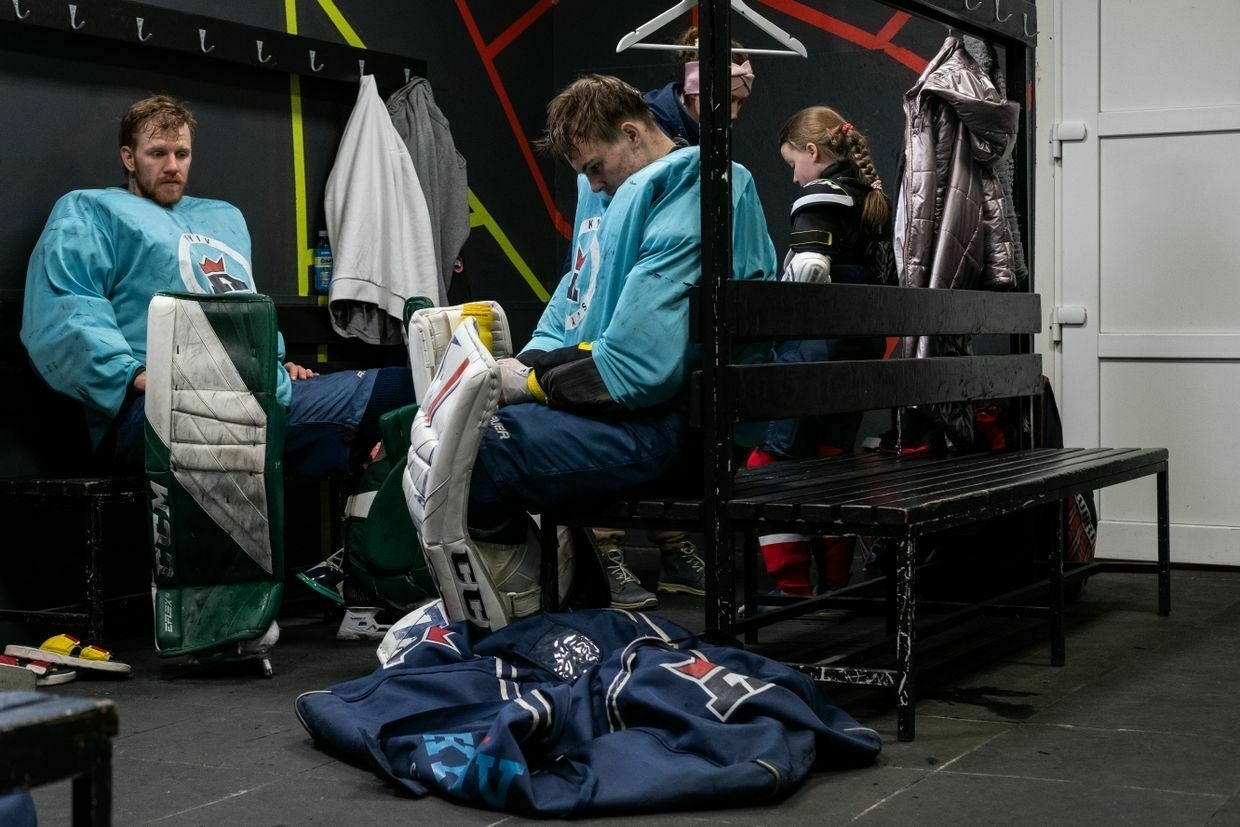
Kyiv Capitals goalies Radek Haas (L) and Nazar Boiko (R) rest in the locker room after practice as a youth hockey program member gets ready with her mother at Shalett ice rink. (Chris Jones / The Kyiv Independent) Like the team, Makarov first began playing hockey after the invasion began, improving from season to season.
“Hockey, for me, is medicine. To not think about my problems. Escape real life. Be happy on the ice. Enjoy every moment,” Makarov says, as the low tone of yet another air raid alert began to wail in the distance.
'War eats emotions'As the Kyiv Capitals take the ice for the final game of the championship series on April 11, the home arena crowd has been standing room only for a full hour before the first puck drop.
With less than a minute and a half left in the game, the Capitals are up 1-0 but the penalties are racking up. With one player already in the penalty box, another penalty sets Kyiv down two players on the ice. Kremenchuk pulls their goalie to bring out another skater — it’s three on six. Nazar Boiko, a 19-year-old goalie who has blocked a dazzling number of shots for nearly an hour of ice time, sends the crowd into a roar chanting his name with each miraculous save.
Then, with 26 seconds left in the game, Kremenchuk dribbles the puck into the net. The score is tied, sending the national championship into sudden-death overtime.
“We've been through so much this season.”
Any professional sports team in the world would feel proud of making it into overtime in game seven of the championship series in their second season as a team. But when Kremenchuk scores after three and a half minutes of overtime, the Capitals players look exhausted.
As HC Kremenchuk players celebrate on the ice, the packed rink begins to chant, “Ca-pi-tals, Ca-pi-tals,” as fans waved their team scarves and bang their fists on the glass to show their support for the team.
“We have been through so much this season,” an emotional Grushetsky says after the game.
As fans stream out of the arena, kids and adults in Capitals gear wait outside the locker room for players to pose for photos and sign hand-made posters. CEO Zimina greets two Ukrainian soldiers on their way out, both leaving with smiles. Another soldier on crutches limps out of the rink grinning.
Before their heart wrenching overtime loss, team captain Chernenko explained what drives him and the rest of Ukraine’s professional hockey players. “We play for the fans. I see the reaction of my family, my friends, acquaintances, all these hockey communities, the feelings they get watching our matches,” Chernenko told the Kyiv Independent.
“War oppresses and eats emotions. People’s lives have changed a lot, but when they have the opportunity to get out, watch hockey, and feel these emotions, it deeply affects them.”
Note from the author:
Hi, I’m Andrea Januta, the author of this piece. Thank you for reading. As a writer living in Kyiv, I’m always trying to share stories not only about the country’s challenges, but also about the fabric of Ukrainian society that so many are fighting to preserve — from sports and religion, to bird watchers and businesses. It’s meaningful but difficult work. If you’d like to support the Kyiv Independent’s ability to tell these stories from Ukraine, please consider supporting our work by becoming a member.
Hockey celebrates Ovechkin, but Putin is the real winnerAlexander Ovechkin has become the greatest goal scorer in National Hockey League (NHL) history — an extraordinary accomplishment that cements his legacy as one of hockey’s most influential figures. For fans around the world, the Washington Capitals’ No. 8 stands as a symbol of perseverance, dedicati…The Kyiv IndependentAdam Sybera
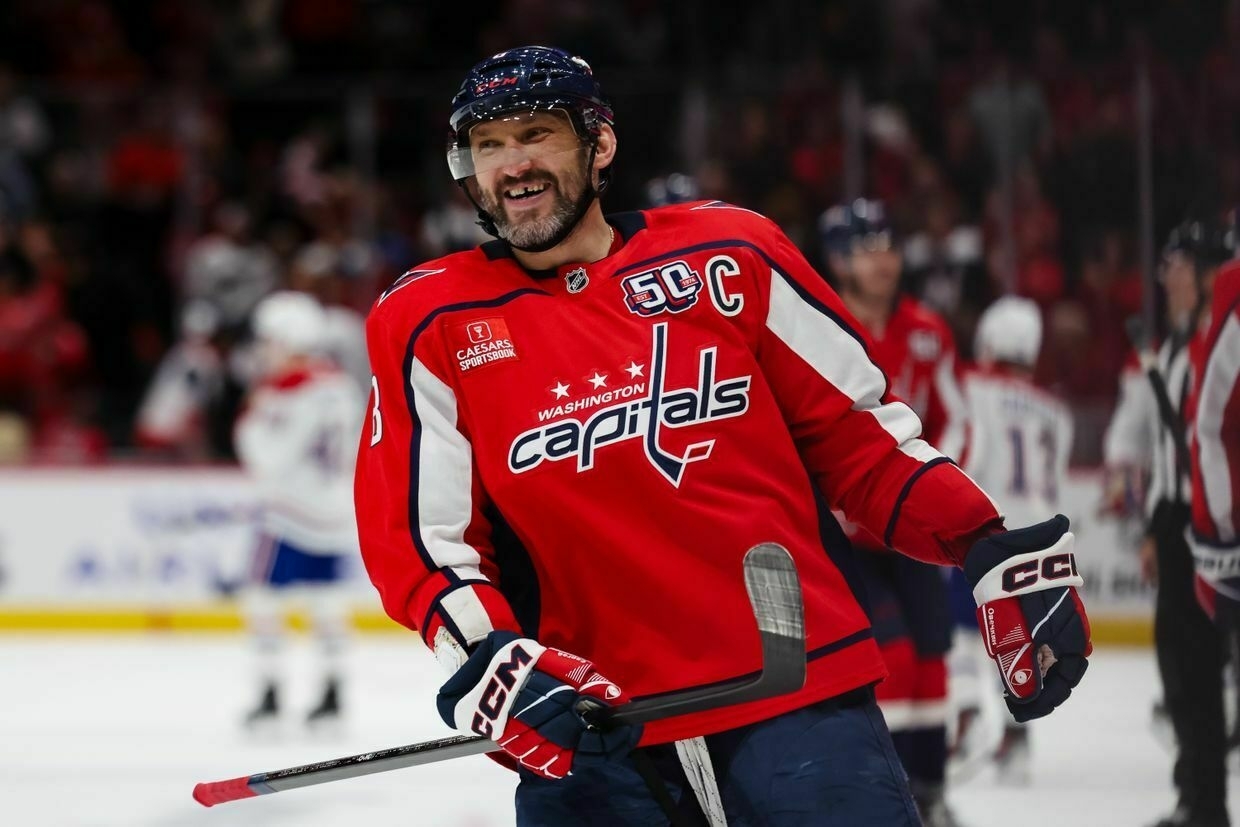
-
The 280,000 Ukrainians at risk of U.S. deportation
Editor’s Note:
We turn two years old on April 25th! We’re making it a goal to have 100 new subscribers by that mark. Will you help us reach our milestone?
We cover Ukraine not just as a battlefield but as a country with deep culture, history, and traditions. We need your help to provide the body armor, first aid kits, gas and food to continue reporting.Ganka Smirnova fled the war to the United States in search of safety.
But now the country that was her place of refuge may soon tell her to leave.
The Trump administration is considering an order that could send her back to Ukraine — and a return to nightly explosions, routine airstrikes, and shattered homes.
"I have a place to return to, but many people don't," Ganka said. “And that's the worst thing.”
Donald Trump said last month that he is weighing revoking the legal status of approximately a quarter million Ukrainians who fled the conflict with Russia. Reuters, citing four sources, the decision could come as soon as this month.
Just over a week ago, some Ukrainian citizens residing in the United States under a humanitarian program received letters from DHS informing them that their status had been revoked and that they had seven days to leave the country. The next day, a DHS spokesperson acknowledged that the notices had been sent in error and that the program remained active.
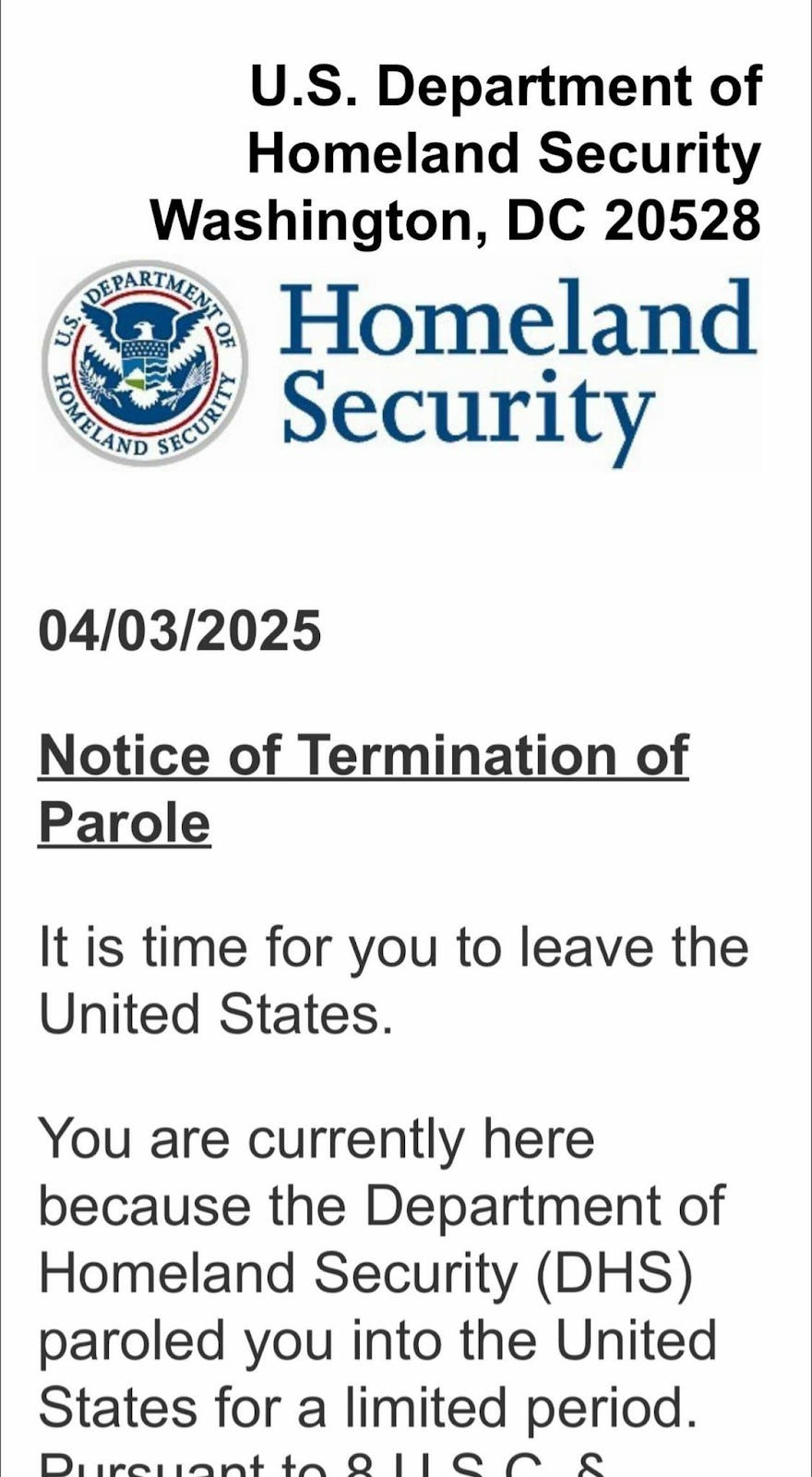
A letter stating that a person must leave the United States. Photo by Facebook/IA Newcomer Integration Community & Exchange The refugees arrived under the Uniting for Ukraine (U4U) program launched by the Biden administration, which allows Americans to sponsor a Ukrainian, provided they guarantee the refugee’s financial well-being. Most have found jobs, sent money to their families in Ukraine, and are building new lives.
Deportations would result not only in personal tragedies, but also broader consequences: for the American economy, which has received an influx of labor; for the relationship between Washington and Kyiv; and even for the future of the war, as the income earned by Ukrainian refugees is an essential resource for their families back home.
Worst of all is the uncertainty. Like small businesses unsure if tariffs are on or off, Ukrainians can hardly plan anything while a Trump-shaped guillotine towers over their American future.
As of January 2024, the United States had accepted the largest number of Ukrainian refugees among countries outside of Europe. About 280,000 Ukrainians have moved to the United States on the U4U program, according to the Ukraine Immigration Task Force, an NGO that helps Ukrainians resettle in the U.S.
The threats have unsettled many Ukrainian refugees in America. One of them is Ganka, who left Ukraine in the first year of the war.
On February 27, 2022, the first Russian military vehicles were spotted in the village of Makariv, where she was staying. The troops were trying to break through to Kyiv, which lay to the east. On March 2, the Ukrainians liberated the village and gained a foothold in it. However, Makariv was still under constant shelling.
"For two weeks we were in this [occupation] without electricity, without water, without food, where we had to survive, where there was bombing... and you just don't know what you're going to do tomorrow, whether you're going to wake up or not," Ganka recalled.
Despite the constant attacks, Ganka had delayed moving, because she did not want to leave Ukraine and her family at such a difficult time. In November 2022, Ganka came to New York on the Uniting for Ukraine program. A friend from Washington, D.C., helped Ganka get in.
Americans were kind to Ganka when she arrived — everyone she met was very friendly. But the effects of living under occupation had taken their toll, and she struggled with her first days in the United States.
"New York is a very loud city, with many people. And that affected me. It triggered me [because of the noise she recalls from occupation]. It was terrible," Ganka told The Counteroffensive. "At first, I lost touch with reality here, because there is a war going on in Ukraine. People here seem to be living their quiet, peaceful, ordinary lives... I felt that it was all a kind of simulation, a game. And it was not real.”
More than once, Ganka considered buying a ticket back to Ukraine because her heart pulled her home. But she realized she could be helpful in America too. She began attending protests demanding more aid for Ukraine, raising money for the armed forces, and supporting other Ukrainians in the United States.
Rally in support of Ukraine, New York, 2022. Video provided by Ganka
The U4U program provided Ganka with a work permit, enabling her to secure a job as a model at an agency. There are no restrictions on specialties, allowing Ukrainians to work in any field. The program also provides monthly financial assistance, which includes a little over $200 for food and $90 in cash. “It's not a lot of money for New York, but it helps to pay for the phone, for example,” Ganka said.
At the end of January, Donald Trump signed the ‘Securing Our Borders’ executive order, instructing the Department of Homeland Security to halt all migrant programs established under the Biden administration.
He then indefinitely suspended the acceptance of new applications for U4U.
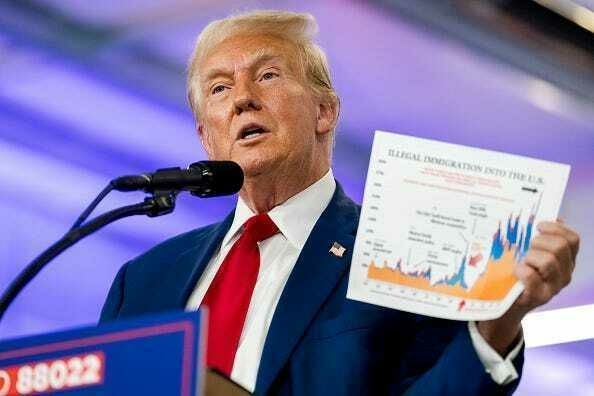
Republican presidential candidate, former U.S. President Donald Trump speaks while holding a document about immigration during a visit to the Livingston County Sheriff's Office on August 20, 2024 in Howell, Michigan. (Photo by Nic Antaya/Getty Images) In addition, 530,000 Cubans, Haitians, Nicaraguans, and Venezuelans – as well as 70,000 Afghans fleeing the Taliban – have been threatened with deportation.
Trump himself has been unclear regarding where he stands on revoking the status of Ukrainian refugees.
"We're not looking to hurt anybody,” he told reporters in the Oval Office. "There were some people that think that's appropriate, and some people don't, and I'll be making the decision pretty soon."
If Trump signs an executive order, deportations would not begin immediately, due to martial law still being in effect in Ukraine, and it's possible that they could be offered alternatives on how to stay legally, said Yelyzaveta Mazur, an immigration lawyer at the Ukrainian law firm Prikhodko & Partners.
However, absent alternatives they will either have to leave or wait for an evacuation organized by the Ukrainian authorities. Individuals who do not leave the United States or apply for a new status might face fines or administrative penalties, depending on state laws, according to Mazur.
Ganka, who may be deported from New York, said that when she heard about the possible decision, she felt angry and upset: how can this happen when there is still a war in Ukraine?
"Where's the logic: he [Trump] wants to send Ukrainians home, and then he says he doesn't want to hurt them. And this ambivalence, it's a little bit confusing. It's a kind of chaos," Ganka said.
The return of deported Ukrainians could create several issues, particularly for those who have lost their homes or who come from occupied territories, Mazur said. Do they possess valid Ukrainian documents? Are they included in government registries, given that many left with non-biometric passports?
Another issue is housing. Will those whose homes were destroyed be able to get it? In Ukraine, the process of finding housing has been complicated, and those returning from the United States may also face scrutiny regarding the legality of their departure, particularly for men.
“The question is for those who left for help, to escape the war. Most of them are not from Kyiv or western Ukraine. If they are deported from the United States, they will need to apply for benefits, assistance from the state, and compensation for housing,” Mazur said.
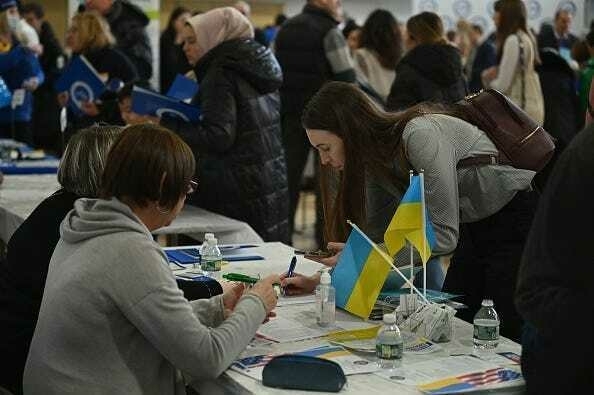
Ukrainian refugees attend a job fair in the Brooklyn borough of New York on February 01, 2023. (Photo by ANGELA WEISS/AFP via Getty Images) Deporting a quarter of a million people could affect America's international reputation, which is already changing, Ganka said.
Even if such a decision is made, she is not afraid. Ironically, like those who would like to deport her, Ganka’s dream is that she can one day return to Ukraine.
"We are all living in a war, even if we are far away from it. It is impossible to forget it," she said. "I would like to return to a peaceful Ukraine with all our territories and people. I want many other Ukrainians to do the same and help rebuild Ukraine."
In this time of great uncertainty — and unstable American support — it means that the situation on the ground is very dangerous. Your contributions help us get the body armor, medical gear, and supplies we need to stay safe.
Show your support by contributing to our tip jar - funds go towards keeping us safe and ensuring our work continues.
NEWS OF THE DAY:
Good morning to readers; Kyiv remains in Ukrainian hands.
TRUMP ENVOY: PARTITION UKRAINE LIKE POST-WWII BERLIN: Gen. Keith Kellogg, Trump's envoy to Ukraine, said that British/French troops could be stationed west of the Dnipro River as a "reassurance force," while Ukrainian forces were based east and north of the river.
The forces would act together as a deterrent to future Russian violations of the ceasefire, Kellogg envisioned, according to The Times. “You could almost make it look like what happened with Berlin after World War Two, when you had a Russian zone, a French zone, and a British zone, a US zone,” he said.
UKRAINE: TWITTER CONCEALING RUSSIAN WAR CRIMES: A spokesperson for the Ukrainian Ministry of Foreign Affairs criticized Twitter for applying the tag “sensitive content” to a post about Ukrainian children killed by Russia — arguing that it was tantamount to concealing war crimes.
"This isn’t preventing users from exposure to graphic content. This is sweeping Russian war crimes under the rug," said MOFA spokesman Heorhii Tykhyi. “This is shameful and must be reversed.”
TRUMP'S NEGOTIATOR WITKOFF MEETS PUTIN: Steve Witkoff flew to St. Petersburg for talks with Putin, and was photographed shaking hands with the dictator. No results from the meeting have been shared publicly, per Sky News.
… WHILE TRUMP URGES PUTIN: Meanwhile, Trump urged Putin to get serious about peace. "Russia has to get moving. Too many people ere [sic] DYING, thousands in a week, in a terrible and senseless war," wrote Trump on a Truth Social post. A top White House spokesperson said that Trump was getting frustrated with both the Ukrainians and the Russians.
"I think the president has been quite clear that he's been continually frustrated with both sides of this conflict and he wants to see this fighting end; he wants the war to end, and we believe we have leverage in negotiating a deal,” Karoline Leavitt said.
DOG OF WAR:
Today’s Dog of War is a husky with such beautiful eyes. She was waiting for her owners at the entrance to a store, and Nastia couldn't help but take her photo.
Stay safe out there.Best,
TimThe Counteroffensive is a reader-supported publication. To receive new posts and support our work, consider becoming a free or paid subscriber.
-
RFE/RL Ukraine editorial office cutting broadcasts, places employees on leave amid 'financial challenges'
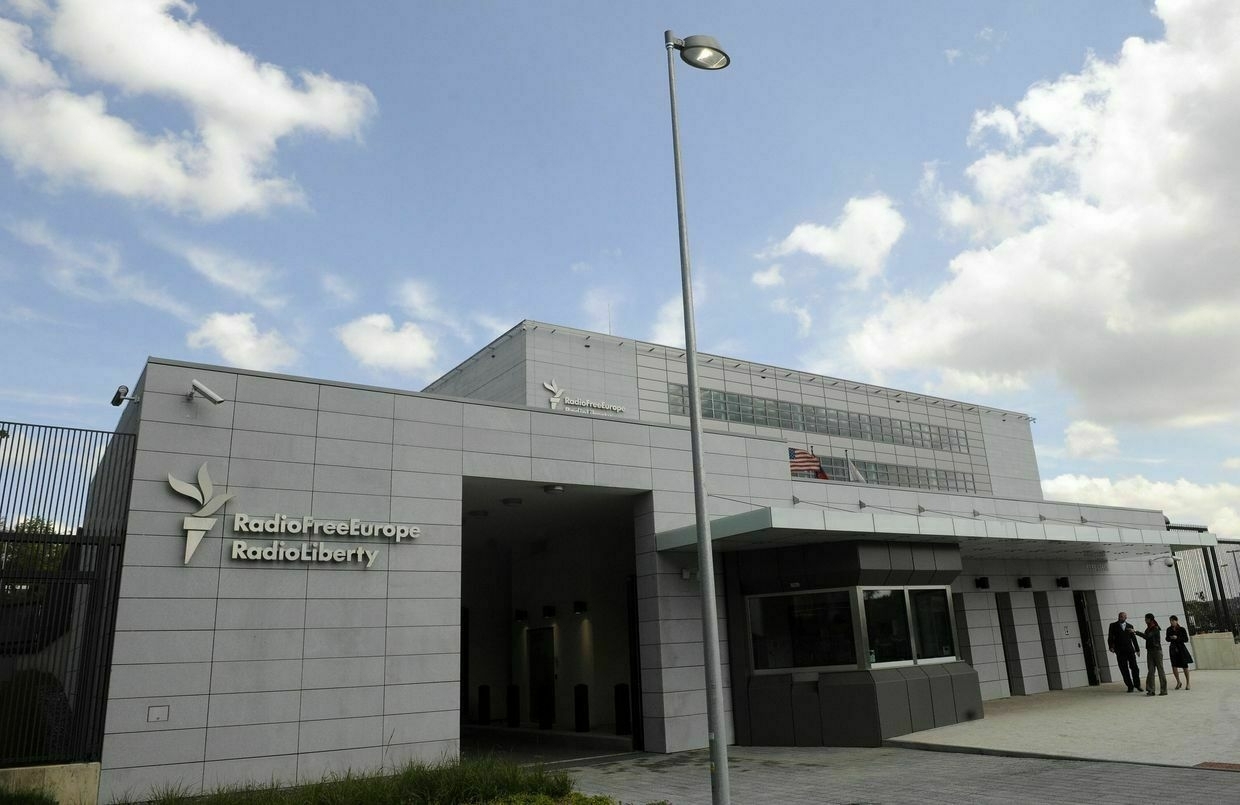
The editorial office of Radio Free Europe/Radio Liberty Ukraine announced on April 11 that it was reducing its broadcasts and placing a number of it employees on leave as the U.S. government-funded media organization continues to endure “financial challenges” amid the Trump administration’s efforts to eliminate grant funding.
RFE/RL Ukraine announced that it had ended its popular Freedom.Morning daily broadcast as a means to save costs, while also sending an unspecified number of employees in its Kyiv and Lviv offices on leave.
“This is a forced step at a time when Radio Liberty is fighting for the right to receive funding from the U.S. Congress in American courts,” Mariana Drach, director of the Ukrainian editorial office said. “Ahead of this, some employees in Prague from various language services went on partially paid leave from April 1."
U.S. President Donald Trump ordered the U.S. Agency for Global Media (USAGM), the government agency overseeing RFE/RL, to be dismantled, while cutting grant funding to the organization.
Following a court challenge, a U.S. District Court granted RFE/RL a temporary restraining order, blocking what the court deemed an unlawful attempt by USAGM to cut congressionally appropriated funds.
USAGM reversed its decision to terminate grant funding for Radio Free Europe/Radio Liberty (RFE/RL) for the fiscal year 2025, RFE/RL reported on March 27. Despite the reversal, financial challenges continue to persist as future funding for the media organization remains in limbo.
RFE/RL was founded early in the Cold War to counter Soviet propaganda in Eastern Bloc countries. It has since continued providing coverage of Ukraine, Russia, Belarus, and countries in Central Asia, the Balkans, the Caucasus, and elsewhere.
‘Everyone is really shocked and upset’ — Trump administration puts Voice of America journalists on leave, cuts funding to Radio Free EuropeThe Trump administration on March 15 followed up a on an executive order signed a day earlier by President Donald Trump vowing to gut funding for the U.S. Agency for Global Media (USAGM), which oversees Voice of America (VOA) and Radio Free Europe/Radio Liberty (RFE/RL). As aThe Kyiv IndependentDmytro Basmat

-
Trump 'frustrated with both sides' amid ongoing peace talks, White House says
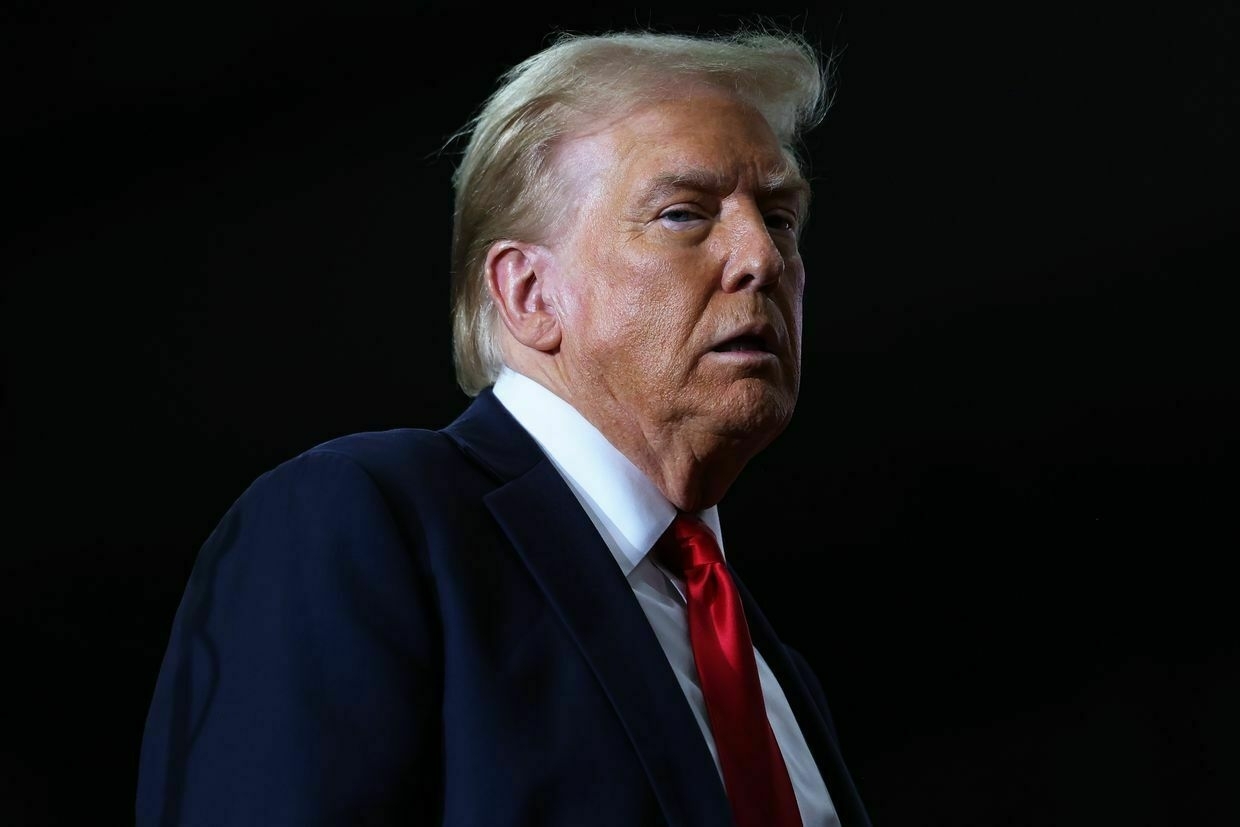
White House Press Secretary Karoline Leavitt told reporters on April 11 that U.S. President Donald Trump has been “continually frustrated” with both Ukraine and Russia as peace talks continue to drag on.
“I think the president has been quite clear that he’s been continually frustrated with both sides of this conflict,” Leavitt said. “(Trump) wants to see this fighting end, he wants the war to end, and we believe we have leverage in negotiating a deal."
The White House’s comments preceded a meeting between his special envoy Steve Witkoff and Russian President Vladimir Putin in St. Petersburg to discuss a potential path toward a settlement in Ukraine.
Despite repeated threats over the pace of negotiations, the Trump administration has not yet imposed any major sanctions on Russia after it failed to agree to a 30-day ceasefire.
Ukraine agreed to a U.S. proposal for a full 30-day ceasefire during talks in Jeddah on March 11, provided Russia abides by the conditions. Moscow has rejected the deal unless it includes conditions undermining Ukraine’s defenses, namely a full halt on foreign military aid.
Instead, Ukraine, Russia, and the U.S. agreed on March 25 to halt attacks on energy infrastructure and fighting in the Black Sea.
However, the Kremlin has blocked the partial ceasefire as well, saying that the Black Sea ceasefire would take effect only after some sanctions against Russia are lifted. Russia and Ukraine have also accused each other of violating the ban on energy infrastructure strikes.
Earlier on April 11, Trump said that Russia “has to get moving” to end its war against Ukraine.
“Russia has to get moving. Too many people are dying, thousands a week, in a terrible and senseless war — a war that should have never happened, and wouldn’t have happened, if I were president,” Trump said on Truth Social.
In recent days, the U.S. president has renewed his push for a ceasefire. Axios reported on April 11, citing an undisclosed source, that Trump could impose additional sanctions on Russia if a ceasefire with Ukraine is not reached by the end of April.
Since Kyiv and Washington agreed on a temporary truce, Russia has launched 70 missiles, 2,200 Shahed drones, and 6,000 guided aerial bombs against Ukraine, Foreign Minister Andrii Sybiha said on April 11.
US, Ukraine minerals deal negotiations ‘antagonistic,’ Reuters reportsDescribing the Trump administration’s expansive proposal as “maximalist,” the source told Reuters that it was unlikely a new round of technical talks will lead to a breakthrough in negotiations.The Kyiv IndependentDmytro Basmat
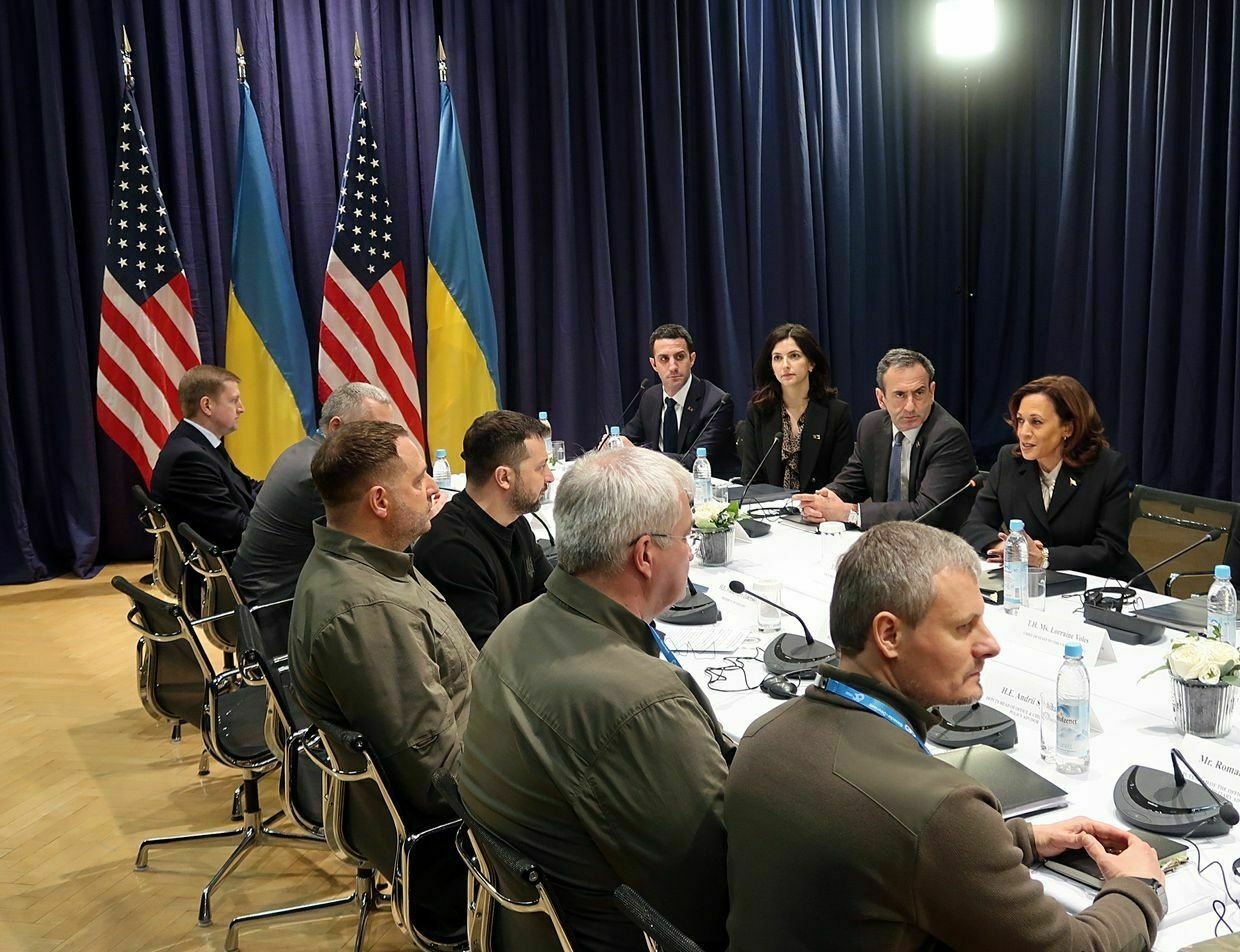
-
Fires, injuries reported after Russian drone attack on Kyiv
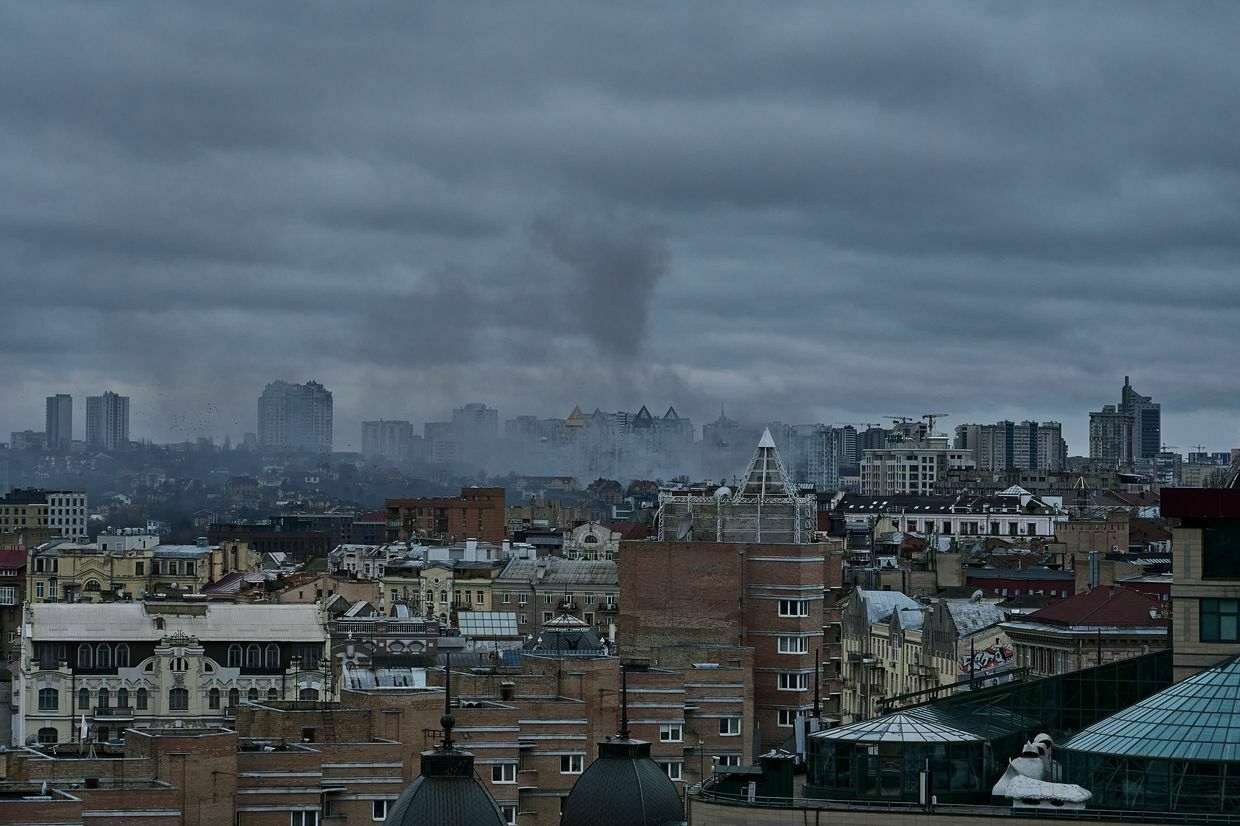
Editor’s note: This is a developing story and is being updated.
Russian forces launched drone attacks on Kyiv overnight on April 12, causing multiple fires and injuring at least two people, Mayor Vitali Klitschko said.
In the Darnytskyi district of the city, a fire erupted at a home after drone debris fell on the property. While in the Svyatoshyn district, two people were injured as a result of the attack.
Emergency crews are currently on-scene, Klitschko said. No information was immediately available on the status of the injured victims.
Russia has regularly targeted civilian infrastructure since the onset of its full-scale war against Ukraine in February 2022, particularly in the country’s capital, Kyiv.
The U.S. has been in talks with Ukraine and Russia to negotiate an end to Russia’s war against Ukraine.
Ukraine has already agreed to a U.S.-proposed full 30-day ceasefire, saying on March 11 that Kyiv is ready if Russia also agrees to the terms. So far, Moscow has refused.
Ukraine war latest: US envoy Witkoff proposes giving Russia ‘ownership’ of Ukrainian regions, Reuters reportsKey developments on April 11: * US envoy Witkoff proposes giving Russia ‘ownership’ of Ukrainian regions, Reuters reports * Trump urges Russia “to get moving” to end war against Ukraine * Putin meets U.S. envoy Witkoff to discuss Ukraine, Kremlin says * “Several hundred” Chinese nationals fight…The Kyiv IndependentThe Kyiv Independent news desk
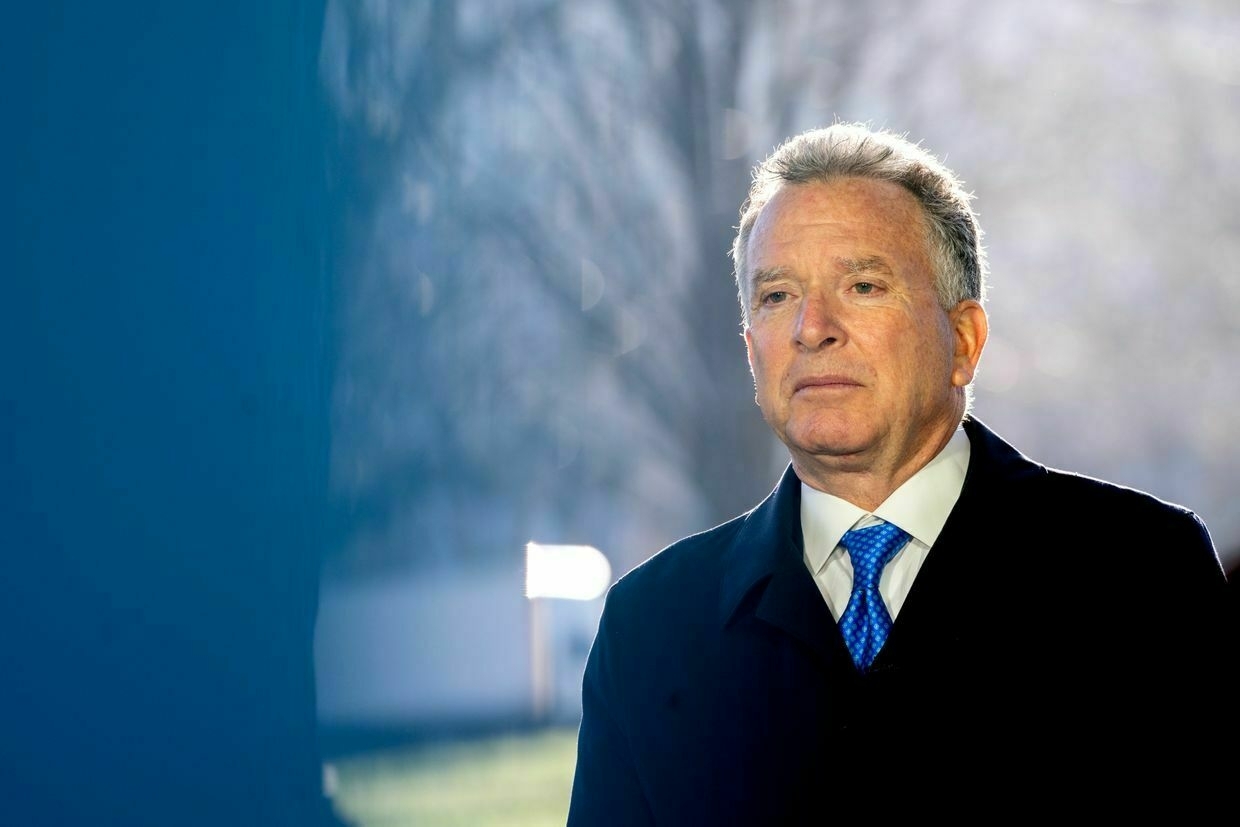
-
US, Ukraine minerals deal negotiations 'antagonistic,' Reuters reports
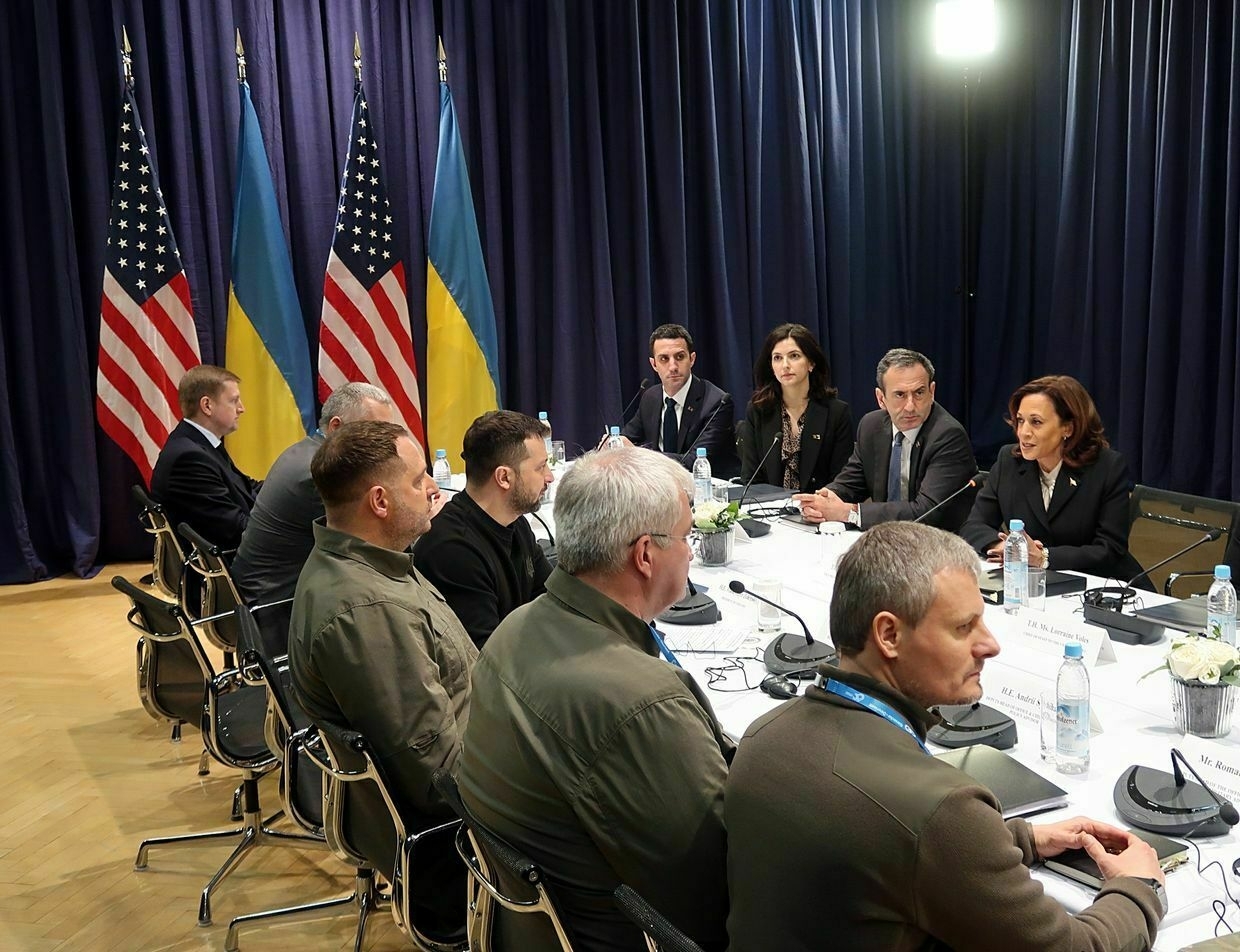
Ongoing talks between Kyiv and Washington on securing a critical minerals deal continue to be tense, with a source familiar with the discussion describing the negotiating atmosphere as “very antagonistic,” Reuters reported on April 11.
According to a source who spoke to Reuters, tensions surrounding negotiations stem from the Trump administration’s proposal for extensive control over Ukraine’s natural resources through a joint investment fund — which are larger than initially proposed.
Describing the more expansive proposal as “maximalist,” the source added that it was unlikely a new round of technical talks will lead to a breakthrough in negotiations.
The long-running negotiation, which has already strained ties between Kyiv and Washington, follows an attempt to finalize a framework agreement earlier this year.
Those plans were disrupted after a heated Oval Office meeting between U.S. President Donald Trump, Vice President JD Vance, and President Volodymyr Zelensky. Critics later slammed the leaked draft for potentially undermining Ukraine’s control over its natural resources, including not just rare-earth minerals but also gas and oil.
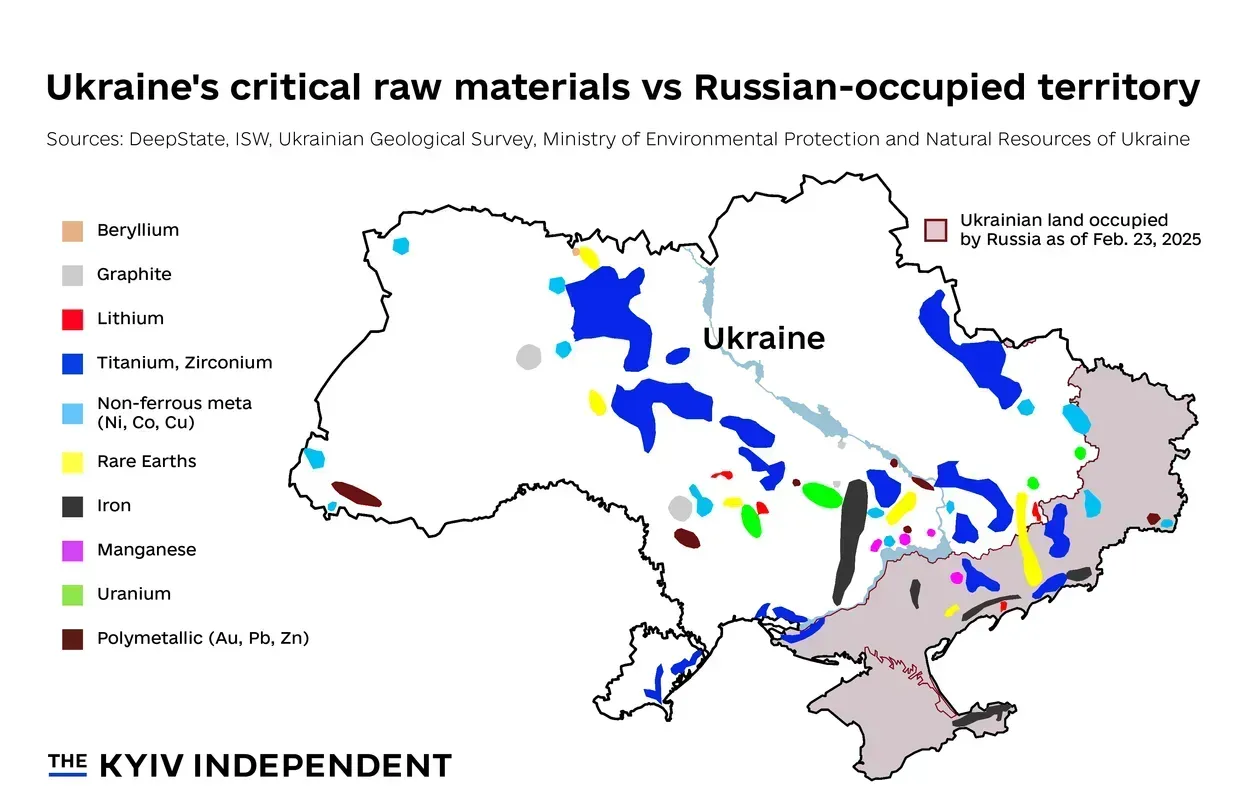
A map showing the location of critical raw materials in Ukraine. (The Kyiv Independent) One of the glaring issues is that the latest draft of the deal conflicts with a critical raw materials partnership signed between Brussels and Kyiv in 2021, potentially harming Ukraine’s ambitions to join the EU in the future.
Ukraine’s Justice Ministry has hired the American-British law firm Hogan Lovells for assistance in negotiating a critical minerals deal with the United States, according to a filing under the U.S. Foreign Agents Registration Act (FARA).
Ukraine’s Foreign Minister Andrii Sybiha has called for the the agreement to be mutually beneficial, and meet the interests of both countries without putting at risk Ukraine’s accession to the EU.
Ukraine’s minerals deal position ready for talks with US, FM saysThe minerals deal should be mutually beneficial, meet the interests of both countries without putting at risk Ukraine’s accession to the EU, Foreign Minister Andrii Sybiha said.The Kyiv IndependentKateryna Denisova
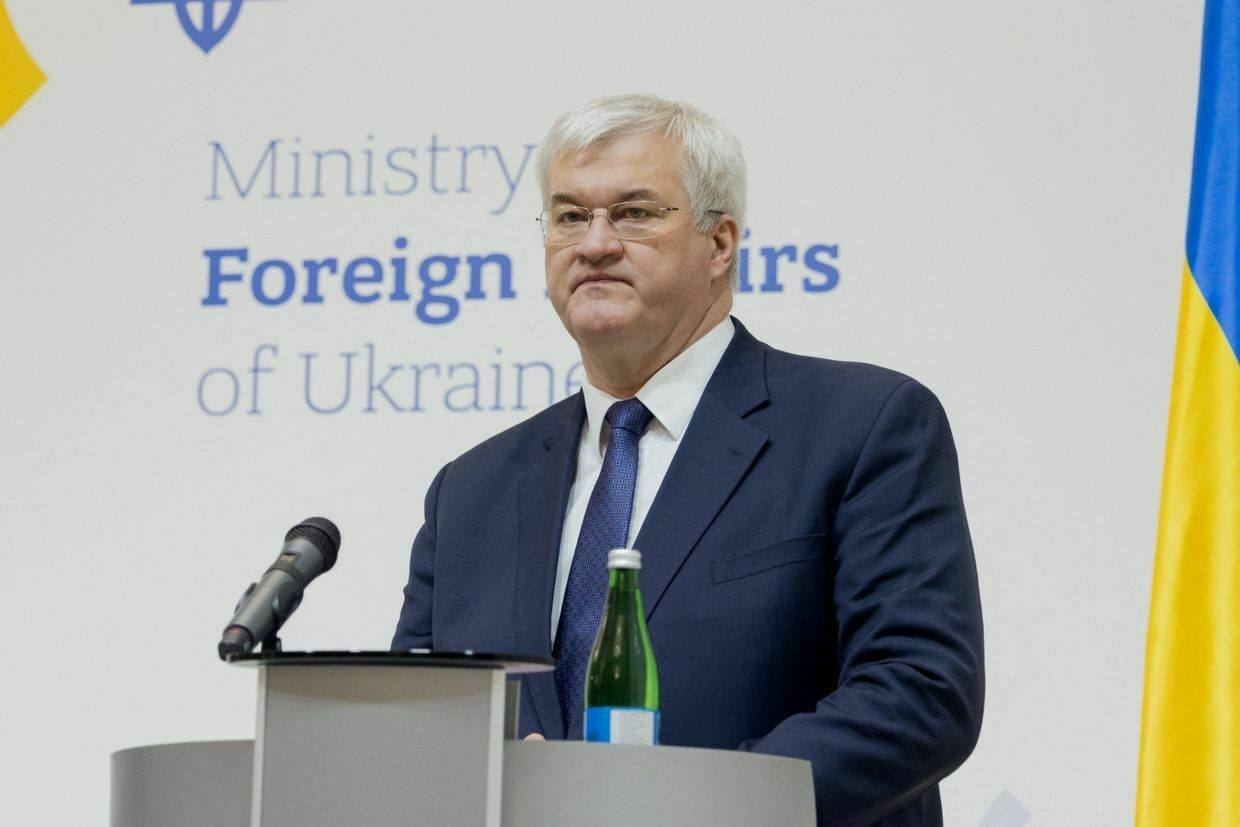
-
Kyiv hires US law firm Hogan Lovells to advise on minerals deal
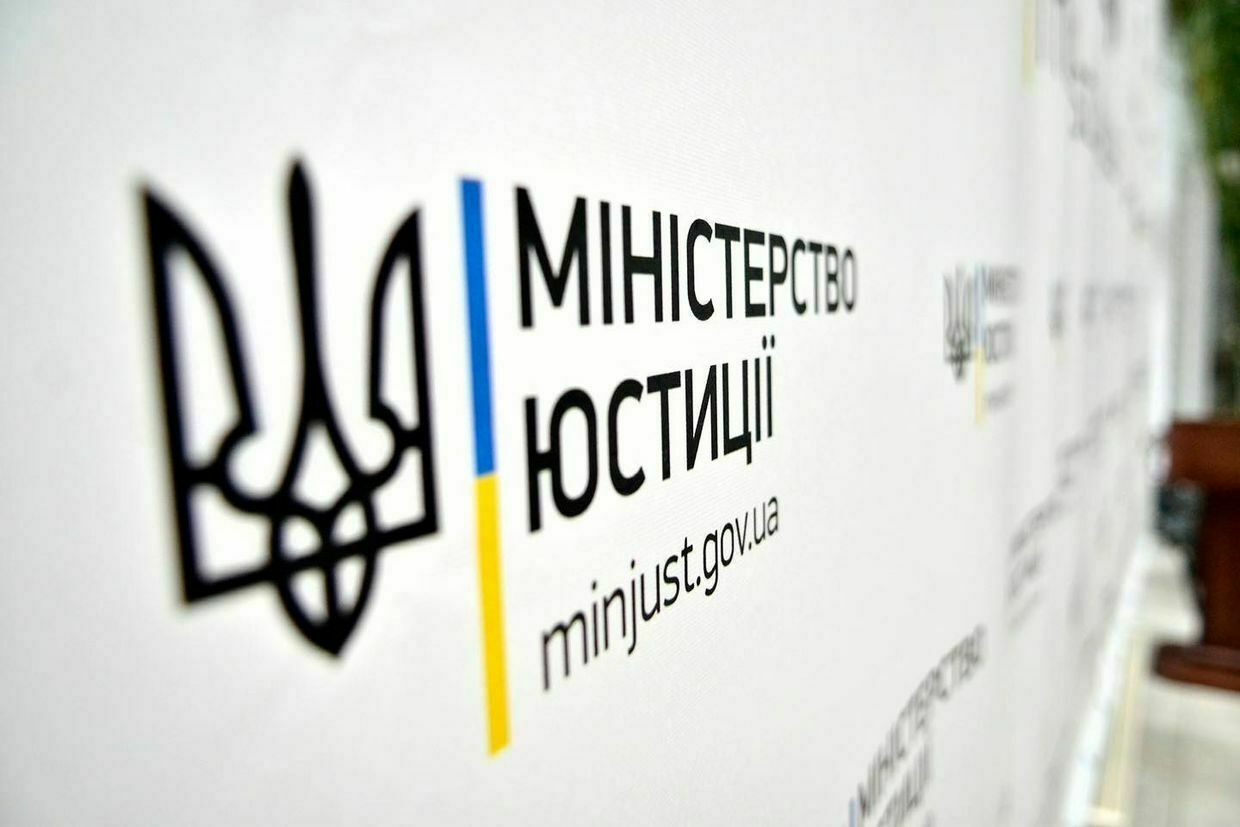
Ukraine’s Justice Ministry has hired the American-British law firm Hogan Lovells for assistance in negotiating a critical minerals deal with the United States, according to a filing under the U.S. Foreign Agents Registration Act (FARA).
The news comes as Ukraine and the U.S. began technical consultations on the minerals agreement on April 11.
The Justice Ministry has retained Hogan Lovells U.S. as of April 9, according to a registration listed on the U.S. Justice Department (DOJ) web portal. A source confirmed to Reuters on April 11 that the Ukrainian government has retained the firm.
Hogan Lovells is an American-British firm with headquarters in Washington, D.C. and London.
Additional details are not provided in the registration listing. The registration does indicate that the Victor Pinchuk Foundation hired the firm in 2023.
The latest version of the minerals deal, an initiative U.S. President Donald Trump championed as a way for Washington to “recoup” military aid to Kyiv, reportedly grants the United States extensive control over Ukraine’s natural resources through a joint investment fund.
A source who spoke to Reuters regarding the April 11 talks described them as “antagonistic” and unlikely to produce a breakthrough.
“The negotiating environment is very antagonistic,” the source said, describing the latest version of the proposal as “maximalist” in its ambitions over Ukraine’s mineral wealth.
Whilte the agreement would grant the U.S. unprecedented control over Ukraine’s natural resources, it still lacks any concrete security guarantees.
In an interview with the Times published April 11, U.S. Special Envoy to Ukraine Keith Kellogg said that resumed negotiations on the minerals deal proved that relations between Washington and Kyiv were “back on track.”
The official also acknowledged that the U.S. underestimated the complexities of such a deal.
“It’s not a simple yes or no,” he said.
“People didn’t really understand the process as well as they should have."
Hockey celebrates Ovechkin, but Putin is the real winnerAlexander Ovechkin has become the greatest goal scorer in National Hockey League (NHL) history — an extraordinary accomplishment that cements his legacy as one of hockey’s most influential figures. For fans around the world, the Washington Capitals’ No. 8 stands as a symbol of perseverance, dedicati…The Kyiv IndependentAdam Sybera
